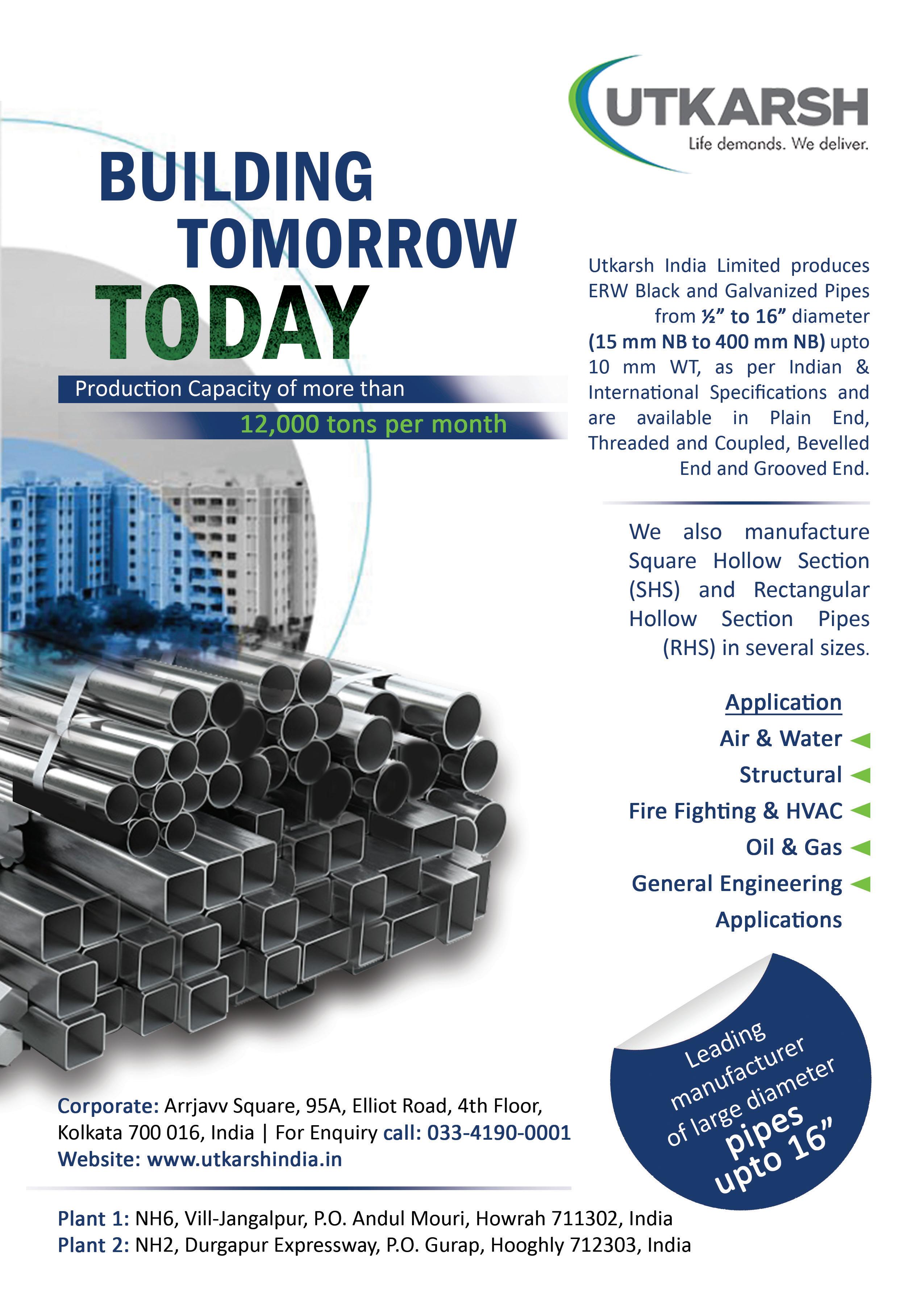
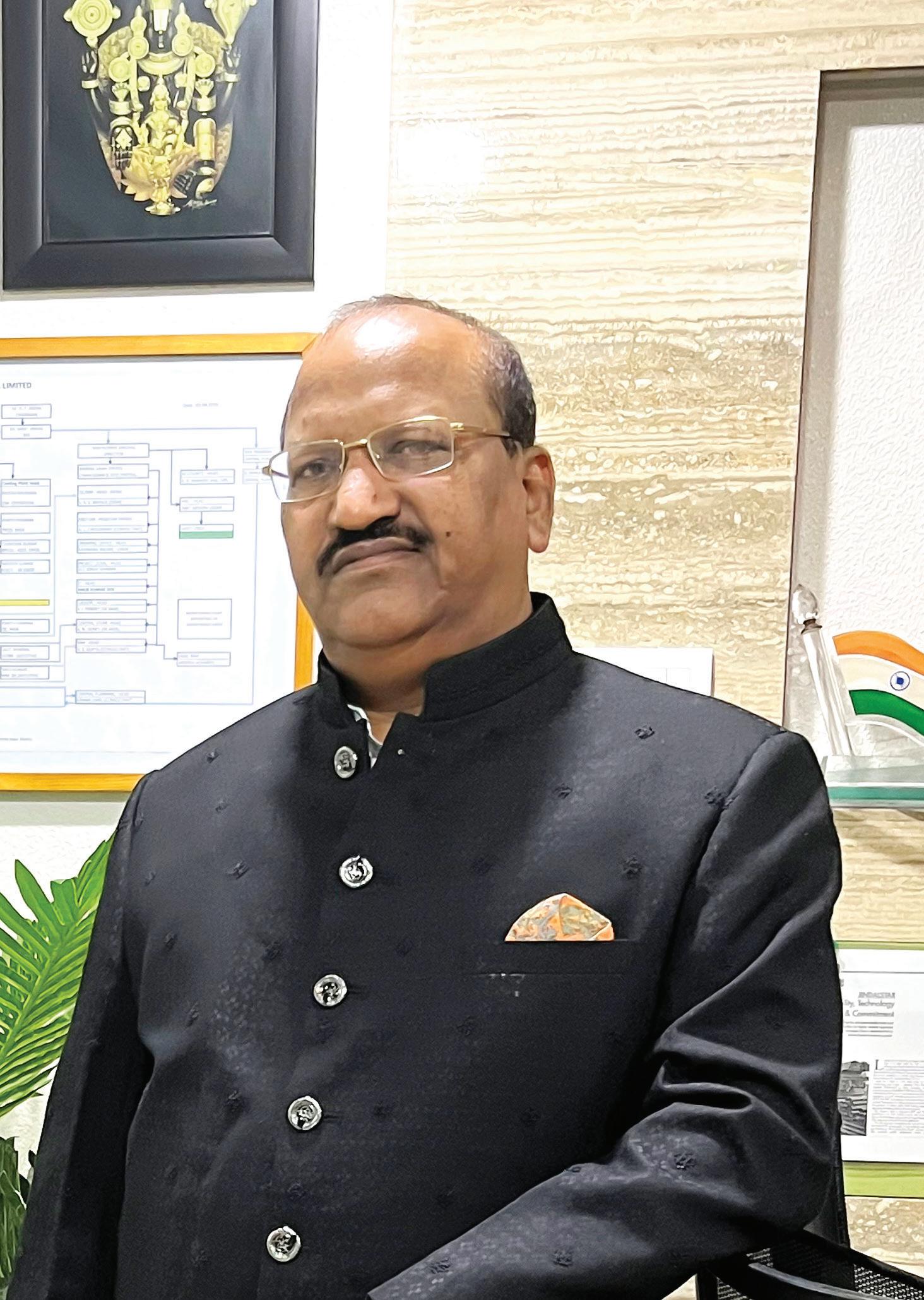
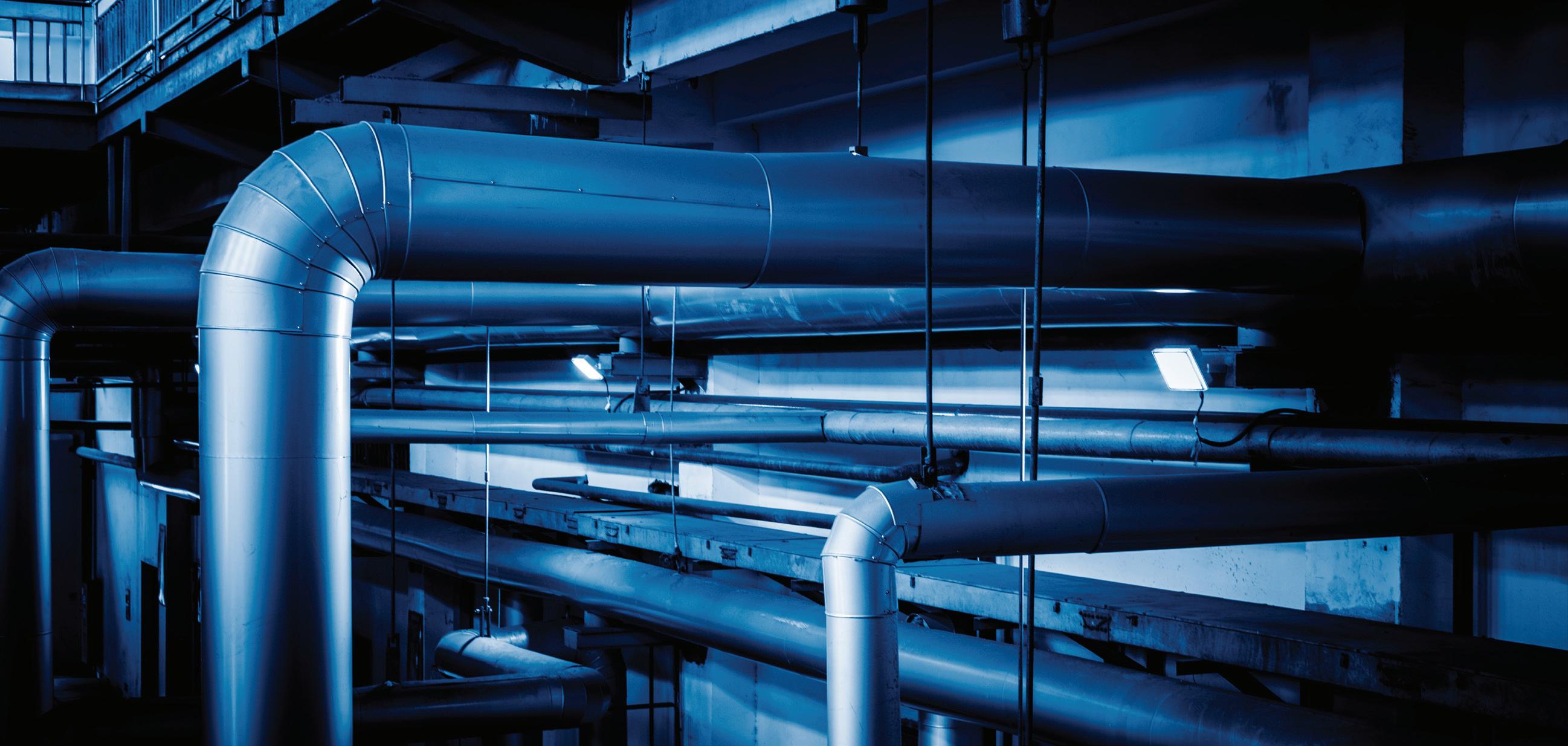

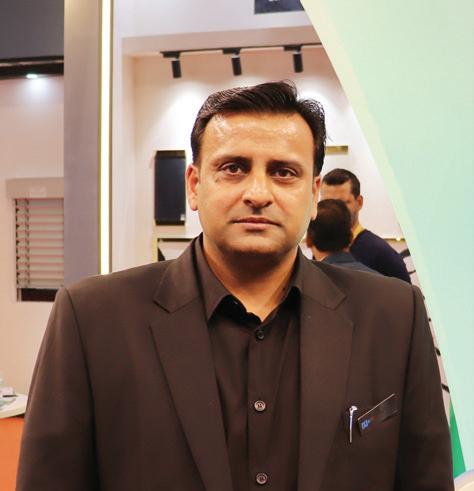
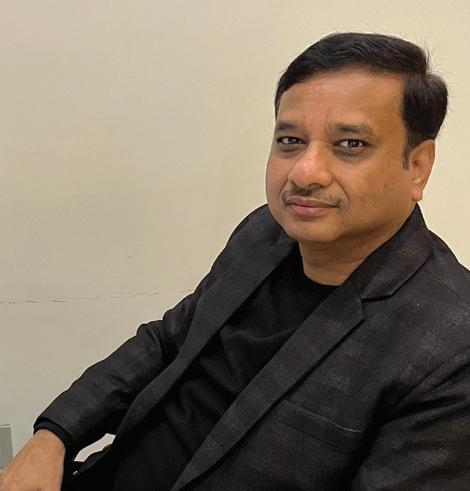
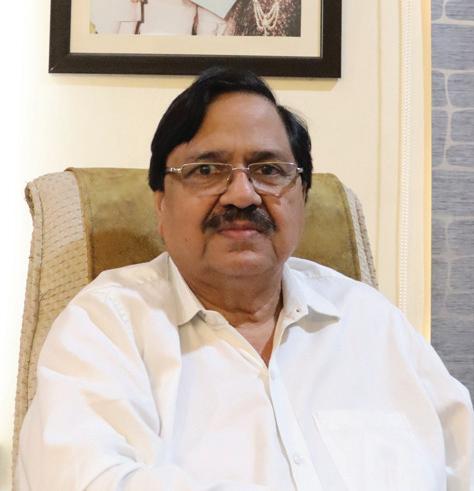

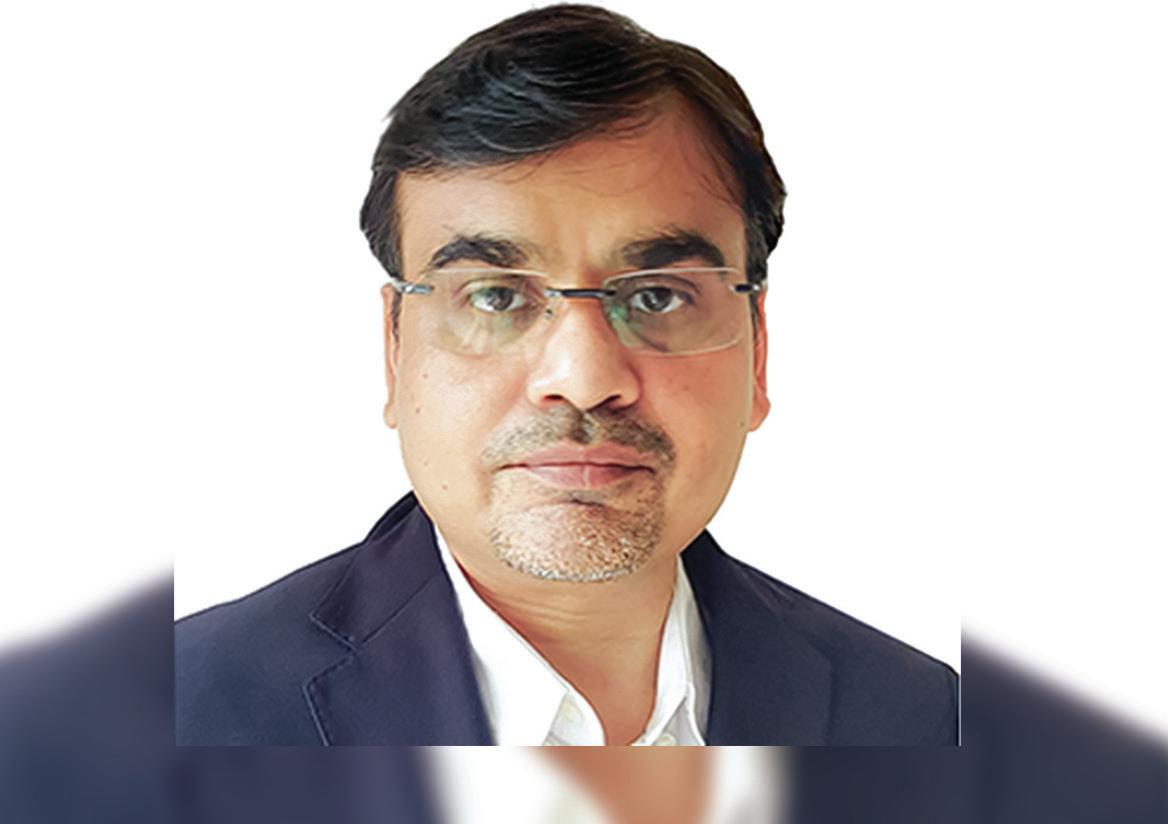
Vol. 01 No. o2 December-January, 2023 Maharashtra Seamless Fulfils its ‘Make in India’ Vision through Subsea Pipelines BLM GROUP: Meeting Customer Needs with Greater MachineSoftware Integration KPT Piping System to Come Up with a New Plant Rukmini Polytubes Launches PVC Electrical Conduit Pipes Nirmal Overseas: Keeping Up with the Latest Technology is the Success Mantra Utkarsh India to Expand Capacity to 2,40,000 MT by FY 2024-25 Wavin Vectus: Redefining the Pipeline Infrastructure

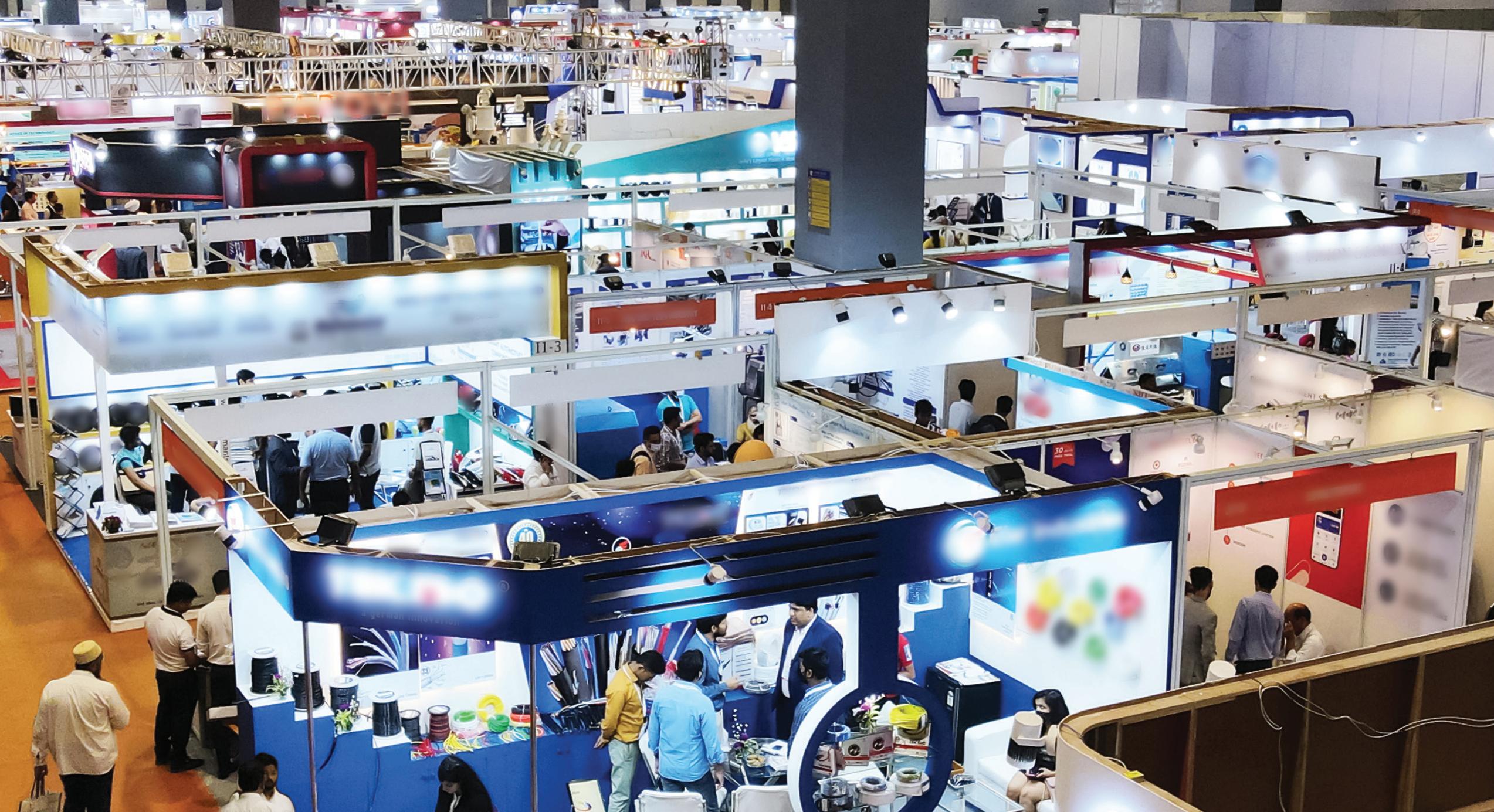
For booking write to info@tulip3pmedia.in or call +91 9910329829 www.tubepipefair.com Co-located with: Media Partner: Organized by: India’s Premier Tube & Pipe Expo FAIR 6th, 7th, 8th October, 2023 Hall No.: 2, 3, & 4 Pragati Maidan, New Delhi. The 1st International Exhibition for Tube & Pipe Industry Meet domestic & international buyers from the Tube & Pipe Industry.
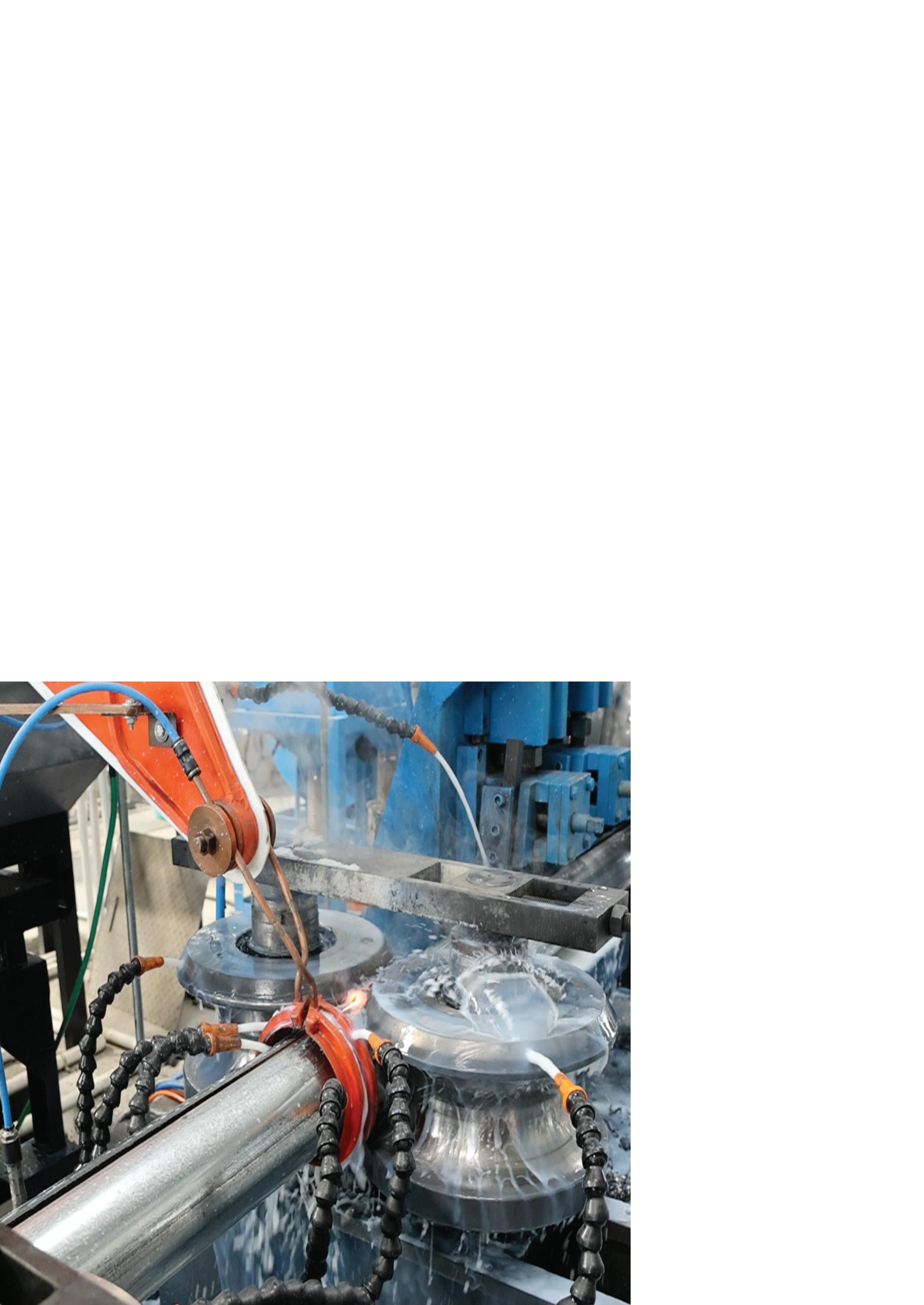


The company has its advent in the year 1992. The foundation of this enterprise was laid with a forethought of providing superior quality, reliability and achieving the highest standards of customer contentment. Backed bytheexperienceandtechnicalknowhowof over three decades by the promoters, 'ROLLCON' offers value in the field of processingofflatsteelproducts.
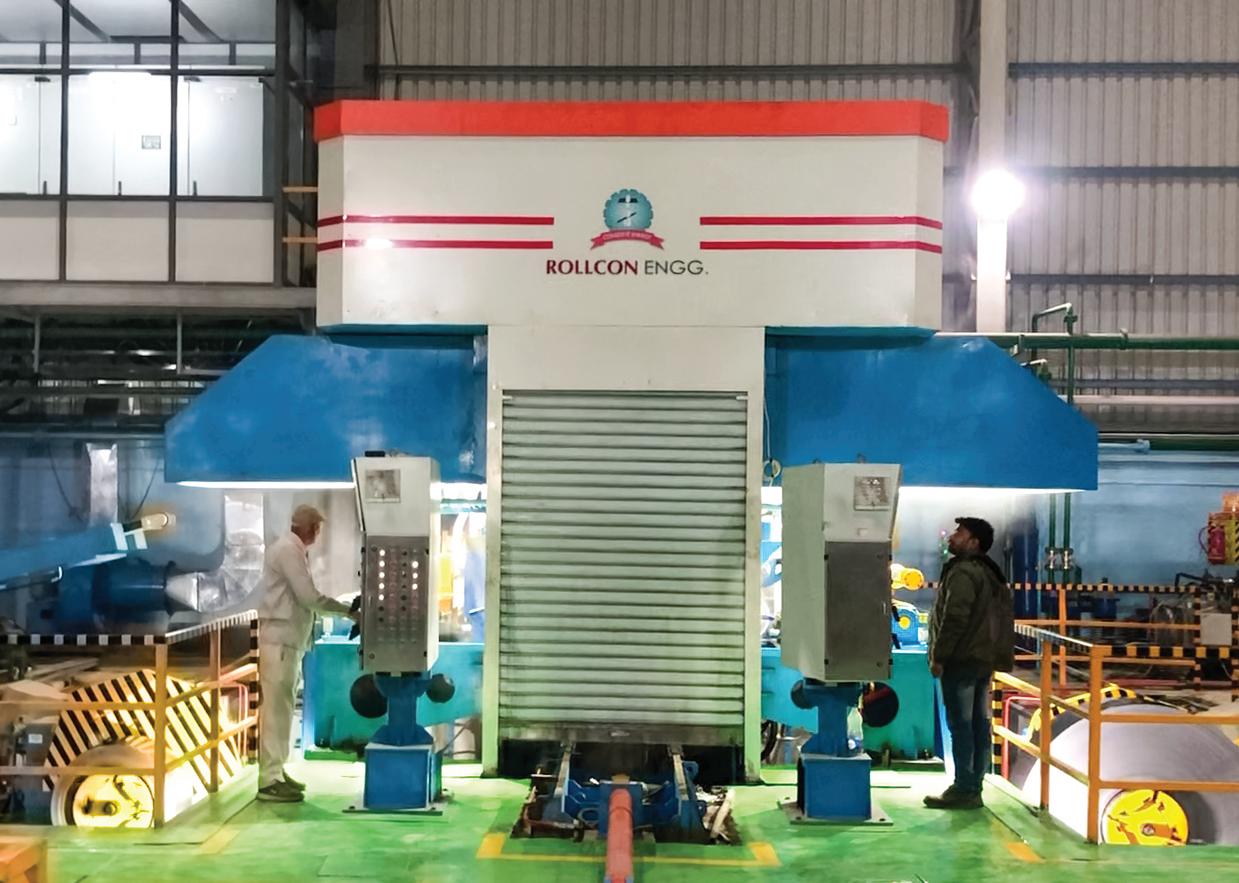
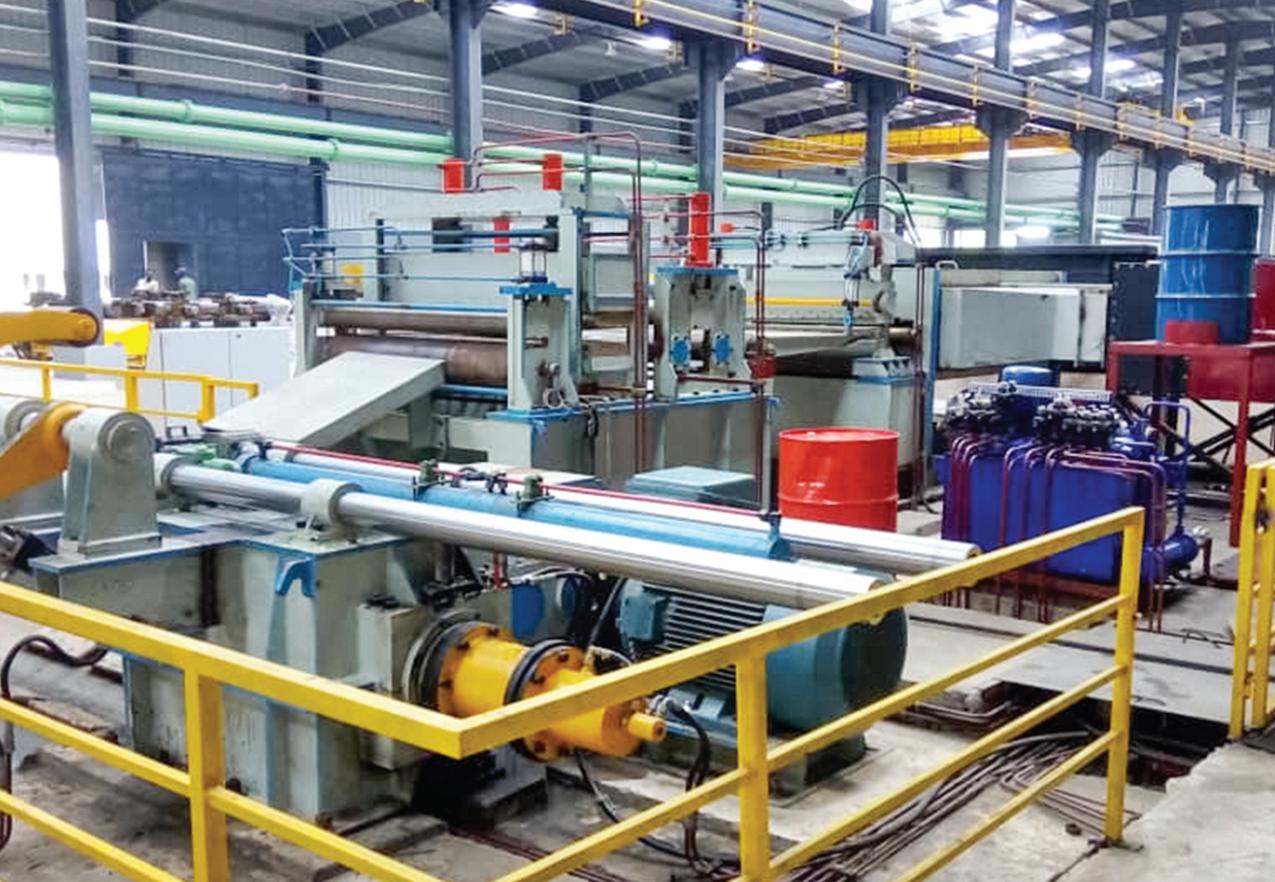
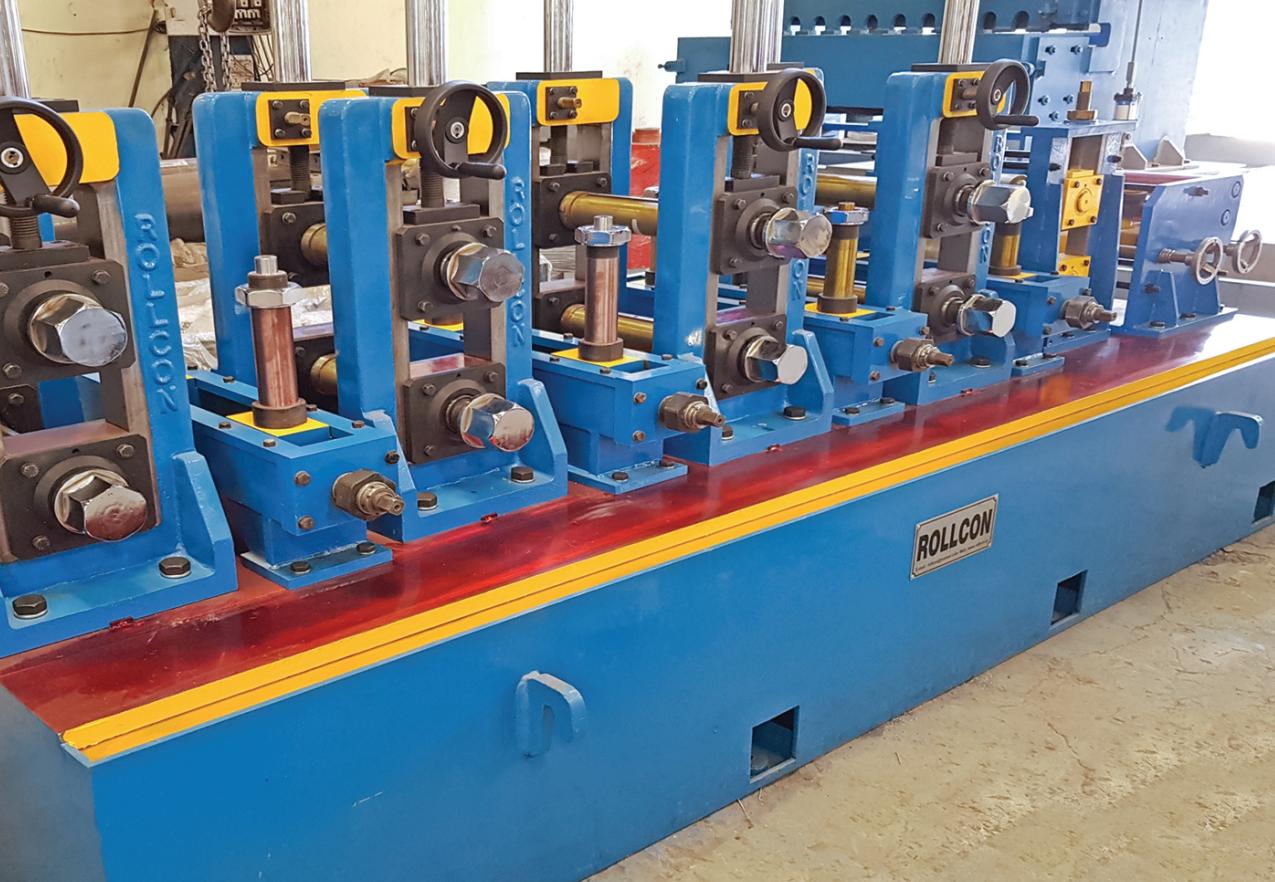
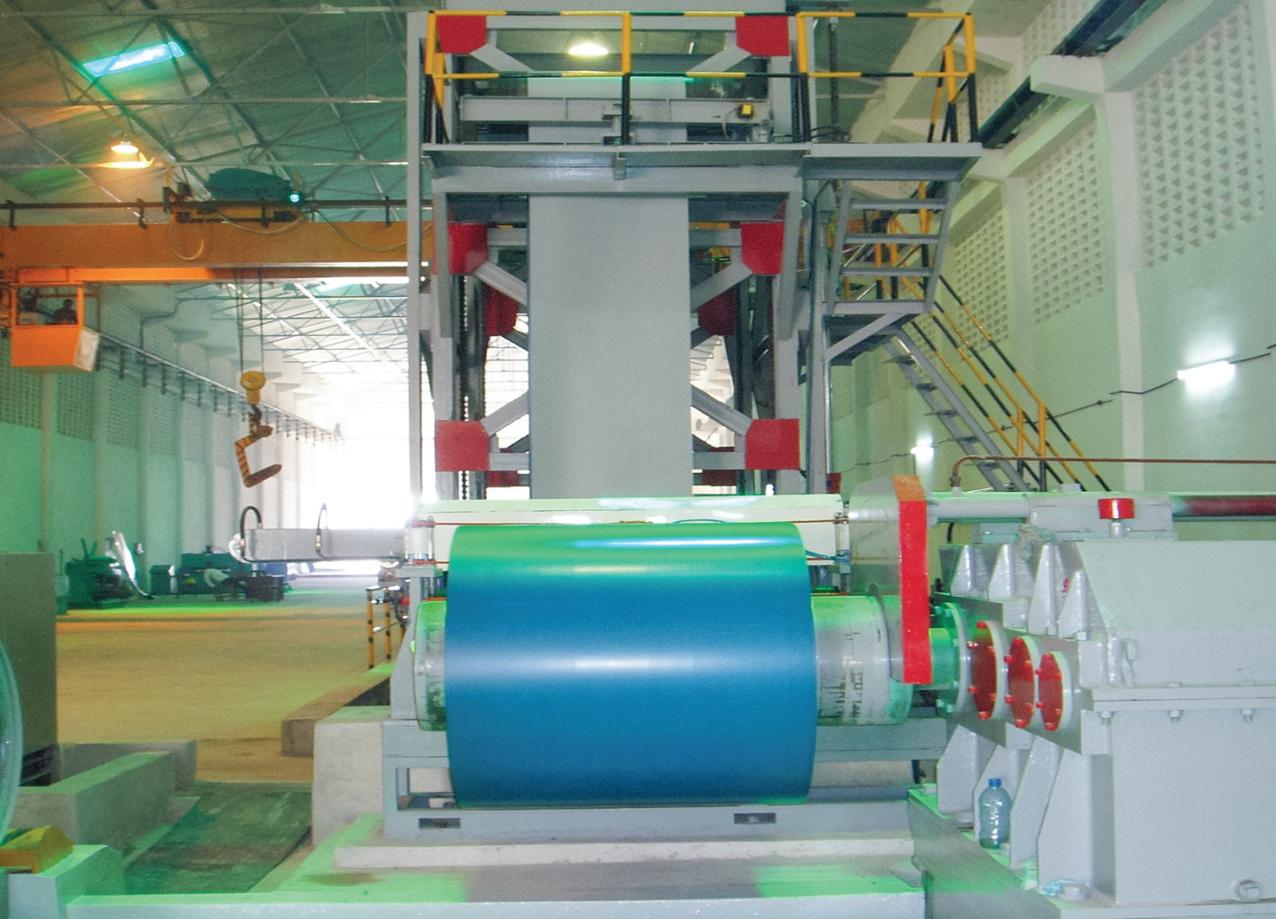
ENGINEERED TO BRANDED TECHNOLOGY
Pickling Lines
Take the best that exists and make it better “ ”
Tube Mills
Color Coating Lines
Cold Rolling Mills
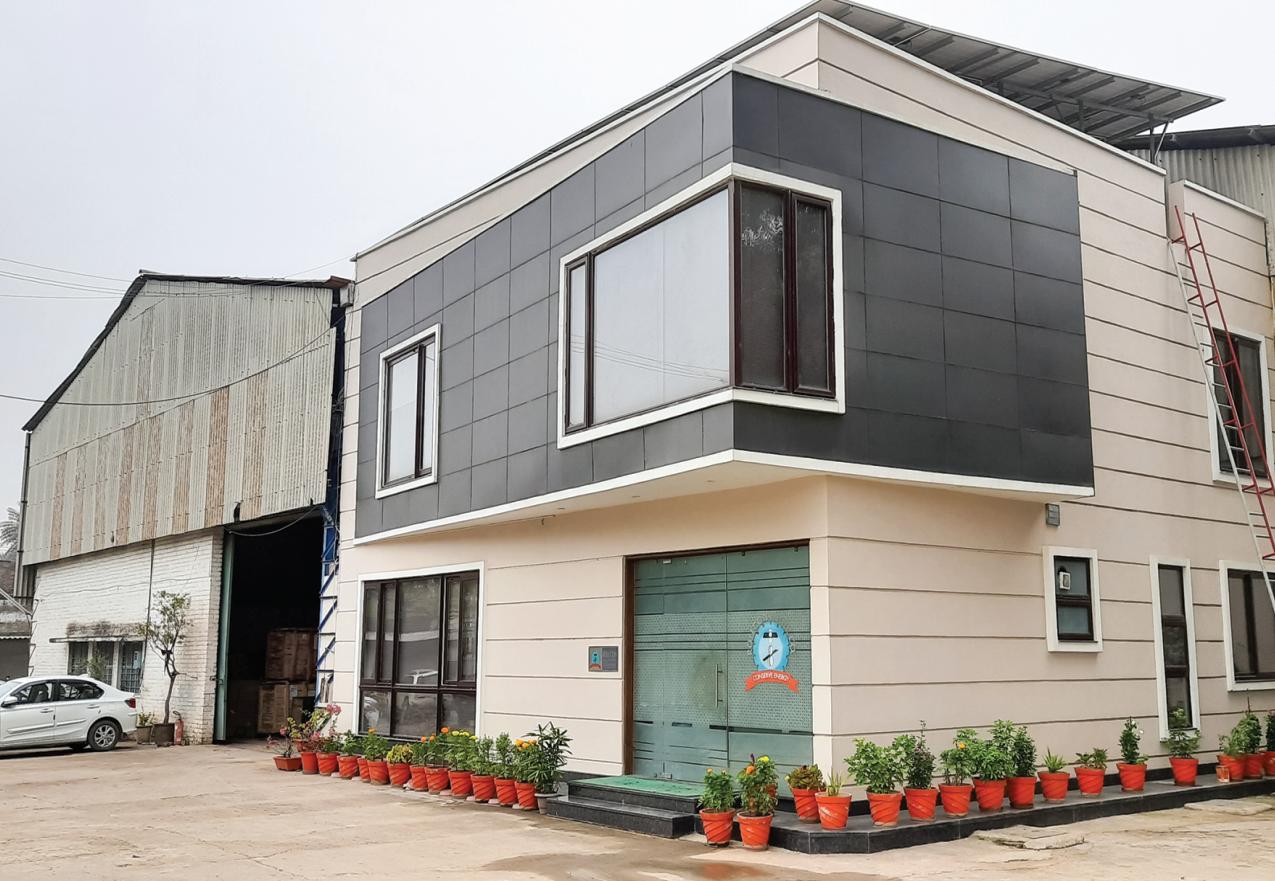
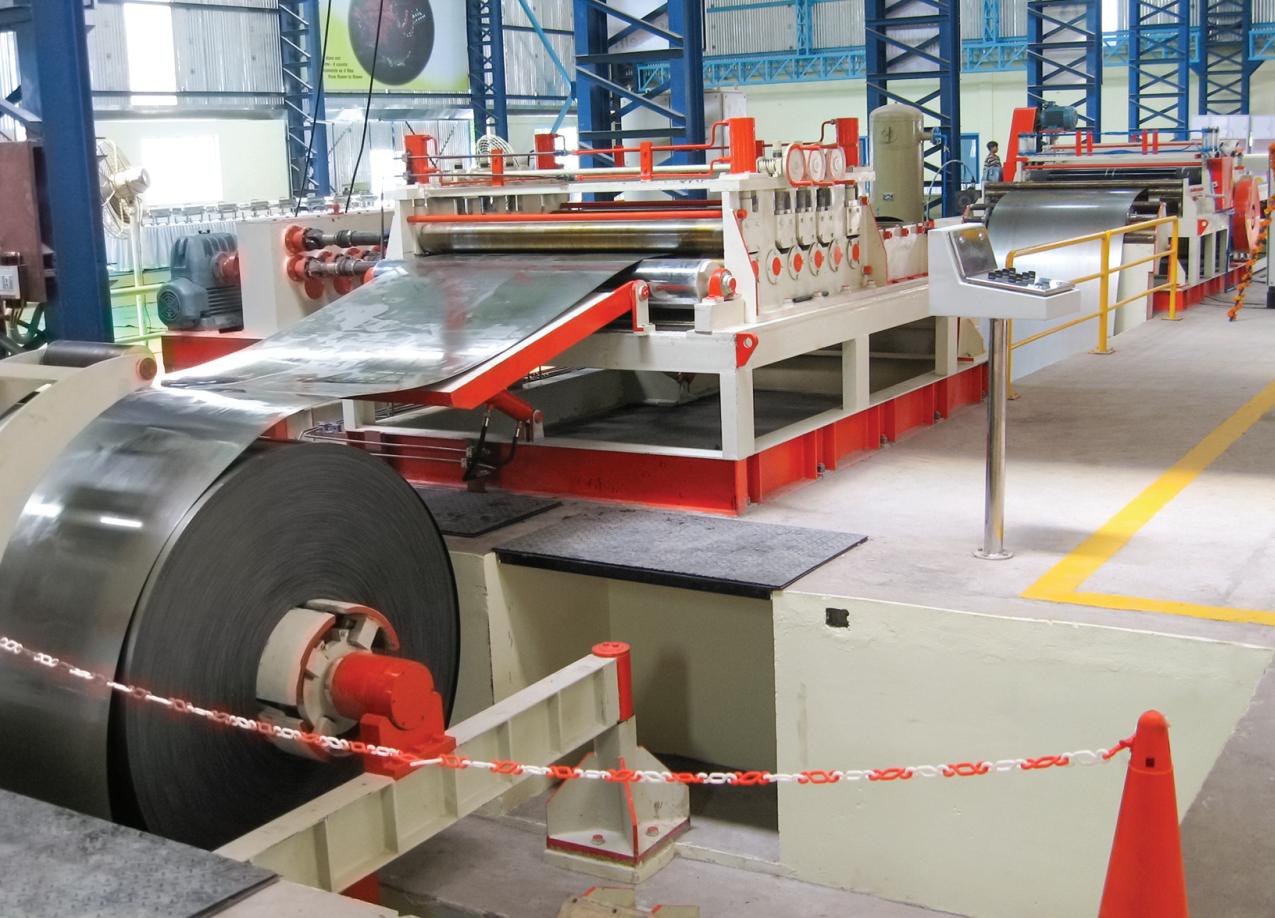
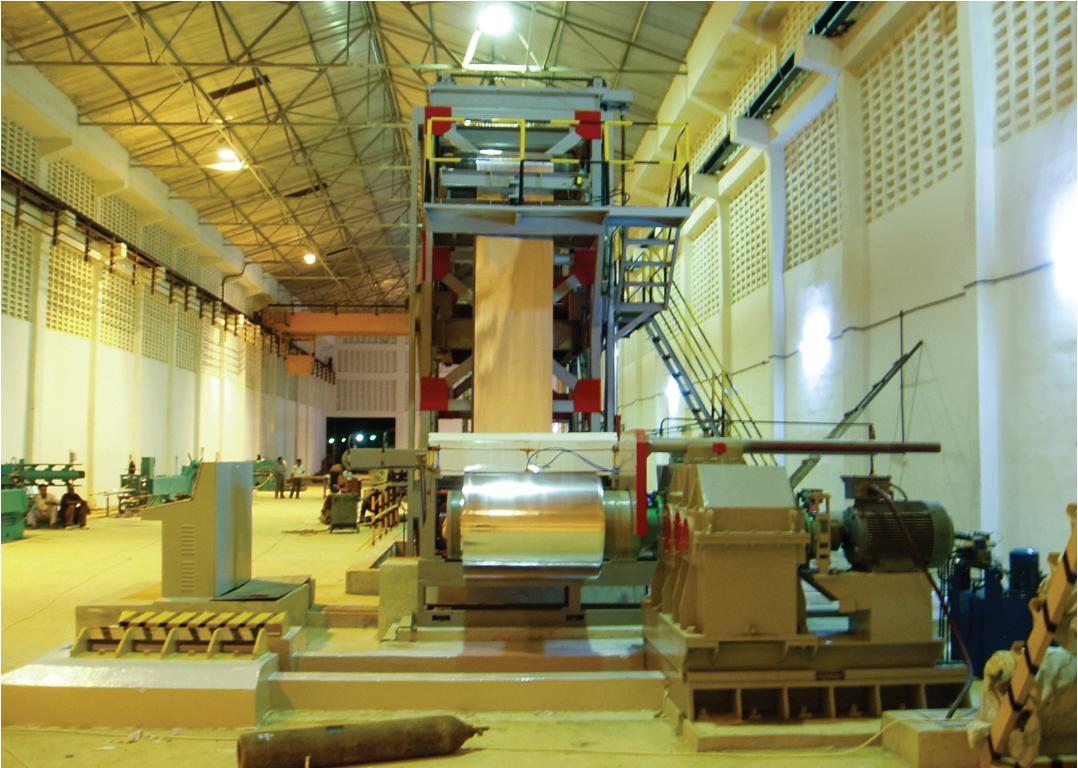
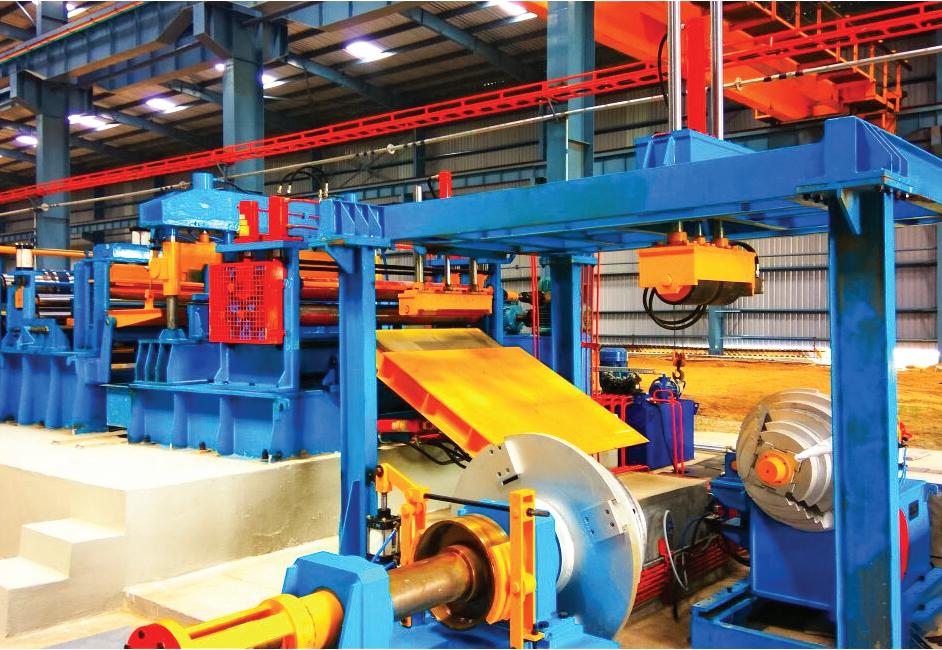
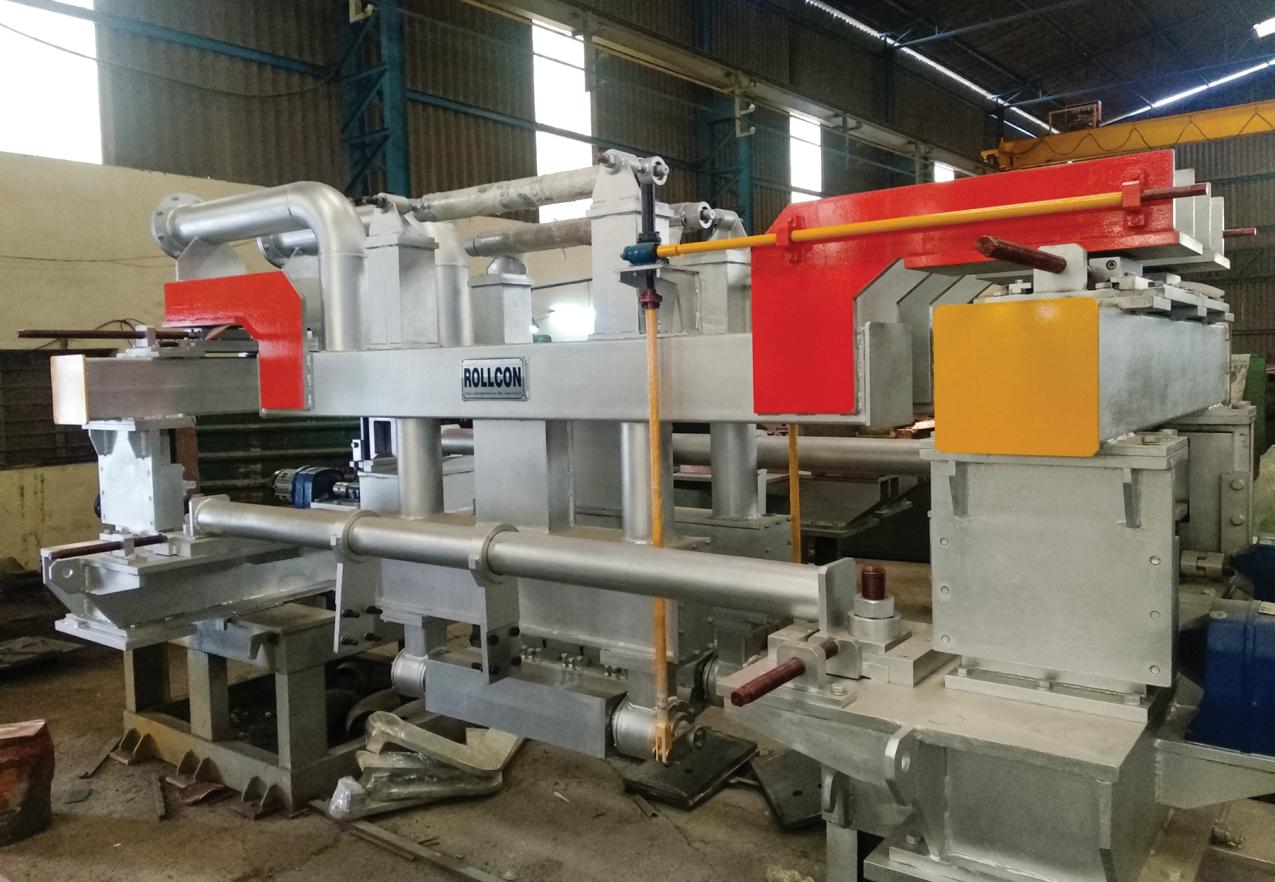
Cut to Length Lines Galvanizing Line Slitting Line B-21, Indl. Area-2, Mohali-160055, India. Tel: 0091-172-5090609, Fax: 0091-172-5093408 E-mail: rollcon@hotmail.com Website: www.rollcon.in We Believe in Manufactguring excellence and he portfolio of our performance. Achieving Consumer Satisfaction is our Motto. “ ” Rollcon Engg. Co. Pvt. Ltd. Air Knife
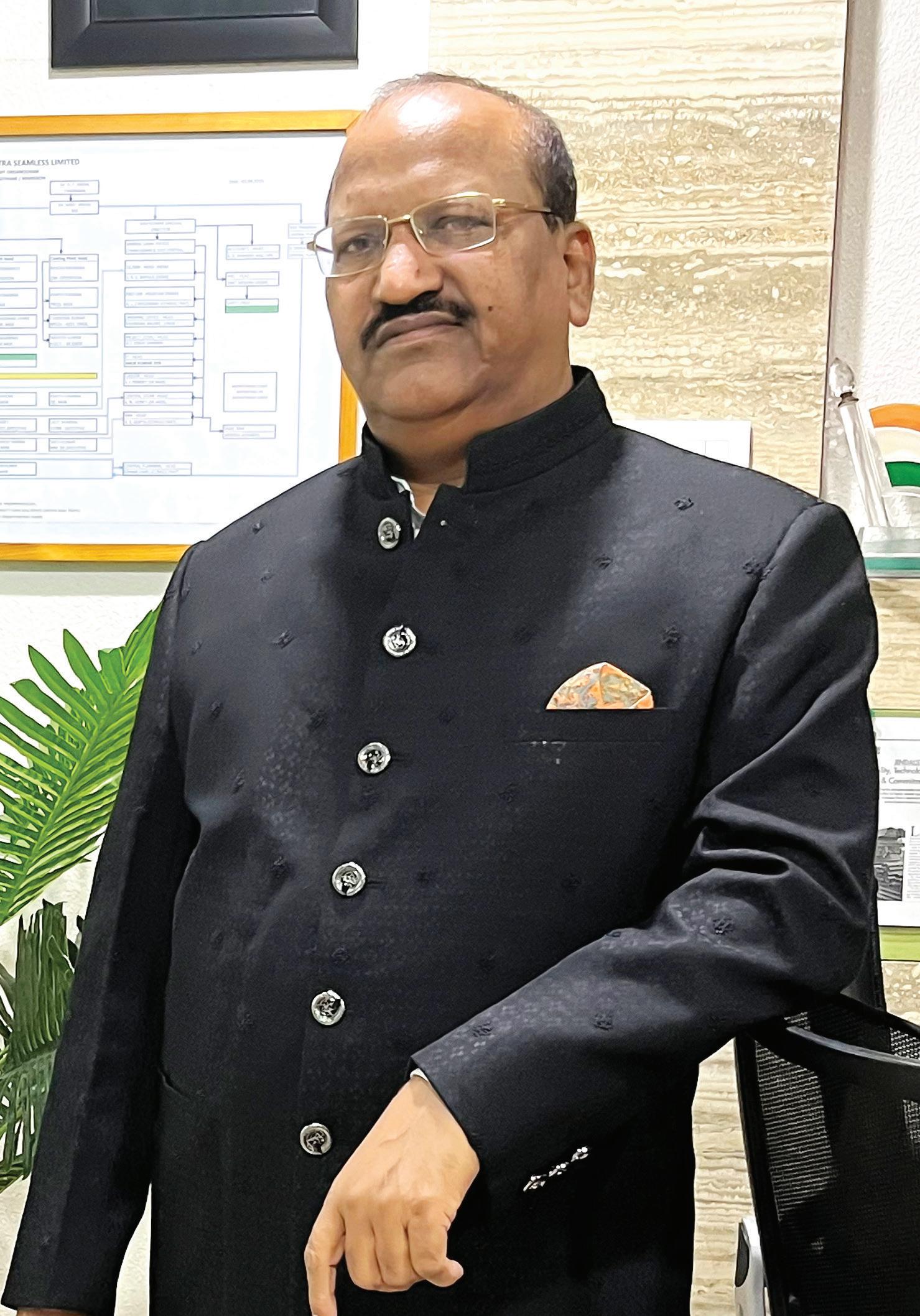
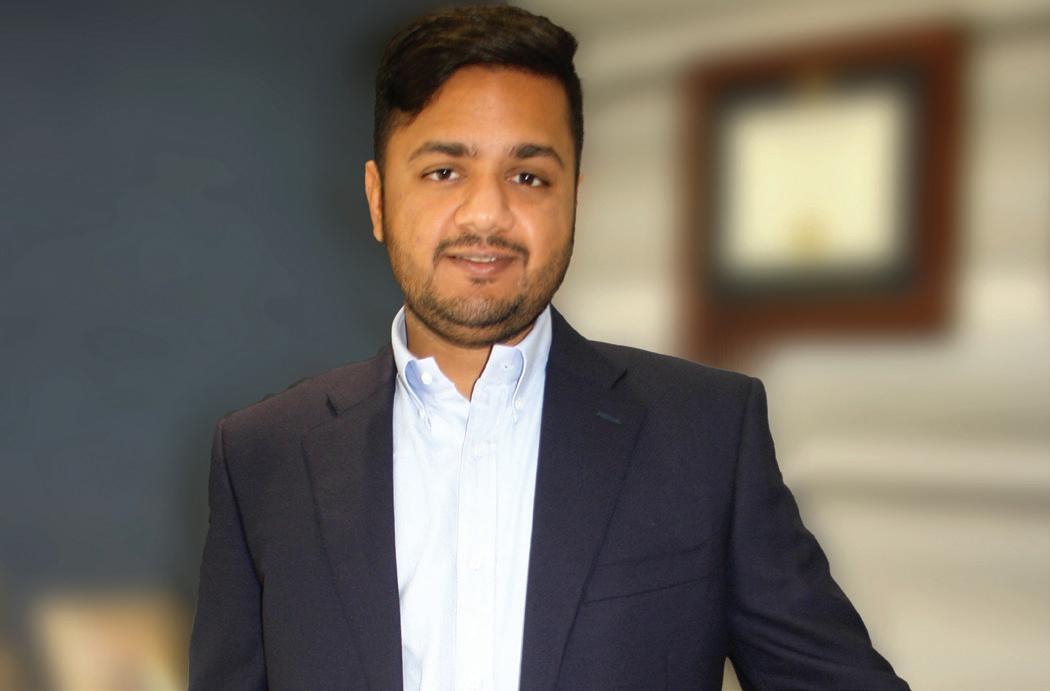
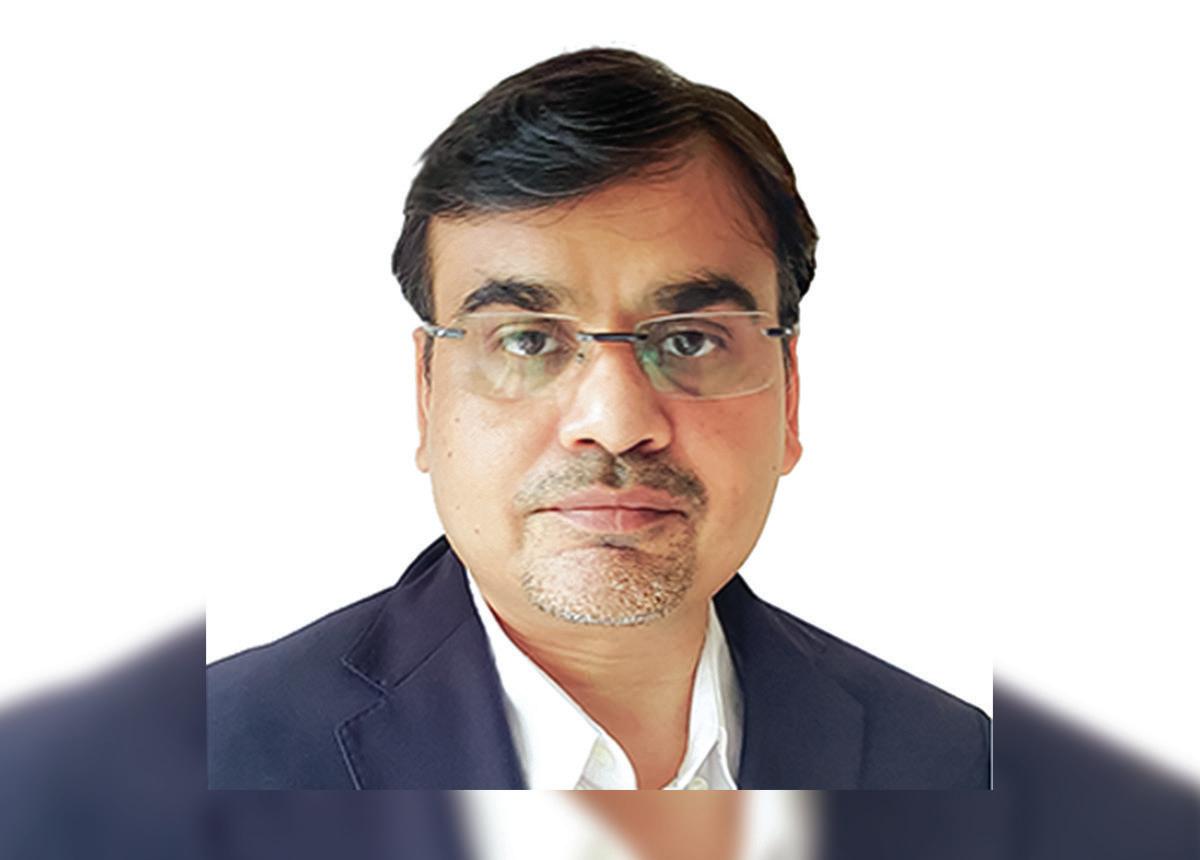

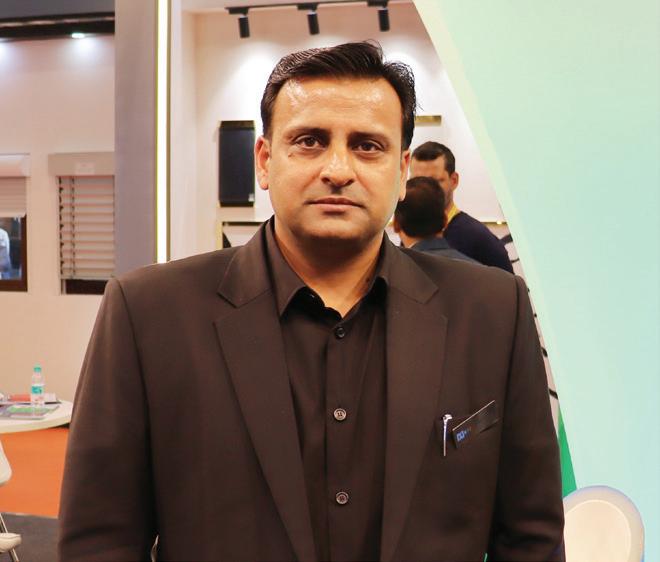
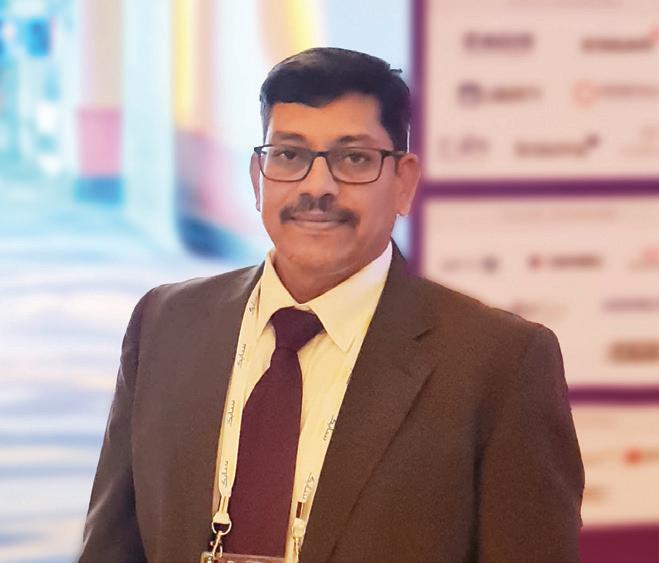
CONTENTS Maharashtra Seamless Fulfils its ‘Make in India’ Vision through Subsea Pipelines Utkarsh India to Expand Capacity to 2,40,000 MT by FY 2024-25 Wavin Vectus: Redefining the Pipeline Infrastructure KPT Piping System to Come Up with a New Plant Wirex FZE to Foray into Seamless Pipe Segment December-January, 2023 | Tube & Pipe India 08 12 16 18 22 26 BLM GROUP: Meeting Customer Needs with Greater MachineSoftware Integration
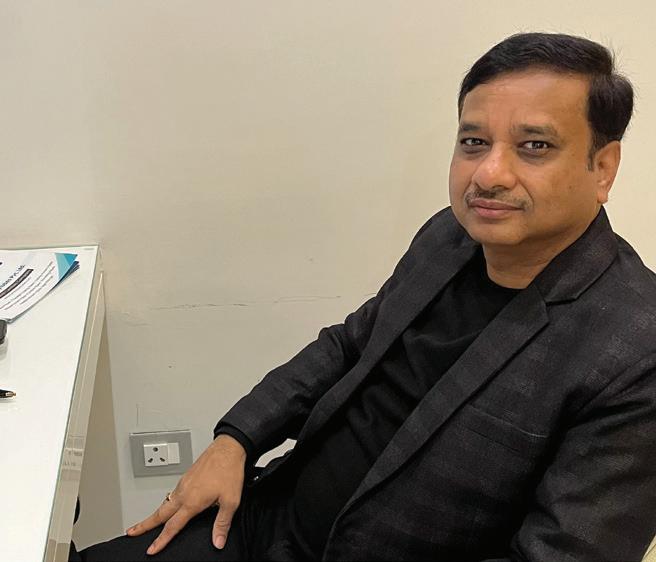
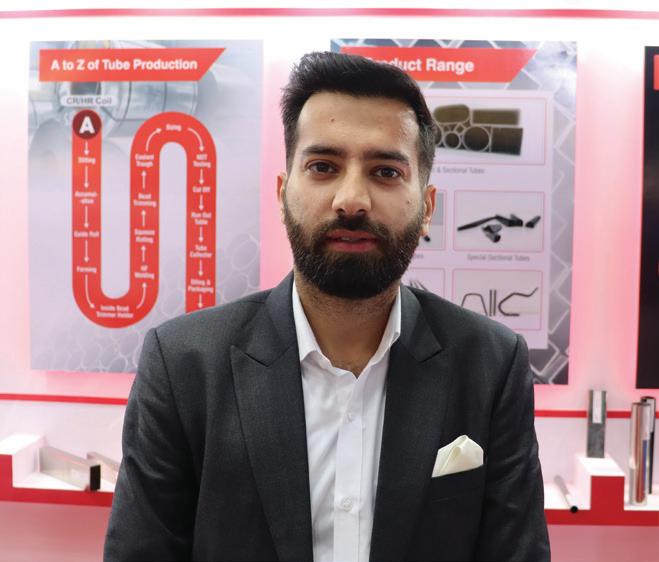

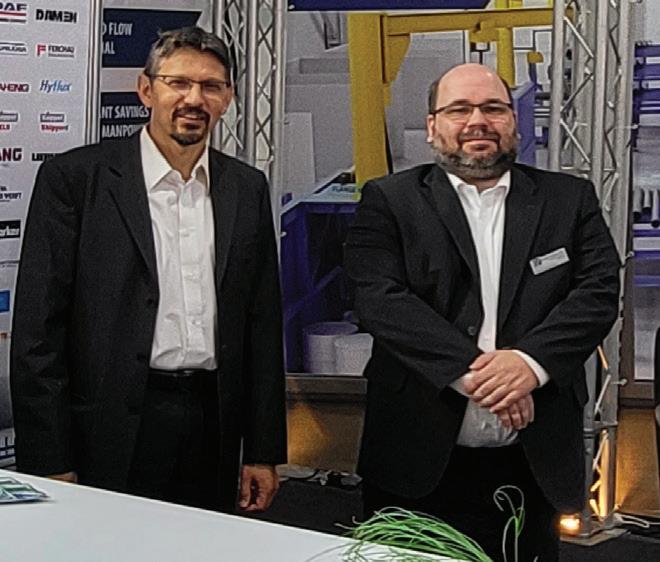

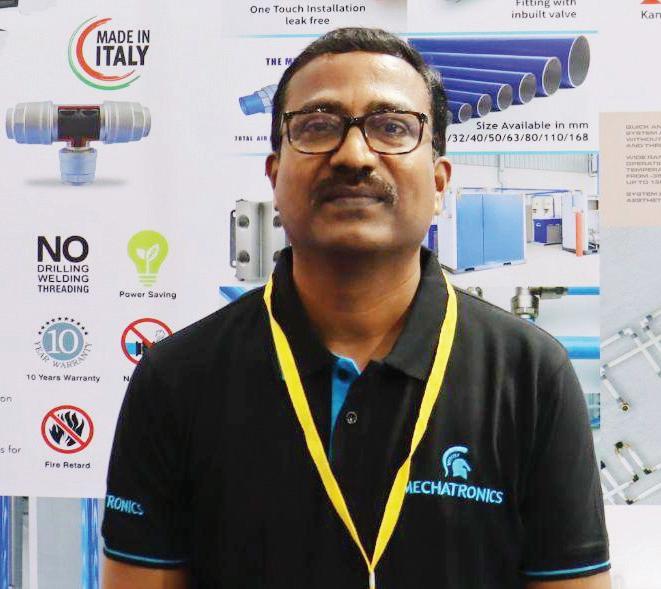
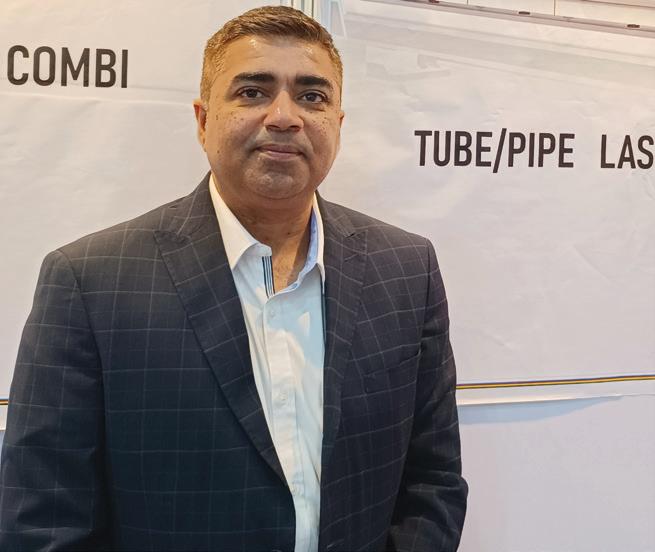
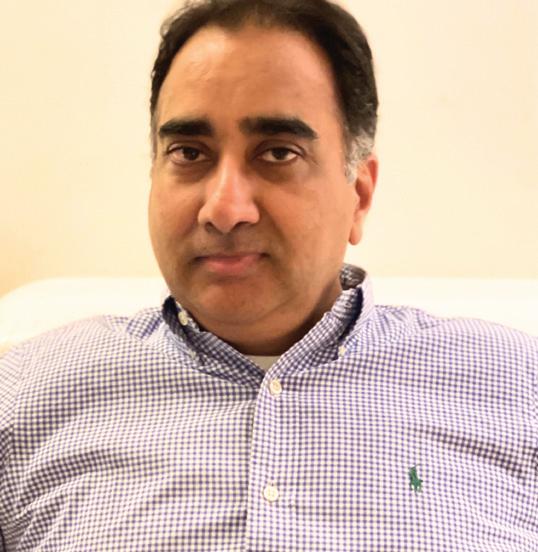
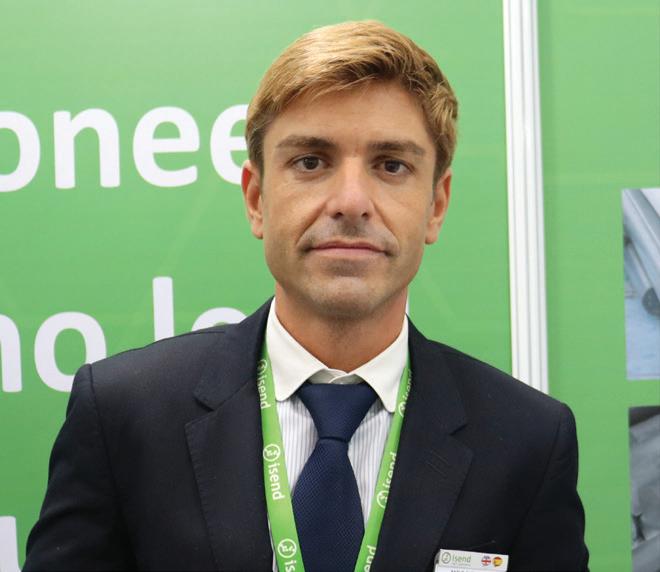
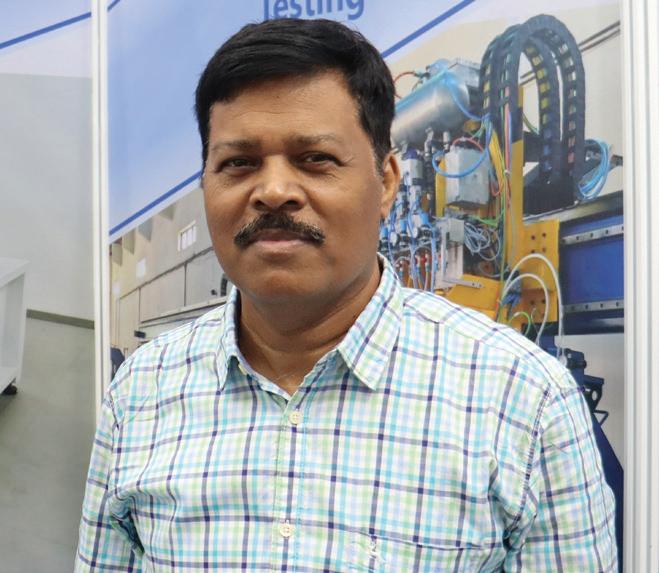
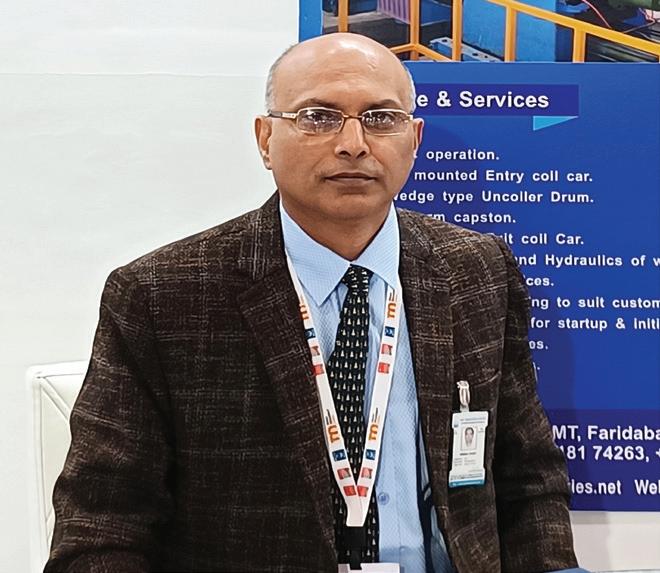
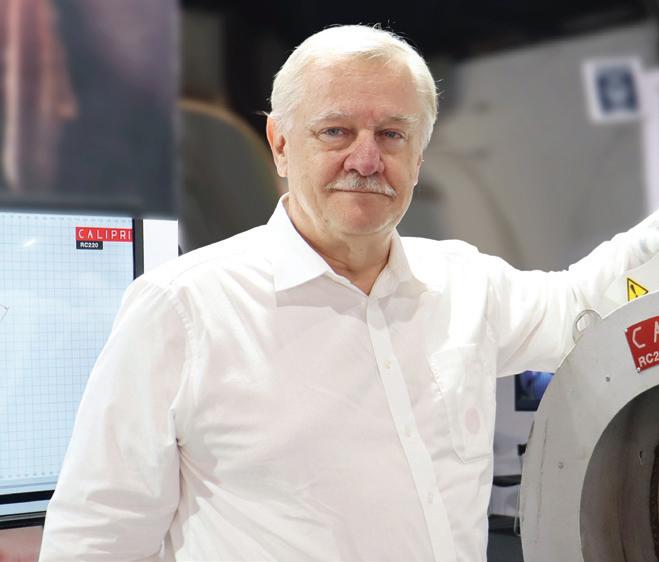
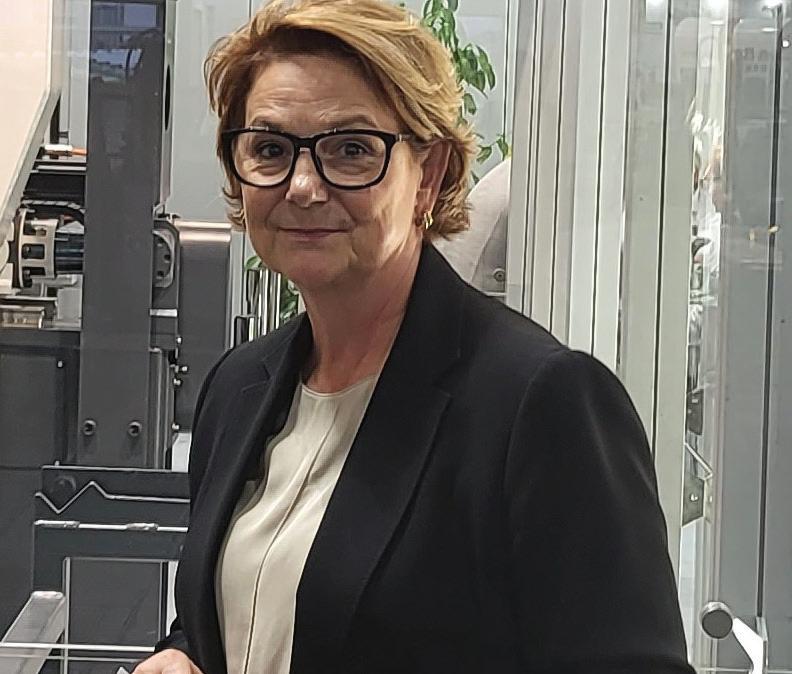
Rukmini Polytubes Launches PVC Electrical Conduit Pipes Ferron Tubes: Constantly on the Edge of Innovation Schwarze-Robitec: Technology Partner for Tailor-Made, Powerful and Future-Proof Tube Bending Machines • NEWS • DEMAND DRIVERS • TECH UPDATES 3R solutions: Focusing on Automation through the Aid of Software Framework Nirmal Overseas: Keeping Up with the Latest Technology is the Success Mantra Mechatronics to Set Up a Manufacturing Unit in India LN Tech Solution to Ramp Up its Manufacturing Chemical Process Piping: Developing Composite Product Combinations for Critical Applications ISEND: Utilizing Artificial Intelligence for Smart Industry Blue Star Engineering & Electronics: Eyeing Global Expansion GMT Industries Limited: Aiming Exponential Growth through WorldClass Products and Services NEXTSENSE: Calibrating, Measuring and Optimizing Schwarze-Robitec: Technology Partner for Tailor-Made, Powerful and Future-Proof Tube Bending Machines 28 32 36 38 40 44 48 52 54 56 58 60 62
Maharashtra Seamless Fulfils its ‘Make in India’ Vision through Subsea Pipelines
“We have invested to establish new laboratories for special testing facilities such as HIC and SSC and acquired a new state-of-the-art mill at Hyderabad having a capacity of 3.0 lakhs MT to roll critical pipes such as subsea pipes.”
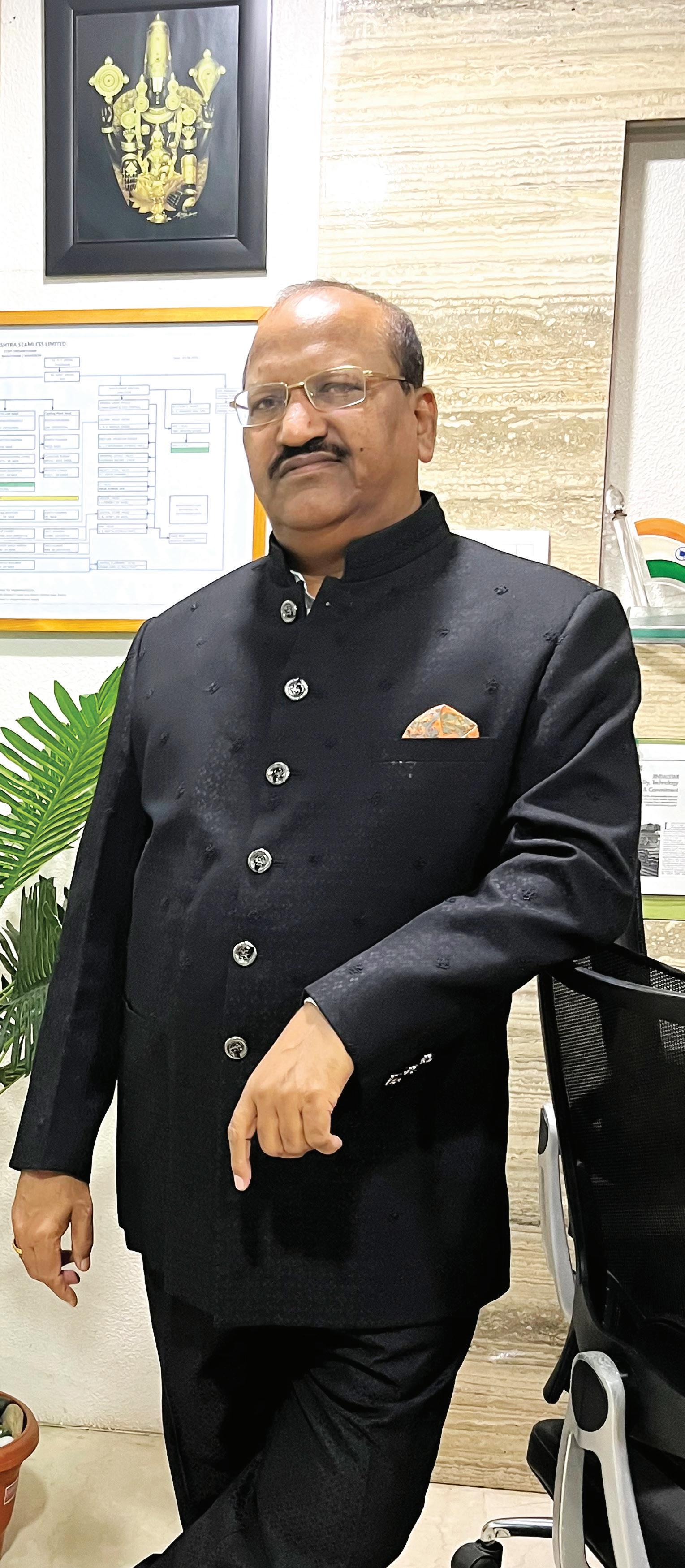
8 | INTERVIEW TUBE & PIPE INDIA • DEC - JAN 2023 www.tubepipeindia.com
As India ramps up its exploration activities in the oil and gas sector, Maharashtra Seamless Ltd. (MSL), the flagship company of the diversified D.P. Jindal Group, has been able to develop subsea pipes in-house in its continuous efforts to manufacture import substitution products. The company recently received its first order from the Oil and Natural Gas Corporation (ONGC). In an Interview with Tube & Pipe India, Mr. Shiv Kumar Singhal, President (Commercial), Maharashtra Seamless Ltd. shares interesting details about the project.
Tube & Pipe India: MSL has received its first order for a subsea pipeline in India. Tell us more about this prestigious project. What opportunities do schemes like ‘Make in India’ provide for such projects?
Shiv Kumar Singhal: The government had already spent a huge amount on imports but now India is on its way to becoming selfsufficient. DP Jindal Group has been manufacturing seamless pipes and tubes since 1992 under its flagship company Maharashtra Seamless Ltd. (MSL). We started our journey with manufacturing pipes of up to 7-inch OD. In the year 2004, we expanded and extended our range to up to 14-inch OD and now, we are manufacturing up to 20-inch OD. We are catering to various segments & applications such as oil & gas, petrochemicals, chemical, power, boiler, construction, automotive, mechanical engineering, farming equipment, transporting waste solutions, irrigation and many more. However, our presence was lacking in one application i.e. subsea pipeline which is the most stringent application in the oil and gas sector. We approached ONGC Ltd., a government-run organization, with our interest to develop this stringent product. With the help of their guidance, we have updated our mills and testing facilities by investing heavily to fulfill our vision of ‘Make in India’. We have not only improved at our end but also, developed the source of our raw materials domestically through the guidance of ONGC.
Later on, we submitted reports of these products to ONGC and they were satisfied and found their solution in our product as an import substitute and approved us as a vendor in the ‘Make in India’ scheme. The government has given us an opportunity to supply these subsea pipelines under ‘Make in India’ and now, we have started executing the order awarded to us. The first consignment has already been delivered satisfactorily this year.
TPI: What are the challenges of subsea pipeline development and how do you plan to address them?
SKS: Although we have 30 years of experience in manufacturing seamless pipes, subsea pipelines are the most stringent considering application and huge costs of laying and maintenance. We have been called by ONGC officials on multiple occasions to alert us and remind us about the importance of maintaining the quality of each pipe during our development phase. Even after placing the order with the contractor, ONGC had on deputed their own inspection agencies to witness 100% during the manufacturing stage wise from raw materials to final product with zero tolerance. We have successfully supplied part quantity to ONGC in the last three months.
However, we are facing the challenges of production loss to maintain such quality and online inspection by several agencies. We have invested to establish new laboratories for special testing
INTERVIEW | 9 www.tubepipeindia.com TUBE & PIPE INDIA • DEC - JAN 2023
facilities such as HIC and SSC. We have also acquired a new state-ofthe-art mill at Hyderabad having a capacity of 3.0 lakhs MT to roll critical pipes such as subsea pipes, gas cylinder pipes, casing pipes, boiler tubes and high-grade alloy steel pipes.
TPI: MSL successfully developed manufacturing facilities of gas cylinder pipes in its subsidiary (USTPL). Tell us more about the infrastructure and R&D efforts put towards product development.
SKS: The manufacturing facilities at USTPL will play a very important role in import substitution. USTPL seamless mill is a state-of-the-art, modern FQM plant supplied by Danieli Group, Italy. It is one of the world’s best technology automated mills and produces the finest surface quality with less eccentricity, ovality, close control of dimensions and thin wall thicknesses of 6 mm. Gas cylinder pipes generally require defect-free smooth ID/OD surfaces and very close control on wall thicknesses.
Using the latest technology and blending with the experienced competent team, the gas cylinder pipe requirements were translated and formulated by designing the physical metallurgy. We developed gas cylinder tubes of high quality in a very short time on war footing demand for developing oxygen cylinder pipes by the Indian government during the emergency in the second wave of COVID-19. Now, we are regularly supplying gas cylinder pipes for oxygen cylinders and automobile industries such as Maruti, Tata Motor, Bajaj, etc. This was possible due to the availability of modern infrastructure and research & development facilities at DP Jindal Group.
TPI: Could you please outline the details of the merger of MSL & USTPL? How has this merger proven fruitful in solidifying your position in the global market?
SKS: Consolidating assets of both manufacturing units, with an eye toward stimulating growth, the merger helped us gain competitive advantages by increasing market
share, and influencing supply chains. MSL has a strong brand value and USTPL has the latest technology; the merger will further help us to cater to the ‘monopolistic import market’ of gas cylinder pipes. Domestic cylinder manufacturers will save a huge amount of foreign exchange after getting state-of-theart technology of USTPL and brand assurance of MSL (The D P Jindal Group). It would open avenues for our cylinder pipes in the export market. We can establish ourselves as a complete piping solution in the domestic as well as international markets. With a full range of seamless and ERW pipes (0.5-inch to 20-inch) under one umbrella, we can satisfy the requirements of our domestic and global customers by supplying from both plants.
TPI: What will be your strategies for serving the needs of the tube & pipe market in the country and what more can we hope to see from the company in the future ahead?
SKS: Our management has declared new investment to utilize our maximum capacity to upgrade the existing facilities and develop products for new markets. We are coming up with cold drawing facilities by which we can cater to bearing, automobile and mechanical tube & pipe segments. We can serve our customers with faster delivery of a full range of pipes, by adding more finishing lines, and testing lines in all sectors of the domestic and international market.
TPI: What is the success mantra behind your growth?
SKS: We have developed ourselves as per the demand of the industry. Development and innovation are the keys to leadership in the industry. Our experimental technical team and commercial team are the key strength of our success. We have total solutions under one roof including a wide range of seamless pipes, ERW Pipes, 3-layer coating pipes, GI pipes, casing pipes, tubing, drill pipes, etc.
10 | INTERVIEW
& PIPE INDIA • DEC - JAN 2023 www.tubepipeindia.com
TUBE
"We are coming up with cold drawing facilities by which we can cater to bearing, automobile and mechanical tube & pipe segments."
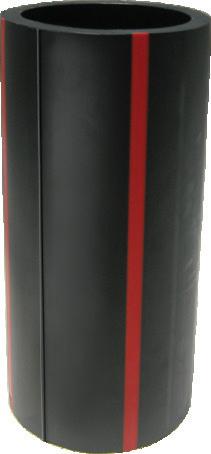


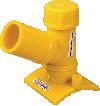











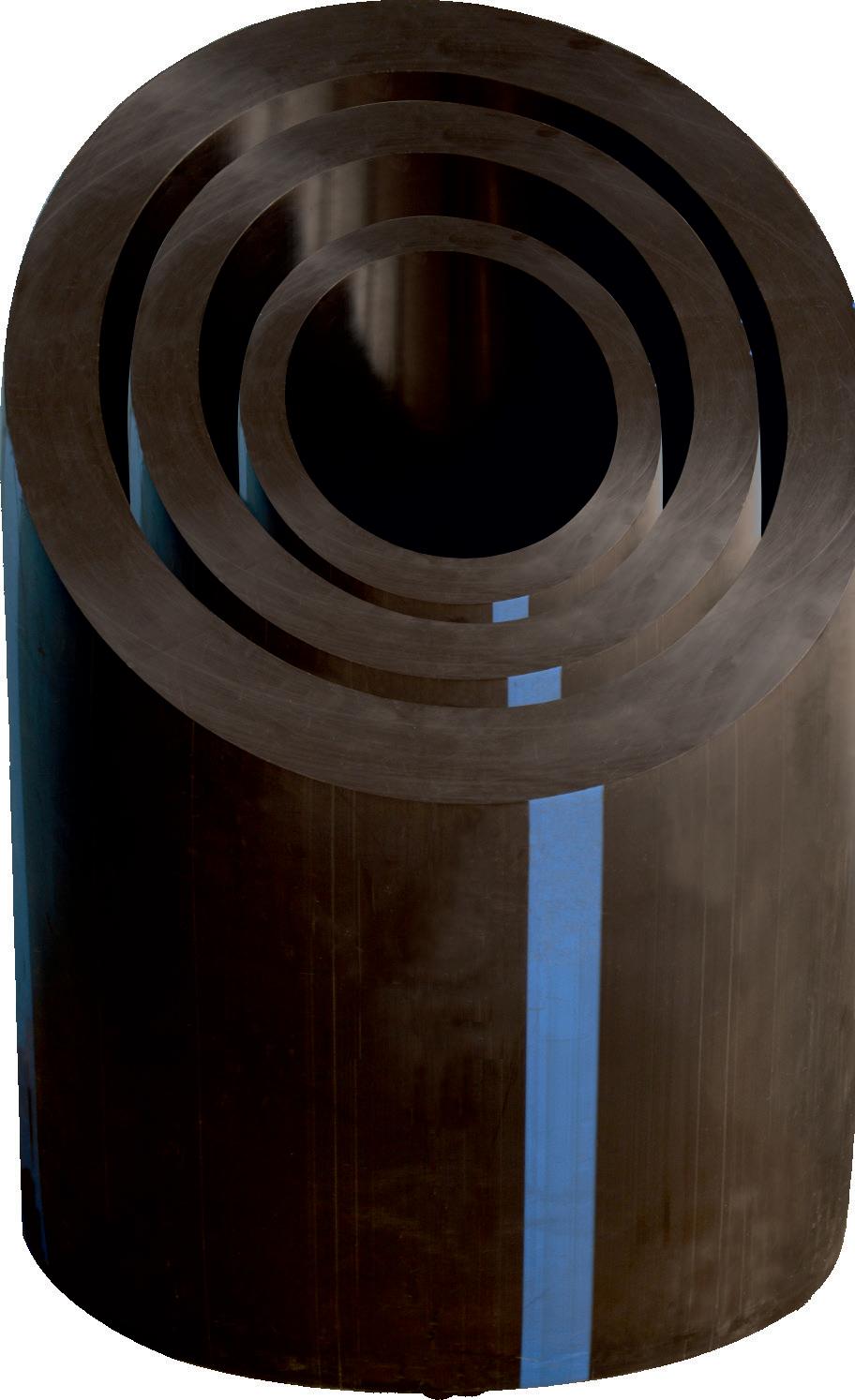
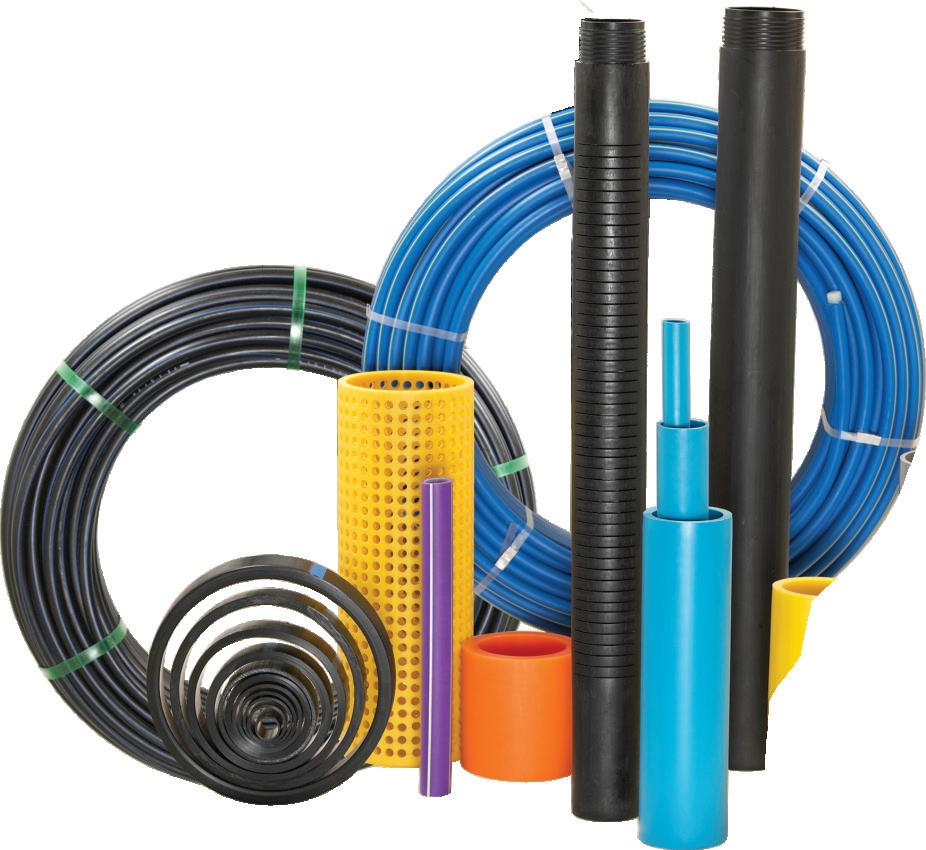
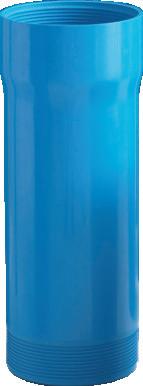
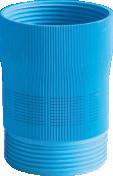

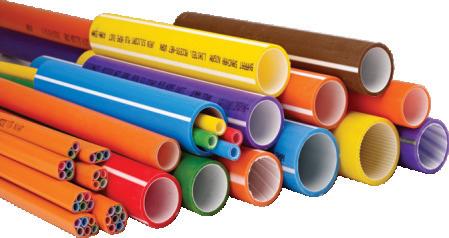
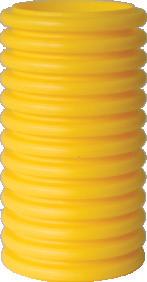

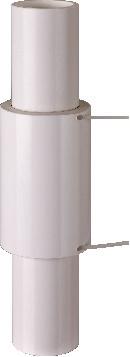


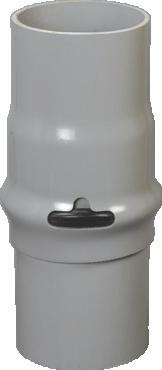




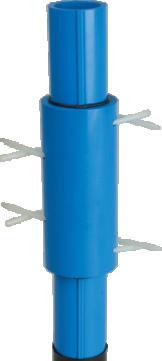
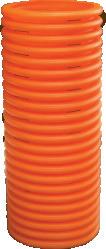
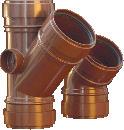

Utkarsh India to Expand Capacity to 2,40,000 MT by FY 2024-25
Utkarsh India Ltd. is one of the leading manufacturers and suppliers of high-end engineering products and services in the infrastructure, agriculture and domestic water piping industry. Highly respected in both the government and infrastructure sectors, Utkarsh India brings along over 40 years of experience in high-end engineering and manufacturing, working with the leading raw material suppliers, offering only the best to its customers. In an Interview with Tube & Pipe India, Mr. Utkarsh Bansal, Director, Utkarsh India Ltd. talks in detail about the product range of the Company.
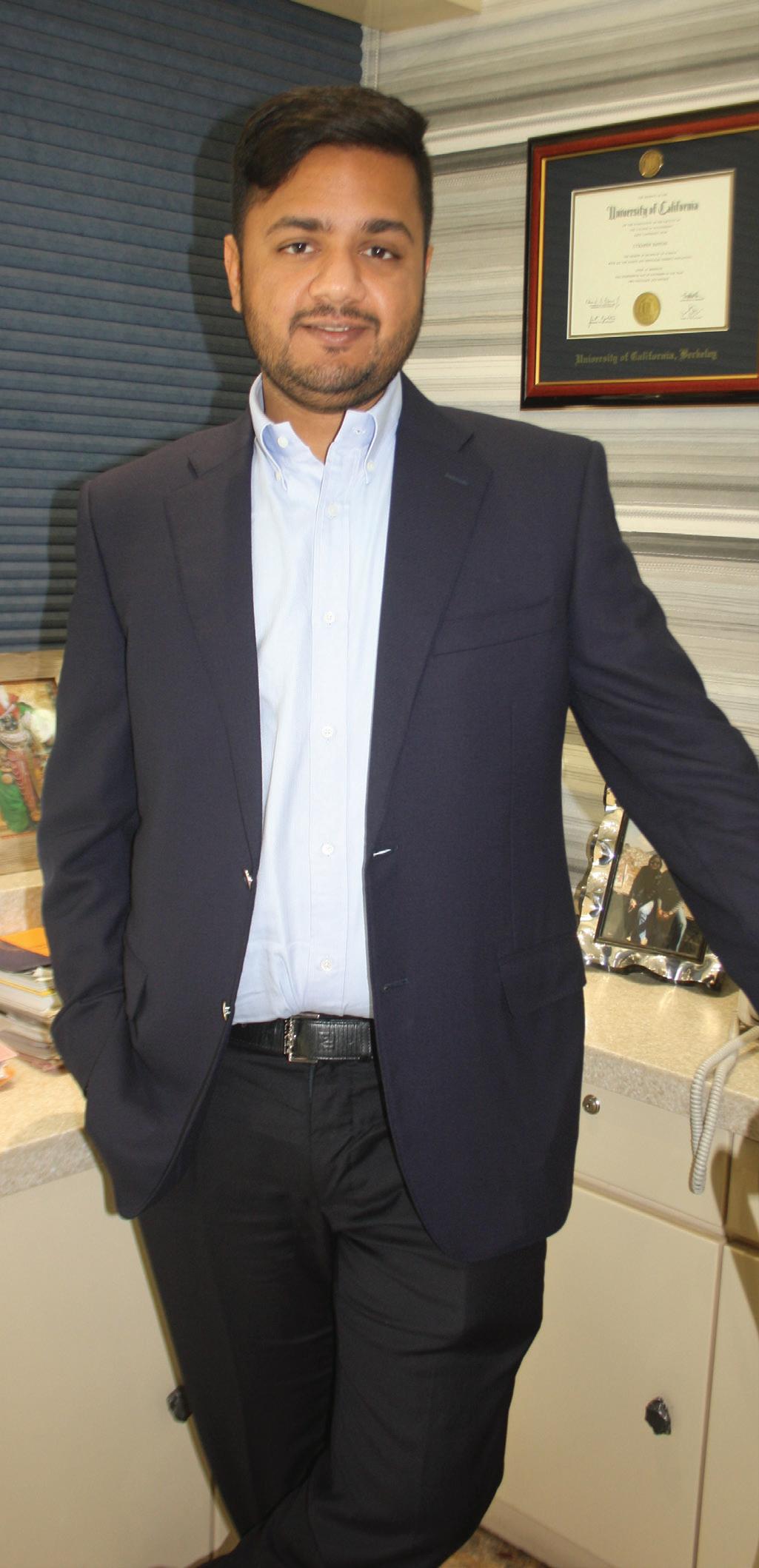
12 | INTERVIEW TUBE & PIPE INDIA • DEC - JAN 2023 www.tubepipeindia.com
Tube & Pipe India: Could you please give us a brief outline of the business journey of your company along with its crucial milestones?
Utkarsh Bansal: The company started producing steel pipes about 40 years ago under the brand name ‘Bansal’ which, to date, is one of the most widely known brands in the eastern region for pipes. About 20 years ago, Utkarsh India Ltd. and the ‘Utkarsh’ brand as we know it came into being and we are one of the leading brands in the eastern region as well as pan-India for steel tubes and pipes.
Due to our presence in various infrastructural sectors such as roads and highways (via crash barriers), railway electrification (via OHE structures), urban development (via lighting poles and high-mast), water transportation (via PVC, HDPE and steel pipes), power transportation and distribution (via steel tubular poles, transmission towers) and telecom (via telecom towers) through our diversified product portfolio, we have become the brand of choice for steel tubes and pipes applications in all these sectors on a pan-India basis as we allow buyers to cater to their various infrastructural product needs in the same house. We are also one of the leading galvanizers in the country with 5 hot-dip galvanizing plants for pipes and structures and one of the most active players in the galvanized ERW pipes industry. The company has gone from an enterprise doing less than INR 100 crore of revenue in 2002-2003 to do more than INR 2000 crore of revenue (projected) in the year 2022-2023.
TPI: Kindly cast some light on the infrastructure, manufacturing capabilities, and machinery installed at your facility.
UB: Utkarsh India Ltd. is a manufacturing firm for various engineering goods that are supplied to infrastructure projects. The company, having over 40 years of manufacturing experience, is one of the largest processors of steel and the highest producers of galvanized
products in the country with overall revenue of more than INR 1500 crores. We are one of the largest manufacturers and suppliers of MS ERW Pipes in the country and outside the country. We produce over 1,44,000 MT per annum of MS ERW pipes, with more than 3000 MT of ready-stock pipe in hand. We keep more than 3000 MT pipes in ready stock in different sizes to allow us to execute your orders timely without any delay to your project.
Our infrastructure comprises two world-class manufacturing facilities, six tube mills manufacturing 15 mm NB to 400 mm NB, three slitting lines, five galvanizing facilities with the capacity of galvanizing up to 12.5 meters, a high-speed tube mill that can process 100 meters/minute, an in-house testing facility and inhouse end finishing, beveled end, and threading facility.
We have in-house hot dip galvanizing facilities, using only special high-grade zinc (99.995% purity) procured from Hindustan Zinc Ltd. We have in-house testing facilities and specialized manpower to ensure standard coating and the best finish at all times. We always keep sufficient raw material in hand to ensure we can complete the inspection (both stage and final) within 15 days through direct or 3rd party inspection and we provide excellent service during sales as well as complete after-sales service. Our plants being located in the NH provide easy transportation, and our in-house logistics department helps to find the most cost-efficient transport options around the country.
TPI: Tell us about your product portfolio along with its key strengths and applications.
UB: Utkarsh India Ltd. is forging ahead manufacturing all diameters of steel tubes and GI pipes for applications in the fields of air & water lines, structural & fencing, fire sprinklers, borewells, hollow section, idlers & belt conveyors, lancing pipes, boiler & heat
INTERVIEW | 13 www.tubepipeindia.com TUBE & PIPE INDIA • DEC - JAN 2023
“We are looking at becoming the largest producer of steel ERW pipes (both black and galvanized) in Eastern India within the next two years which is in line with the company’s target to achieve INR 5000 crore revenue in two years.”
exchanger and general engineering. Below are the specifications we provide for different applications:
• Air & Water Application [IS 1239, IS 3589, BS 1387, IS 4270, EN 10255, ASTM A 53, AS 1074]
• Firefighting & HVAC Applications [IS 1239, IS 3589, ASTM A 53, ASTM A 795, ASTM A 135- Grooved Pipes]
• Structural Application [ IS 1161, IS 4923, EN 10219, ASTM A 500, AS 1163]
• General Engineering Applications [IS 3601, IS 9295, AS 1143- Idlers & Belt Conveyors]
• Steel Tubular Pole [IS 2713]
We source steel/HR coil from the Steel Authority of India Ltd. (SAIL). Our strict QA/QC team checks all pieces of all lots at various stages from raw material procurement, during production, and before dispatch to ensure there are no errors when the material reaches the site.
We also manufacture large diameter pipes from 8-inch nominal bore to 16-inch nominal bore with a manufacturing capacity of approximately 4000 MT per month. In this, we have pipes of different diameters like 200 mm, 250 mm, 300 mm, 350 mm, and 400 mm nominal bore. We are planning to expand this range to a 20-inch nominal bore very soon to cater to the need of the market.
TPI: What are the recent developments at your end? Also, what will be your future plans?
UB: We are looking at expanding our capacity to 2,40,000 MT by enhancing the capacity of our large diameter mill by adding 18-inch and 20-inch (450 mm and 500 mm OD) production facilities as well as creating enhanced facilities for production and storage of large diameter pipes as well as adding two more mills for other sizes. We are looking at becoming the largest producer of steel ERW pipes (both black and galvanized) in Eastern India within the next two years which is in line with the company’s
target to achieve INR 5000 crore revenue in two years.
TPI: Please shed some light on the market footprint and clientele of your company along with the expansion plans.
UB: We have a strong channel market in the eastern region with over 50 active distributors working with us for various markets. Alongside this, we have a retail network of more than 1000 retailers across West Bengal who are working via these distributors. In the industrial segment, we have buyers on a pan-India basis from various sectors. NTPC Ltd., National Aluminium Company Ltd. (NALCO), Tata Steel Ltd., Oil and Natural Gas Corporation, Hindustan Petroleum Corporation Ltd., Larsen & Toubro Ltd., Kalpataru Power Transmission Ltd., National Highways Authority of India (NHAI), Bharat Heavy Electricals Ltd., Coal India Ltd., Steel Authority of India Ltd. (SAIL), ESL Steel Ltd., Indian Railways, Power Grid Corporation of India Ltd., CESC Ltd., West Bengal State Electricity Distribution Company Ltd., and DMC Corporation are some of our reputed clients.
Utkarsh India Ltd., a govt of India recognized export house, has achieved the EEPC India award for export excellence for two consecutive years & gained a foothold in various countries including Germany, Australia, Canada, Denmark, Iraq, Kuwait, Qatar, Mozambique, Nigeria, Northern island, Sri Lanka, the UAE, the UK, etc.
TPI: Share your outlook on the tube and pipe industry. How do you see the market evolving in the future?
UB: India is known to have INR 60,000 crore steel tubes and pipes market which is growing by 4-5% CAGR on an annual basis. We predict this growth trajectory to be further amplified due to the demand for steel pipes in the various schemes of the government across sectors such as the Jal Jeevan Mission for water transportation.
TUBE & PIPE INDIA • DEC - JAN 2023
TPI: What is your technology and business roadmap?
UB: The business roadmap for the company is to achieve revenue of INR 5,000 crore by FY 2024-25 across all verticals within the steel processing, handling, pipes, rolling, and galvanizing sphere, within which our roadmap for the steel pipes vertical is as follows:
• To achieve a volume of 2,40,000 MT in steel pipes (black+galvanized) by FY 2024-25
• To achieve a 5% market share of the steel tubes and pipes market in India
• To be the leading brand for steel tubes and pipes in Eastern India Technology-wise, we are utilizing all the latest technology in our mills to achieve the best quality and accuracy. We have also implemented the use of SAP S4/ HANA for our production process and planning to ensure we are adhering to the time commitments and requirements of our customers.
14 | INTERVIEW
www.tubepipeindia.com
"Utkarsh India Ltd., a govt of India recognized export house, has achieved the EEPC India award for export excellence for two consecutive years & gained a foothold in various countries including Germany, Australia, Canada, Denmark, Iraq, Kuwait, Qatar, Mozambique, Nigeria, Northern island, Sri Lanka, the UAE, the UK, etc."
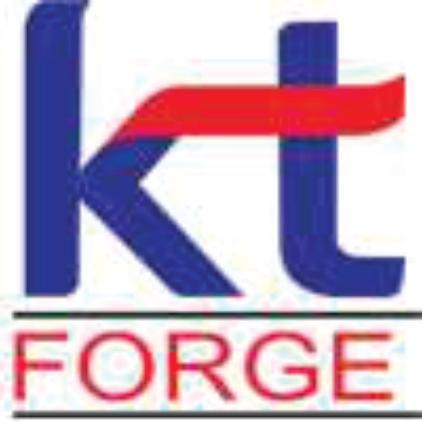
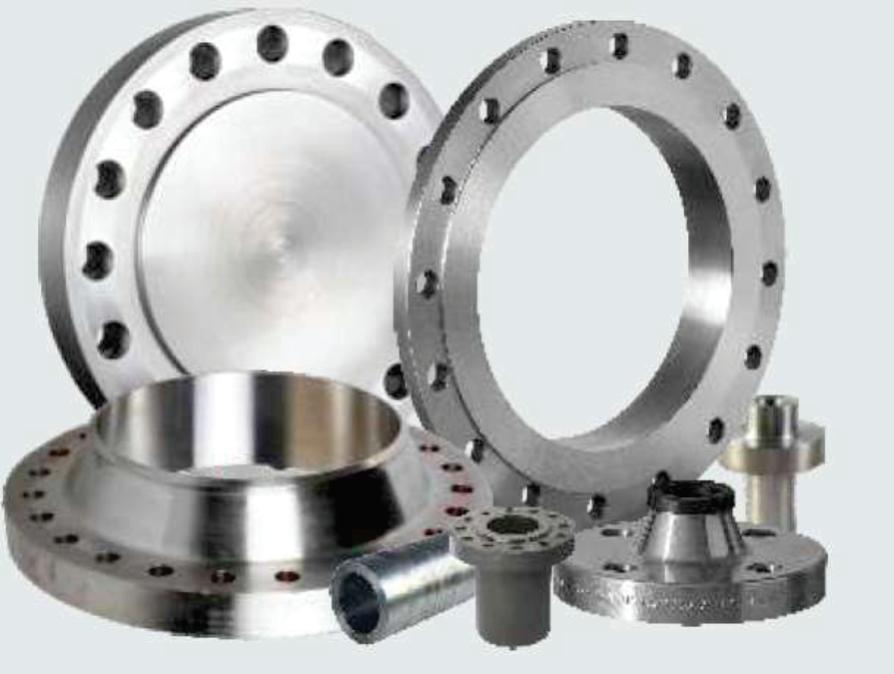
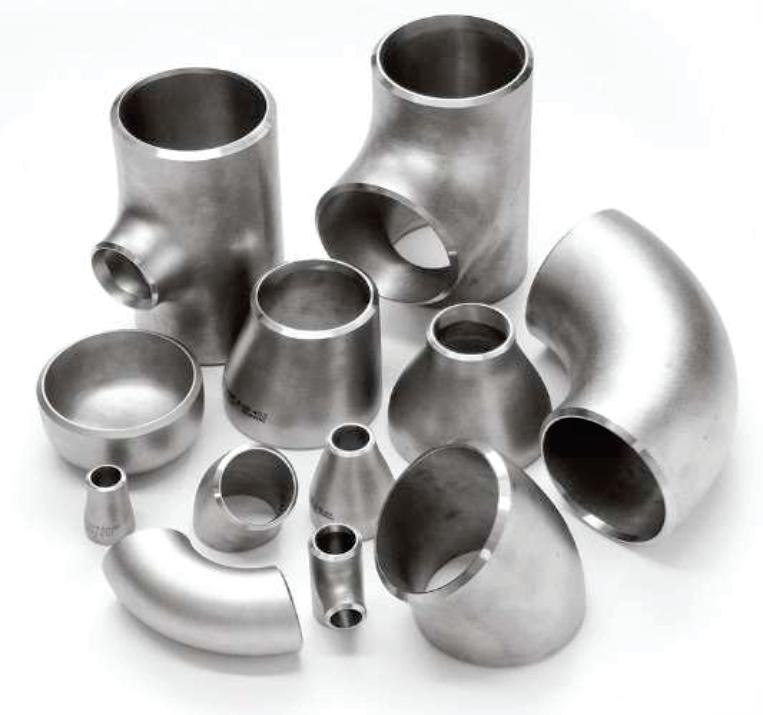
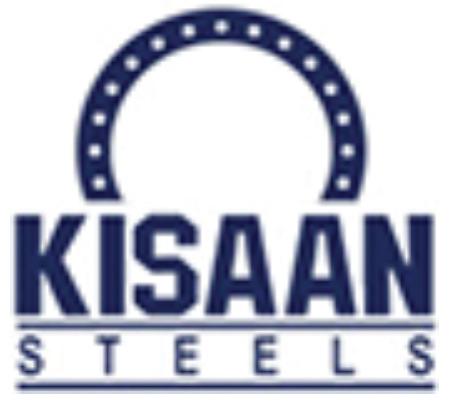
Wavin Vectus: Redefining the Pipeline
Infrastructure
Wavin Vectus is one of India's leading & fastest-growing manufacturers of pipes & fittings systems; water storage tanks for distribution and storage of drinking water; soil and waste discharge, rainwater and stormwater management for domestic, industrial, agricultural and commercial purposes. Backed by decades of stellar experience in the global and domestic markets, Wavin Vectus aims to bring unmatched expertise to India's customers. In an interaction with Tube & Pipe India, Mr. Manish Khandelwal, Commercial Director, Wavin Vectus, talks in detail about its joint venture with Vectus and the solutions provided by the Company.
Tube & Pipe India: Please give us an outline of the business journey of your company along with its crucial milestone.
Manish Khandelwal: Wavin Vectus is a joint venture formed in 2020. Wavin is a global company, which is in the market for the last six decades. In India, we entered in the 1960s with plastic pipes. Those were the times when cement pipes were there in the market and plastic was very new in India; hence, the market couldn't get accustomed to plastic pipes. The company had to wrap up the operations back then. In 2020, the market was mature for plastic pipes. The plastic pipe market was valued at around USD 7 billion and Indian players like Astral and Ashirvad were already the major players in this segment. Wavin reentered the Indian market with its entire product portfolio of aboveground and below-ground drainage and plumbing solutions. That’s when
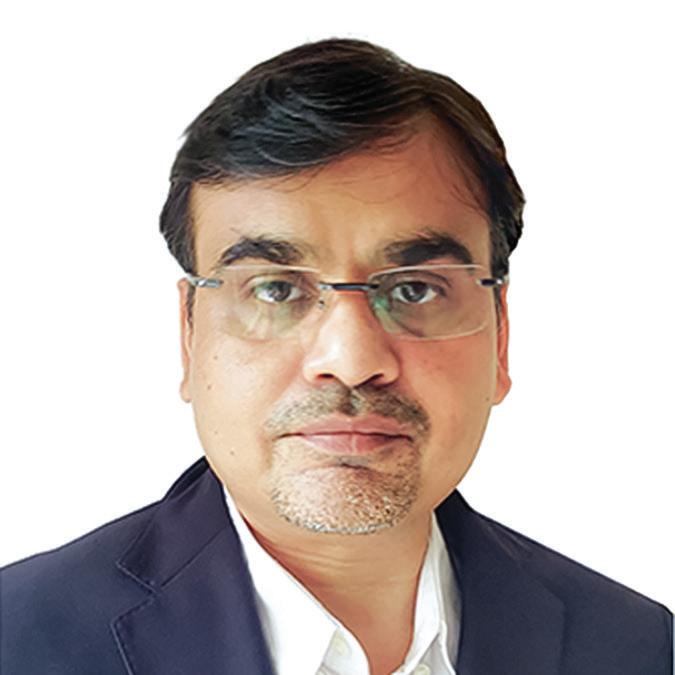
it formed a joint venture with Vectus, a three-decade-old company that is into the manufacturing of plastic storage tanks in blow mold and roto mold technologies.
TPI: Could you brief us on this strategic partnership? What will be the future plans?
MK: Synergizing the strengths of both, Wavin and Vectus want to create an Indian market powerhouse. Wavin’s global legacy spans numerous patents attained over decades with innovative solutions for water management, gas supply, heating and cooling, installed across continents. By leveraging these and Vectus’ pan-India footprint in retail and distribution and their cuttingedge technologies for polymer-based piping systems and water storage solutions, Wavin Vectus is the onestop solution provider for aboveground and below-ground pipes & fittings and water storage in India.
16 | INTERVIEW TUBE & PIPE INDIA • DEC - JAN 2023 www.tubepipeindia.com
We want to bring the combined experience and expertise of two of the biggest names in the segment. With our joint venture, we'll try to provide all the major technology and innovation to the Indian market on a mass level. Any product which is new in terms of technology and innovation is always placed in the premium segment. Our purpose is to bring those products to the masses so that it is fruitful for every part of society.
TPI: Please take us through some of the innovation-driven products of your company.
MK: In piping solutions, Wavin has low noise drainage solutions, which is first in its category and currently booming in the Indian market, especially in five-star hotels or hospitals where there is a need for silent spaces. Wavin has other innovative products such as Tigris K5/M5 which comes with an 'acoustic leak alert'. At the time of installation, while performing a pressure test with air, a whistling sound of 80 decibels can be heard loud and clear if there is any leakage. So these are some unique products that we are delivering in the Indian market.
TPI: Shed some light on the footprint of your company.
MK: Wavin Vectus has around 19 manufacturing units across India, starting from Jammu in the north to Trichy in the south and from Dahej in the west to Guwahati in the east. We have a presence in almost 26 states which is itself a sign of our production capabilities and the kind of market we serve.
Currently, we have around 35,000 retail counters, 5,000 distribution points, and a sales team of more than 400 people in all our verticals including project, government, and trade. We also have a design team for providing support to the architect and consultant through our product BIM Revit, which is software that helps enhance the accuracy of the design and planning of projects besides cost savings of around 15-20 percent.
TPI: How do you see the tube & pipe market evolving in the future?
MK: Around a decade back, CPVC was a new segment but today, there is a need in the market for more innovative solutions. All the leading players have entered into the flexible plumbing solutions and that is the future of the pipe market in India. Plastic holds several advantages and is more economical and userfriendly than GI pipes.
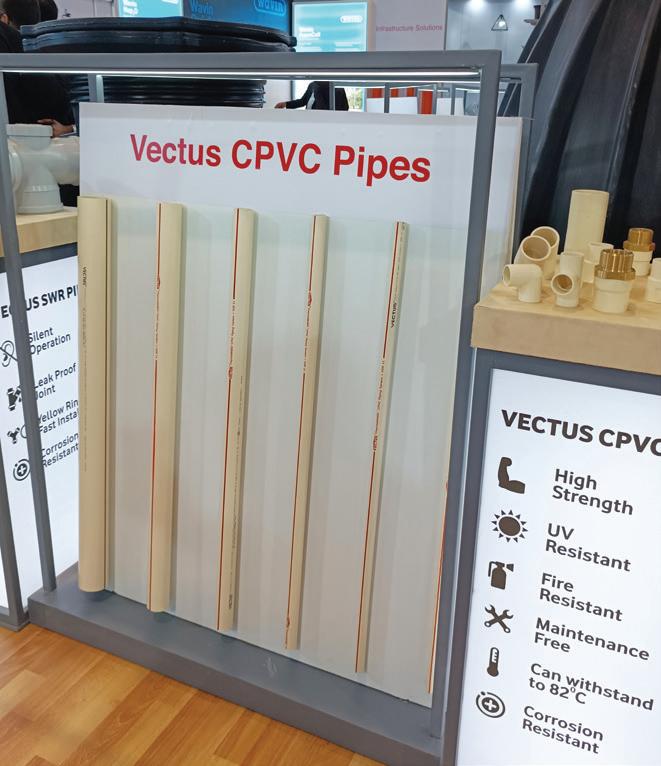
Wavin is a leading company in terms of technology and innovation. The first PVC pipe was invented by Wavin in the Netherlands back in the 1950s. More R&D is required for the Indian market. We will put together our learning & experience and try to provide solutions according to the need of the country. As India is a developing country, it will face the worst climate change challenges, in the next few years or in a decade. Hence, there is a need for a more robust infrastructure of plumbing and drain solutions. We are driving the industry to become more future-ready.
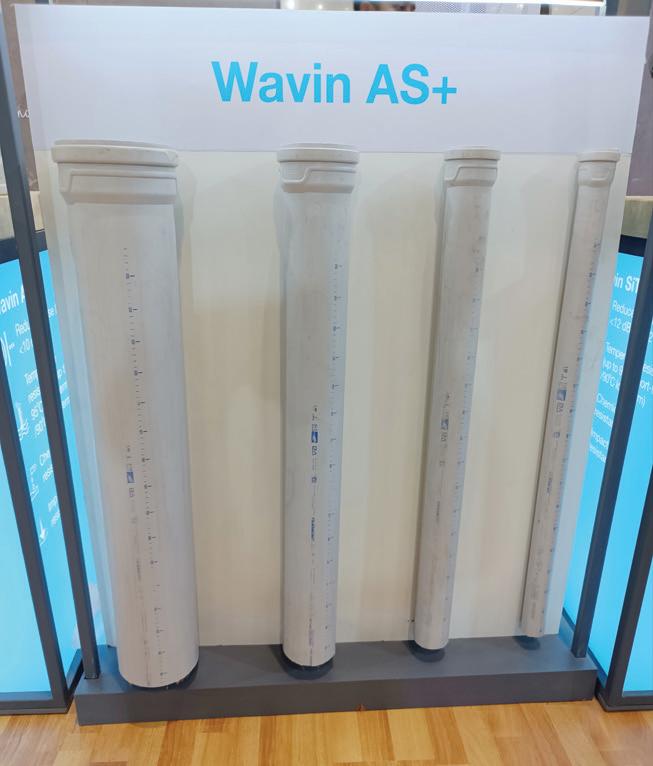
INTERVIEW | 17 www.tubepipeindia.com TUBE & PIPE INDIA • DEC - JAN 2023
“Wavin Vectus is the one-stop solution provider for above-ground and below-ground pipes & fittings and water storage… With our joint venture, we'll try to provide all the major technology and innovation to the Indian market on a mass level.”
BLM GROUP: Meeting Customer Needs with Greater Machine-Software Integration
BLM GROUP is one of the leading manufacturers of high precision and highperformance tube laser cutting and sawing machines, CNC bending and end-forming machines in the world. The company serves various industries such as automotive, aerospace, agriculture and home appliances among others. In a conversation with Tube & Pipe India, Mr. Maurizio Toselli, Sales Director BLM GROUP shares interesting insights about the company’s technology and Industry 4.0 solutions.

18 | INTERVIEW TUBE & PIPE INDIA • DEC - JAN 2023 www.tubepipeindia.com
Tube & Pipe India: Please present a brief overview of BLM Group, its specializations, and some notable accomplishments.
Maurizio Toselli: For more than 60 years, BLM GROUP has been contributing to the growing challenges in tube processing with its knowledge from bending to shaping, to laser cutting before and after the forming process, and disc cutting.
Over the years, BLM GROUP has increased its know-how with greater machine-software integration to meet our customers' needs with a wide range of products that fit into the production process of Industry 4.0. Our products have won the trust of customers, which is why today BLM GROUP has more than 800 employees worldwide. Many customers come back to us after buying one of our products, to purchase another product line, or to strengthen their machine fleet. This, for us, represents a source of great pride.
TPI: Please describe the product portfolio and key capabilities of the company – with regard to manufacturing and technological innovations, especially for the tube industry.
MT: BLM GROUP can offer its clients a machine fleet distinguished by technology:
Lasertube: We have 2D and 3D laser cutting systems for tubes, bars and profiles with diameters ranging from 12mm to 610mm and maximum lengths of 18m. It is a versatile solution that combines multiple machining operations in a single environment. This allows the customer to speed up the assembly through easier interlocking and fastening, reducing total processing costs.
3D Cutting Cells: We provide a 5-axis laser or robot laser cutting system for processing three-dimensional parts. Cutting cells can be equipped with robot manipulators to process curved or hydroformed tubes without manual repositioning - all to the benefit of precision and productivity.
Sheet laser cutting: These machines allow cutting sheet metal of any material (mild steel, stainless steel, aluminum, copper, brass) with different thicknesses. Sheet metal laser systems are designed for high performance, low maintenance and low energy costs, thanks to the fiber laser source of up to 12 kW and the sensorized cutting head.
Tube bending: It includes a wide range of bending machines: right and left bending in process, right bending or left bending machines capable of processing tubes up to 150 mm in diameter. Our tube benders take advantage of ‘All-Electric’ technology thanks to which they guarantee high repeatability and fast production changes. Simple to program, they can correct the tube’s elongation and springback during bending. In addition, they offer a real advantage in terms of production flexibility by being able to produce the first piece right at each production change.
Sawing: Our cutting systems integrate all the processing required for tube, solid, and profile machining and can be supplemented with fully automatic post-cutting solutions such as brushing, washing, measuring, and ordered collection.
Tube end-forming: They can be equipped with punches, rotary tools, and trimming or rolling systems that enable a wide variety of machining operations on straight or already bent pipes. These machines can create complex shapes while preserving the characteristics of the tube, without the necessity of welding two tubes together to create complex shapes.
Wire bending: Bending does not stop at tubes, but also expands to the wire, where we find single and doubleheaded machines capable of making complex shapes on parts of any length and machining not only from coil but also bars, plates, and armored resistors.
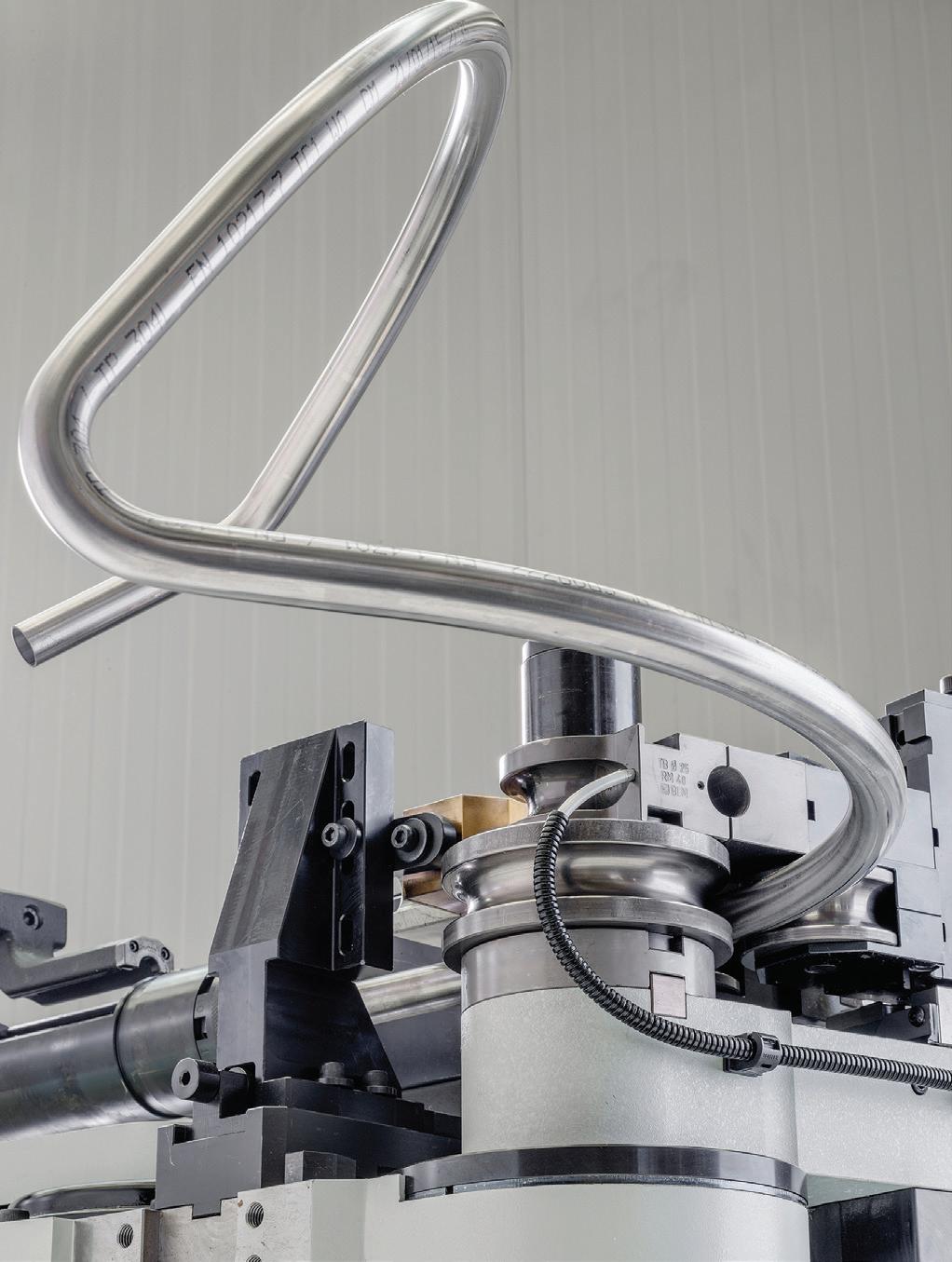
TPI: Being dedicated to developing, designing, manufacturing, and digitizing systems; please describe your focus on bringing value-creation to the tube & pipe industry through your technological solutions.
MT: All our machines are integrated with state-of-theart programming software, and each function has been developed with our customer's needs in mind: ease of use, interconnected machines, complex machining, and optimized management of their fleet. But there’s more! The machine-software integration allows the machines to be more efficient, for instance, by calculating in advance
INTERVIEW | 19 www.tubepipeindia.com TUBE & PIPE INDIA • DEC - JAN 2023
all the compensations to correct the effects that the tube will undergo in the different processing stages.
TPI: In what ways do you think industry 4.0 impacts the tube manufacturing industry with respect to innovation and achieving efficiency and productivity?
MT: Industry 4.0 is marking a turning point in the way machines are designed and used. For example, through our ProTube software, it is possible to create work programs in a single terminal and then distribute them to the various machines, or to manage production batches of various machines with greater freedom, moving them from one machine to another according to priorities.
The interconnection between machines and the client’s servers allows them to remotely monitor the progress of production batches and estimate production times. These are all functions that help our customers to have a complete overview of their plants.
TPI: Since manufacturing innovation is contingent on R&D, how do you view the significance of investing in this area to enhance the competitive advantage of a high-tech solution provider?
MT: Investing in research & development is vital for us because it allows us to stay one step ahead and bring more innovations to the market. We have done this in the past with the ‘All-In-One’ - a single point of management for the entire production process, for all tube processing. This reduces waiting time because the tube does not have to travel from one machine to another to get to the final processing. Every year we are implementing new functions, both for the machines and for the software, so we can meet even the most special requests that come in from our customers.
TPI: Please outline your views on the tube & pipe industry and the key trends which are driving the growth of this industry.
MT: There are many factors that are contributing to the growth of the tube & pipe industry, but the main remains cost benefit. In fact, steel tubes/pipes are increasingly gaining ground in various industries (from agricultural to structural) due to their strength, durability, and reduced production costs.
In the past, other types of material were preferred because pipe processing was slow and full of intermediate processes. It required several manual machines that produced semi-finished products to be handled or stored. This increased the cost of the finished product.
Bending, cutting, drilling, and beveling – just think how long it takes to complete all these processes and transport the tube from one machine to another! Now many of these operations can be done in the same machine, such as our Lasertubes, where you can cut, drill, and bevel the tube in the same machine. All automatically!
TPI: What is your outlook on the Indian market and your future plans?
MT: We have a solid presence in the Indian market, with customers that focus on high-end solutions because of the quality of processing of our machines, especially Lasertubes and tube bending machines. In the coming years, we expect that as the demand for quality products increases, more clients will demand our machines, as we have already seen happen in other markets.

20 | INTERVIEW TUBE & PIPE INDIA • DEC - JAN 2023 www.tubepipeindia.com
“Investing in research & development is vital for us because it allows us to stay one step ahead and bring more innovations to the market. We have done this in the past with the ‘All-In-One’ - a single point of management for the entire production process, for all tube processing.”
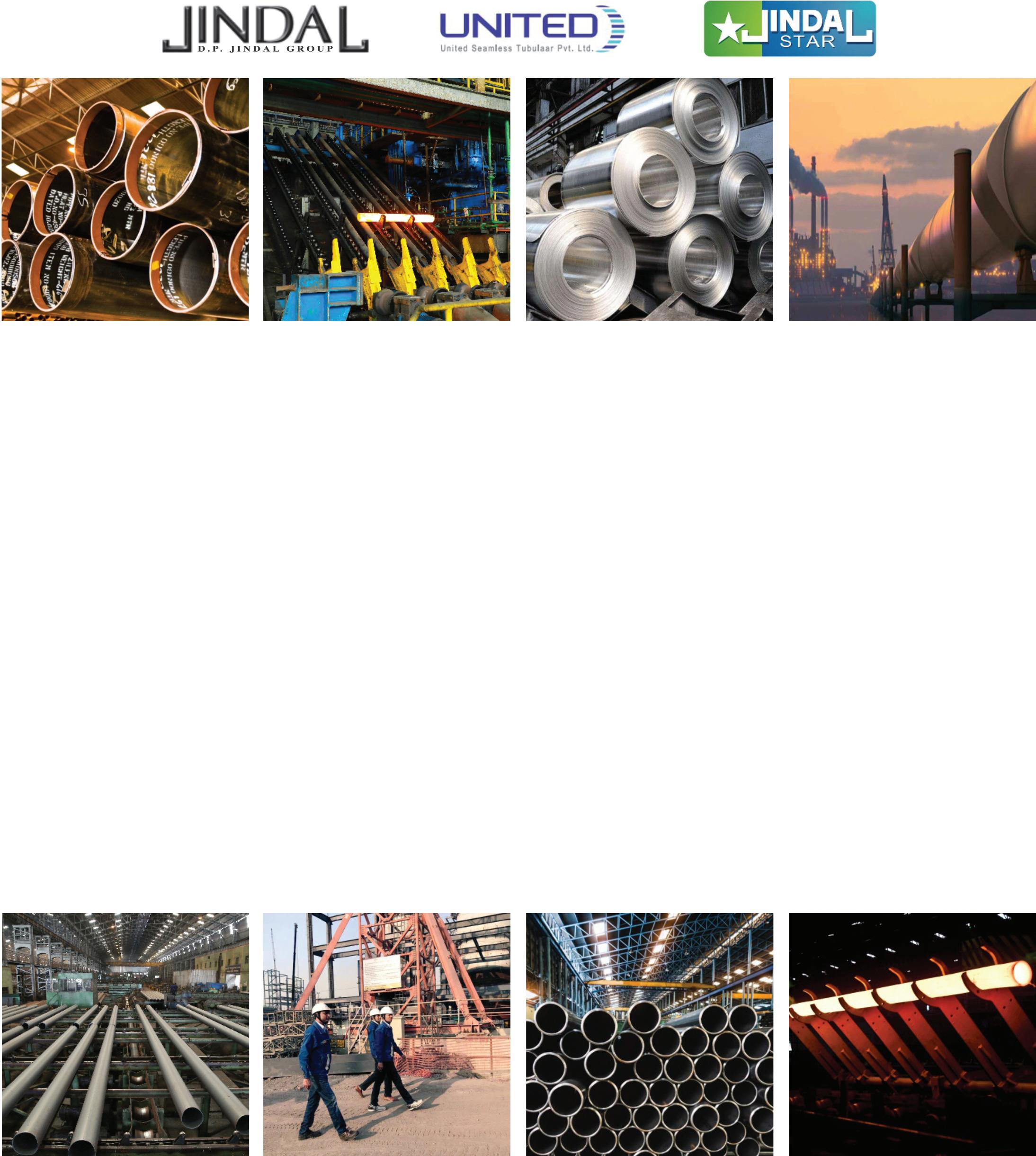
KPT Piping System to Come Up with a New Plant
Established in 2008, KPT Piping System is a producer of various kinds of piping solutions. The company has been involved in the manufacturing of PPR–C piping systems, pneumatic pipes, and thermal FR composite pipes. In a conversation with Tube & Pipe India, Mr. Ankur Periwal, Managing Director, KPT Piping System Pvt. Ltd. reveals the company’s journey and future roadmap.
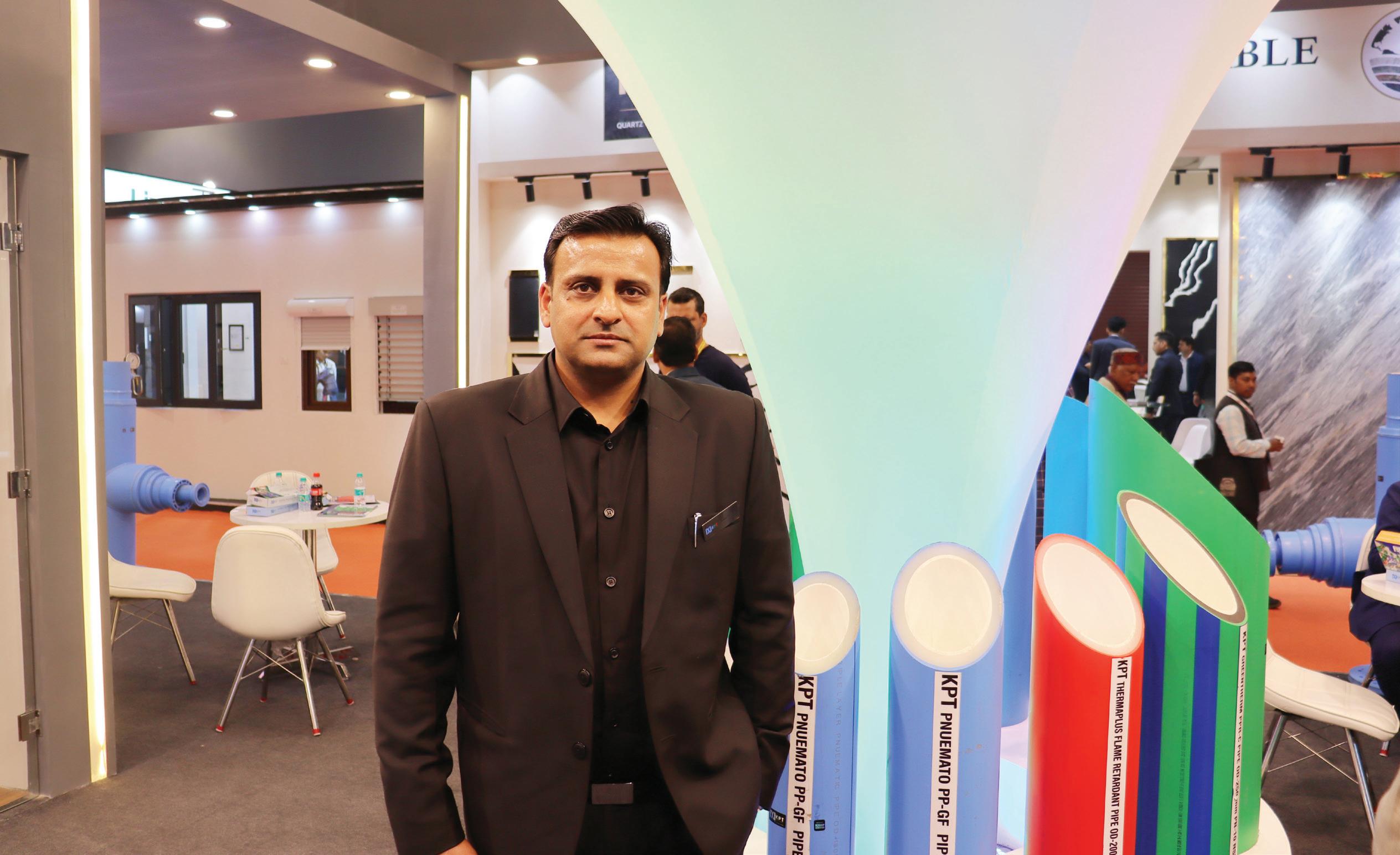
22 | INTERVIEW TUBE & PIPE INDIA • DEC - JAN 2023 www.tubepipeindia.com
Tube & Pipe India: Could you please give us a brief outline of the business journey of your company?
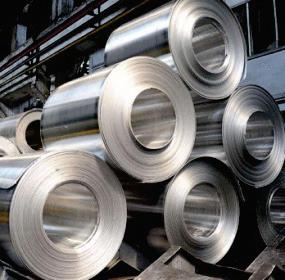

Ankur Periwal: KPT Pvt. Ltd. is one of India’s leading plastic pipe manufacturing companies. The company was formed in 2007 and started production in September 2008. Since then, we have been constantly improving ourselves, growing our business as well as enhancing our capabilities. It has been a very good journey for the last 15 years though there have been a lot of ups and downs. We are focusing on developing products as
per German standards while using raw materials from one of the best companies in the world, Hyosung Corporation, a Korean Industrial conglomerate. Through that, we are targeting various segments in the industry, where we can show our capabilities.
TPI: Kindly cast some light on the infrastructure and machinery installed in your facility. Are you planning any expansion in the coming years?

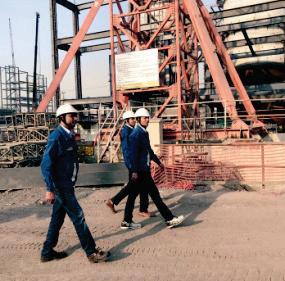
AP: As of now, we have five extruders and 21 injection molding machines. We are coming up with another plant in the same location
and we plan to enhance the capacity from the existing 400 metric tons to 800 metric tons. We would be doubling up the machines and ancillaries for PPR pipes and fittings, which will make us the largest player in the Indian subcontinent.
TPI: Tell us about your product portfolio along with its key strengths and applications.
AP: Our product portfolio primarily comprises PPR pipes and fittings. In PPR, we specialize in various categories such as pneumatic applications, chiller plants, RO water applications, and firefighting applications. We have all the
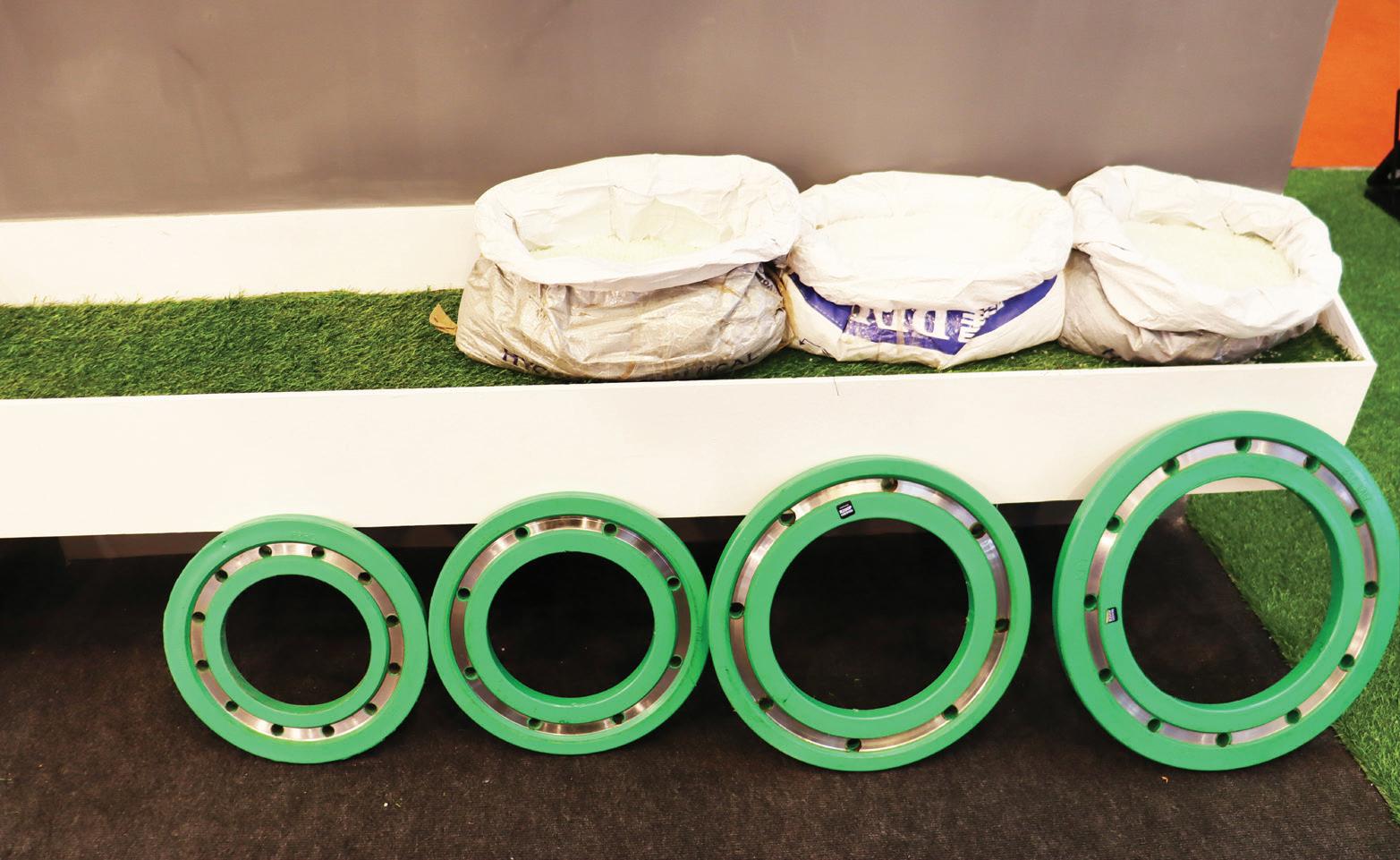
INTERVIEW | 23 www.tubepipeindia.com TUBE & PIPE INDIA • DEC - JAN 2023
“We would be doubling up the machines and ancillaries for PPR pipes and fittings, which will make us the largest player in the Indian subcontinent.”
MAHARASHTRA SEAMLESS LIMITED Oil & Gas Sector City Gas Distribution Hydro Carbon & Process Industry Boiler & Heat Exchangers Metro and Railways MEP Sewage & drainage System Automotive & Hydraulic Sector Structural Applications Subsea Line Pipes Manufacturers of Seamless, ERW with Coating Facilities at Nagothane & Mangaon, Maharashtra Size Range - OD : ½" to 20" (15 mm to 500 mm) with Wall Thickness ranging from 3 mm to 40 mm API 5L, 5CT, 5DP, IS / ISO : 3183, ASTM A-106, A-53, A-333, A-213, A-335, BS: 3059, IS 3589, IS 4271, EN standard. For Business Enquiry contact@mahaseam.com, mslmumbai@mahaseam.com MAHARASHTRA SEAMLESS LIMITED JINDAL CORPORATE CENTRE Plot No 30, Institutional Sector-44, Gurugram 122002, Haryana (India), Tel: +91-124-4624000 Applications Areas Of MSL Products OCTG
We are coming up with another plant in the same location and we plan to enhance the capacity from the existing 400 metric tonnes to 800 metric tonnes.
products related to PPR up to 450 mm. In the new plant, we plan to have PPR fittings up to 630 mm.
PPR pipe is comparatively expensive and a highly-specialized product that works best with chilled water and high-pressure applications. It has a thermal conductivity of only 0.24 W/mK, which is the best in the world. Secondly, PPR can withstand temperatures from -10 to 110 degrees. That is the kind of temperature variation which very few products in the piping industry can offer.
TPI: What are the recent developments and what will be your future plans?
AP: We have just opened an EPCbased company name KP FLUX ENGINEERS where we are going to provide turnkey solutions in PPR. With the expansion of capacity, our future plan is to grow in the market. Recently, we got NSF certification, which no other company in India has for PPR pipes and fittings. It is a very prestigious addition to our portfolio because we claim to be the best in the Indian market for PPR pipes and fittings. We are taking various international certifications to promote our product in the global market as well. The Indian market is at a very nascent stage at this moment. We are hoping to double
up the capacity and revenue within the next three years.
TPI: Please shed some light on the market footprint and clientele of your company. How do you foresee the market evolving in the near future?
AP: We have a 20-25% market share in the PPR piping industry. Predominantly we target the industrial segment; however, now, we are expanding to the residential segment as well. We are eyeing high-rise apartments and other applications like ETPs and STPs. Our product is performing very well in all these segments. Ultratech, TVS Group, Page Industries Ltd. Larsen & Toubro Ltd, and Shapoorji Pallonji And Company Pvt. Ltd. are some of our esteemed clients.
In the coming years, PPR is going to be a 'value-for-money' product in the piping market. India’s GDP is growing at 7% and we expect a similar growth rate for the next few years. With the world opening up post-COVID-19, I hope that the market would be in very good shape. As per our PM's vision, India is on its way to becoming a USD 5 trillion economy. To make it a reality, every industry needs to contribute and we are doing our bit.

24 | INTERVIEW TUBE & PIPE INDIA • DEC - JAN 2023 www.tubepipeindia.com
Mobile : +91 9910329829, Email: info@tulip3pmedia.in www.tulip3pmedia.in
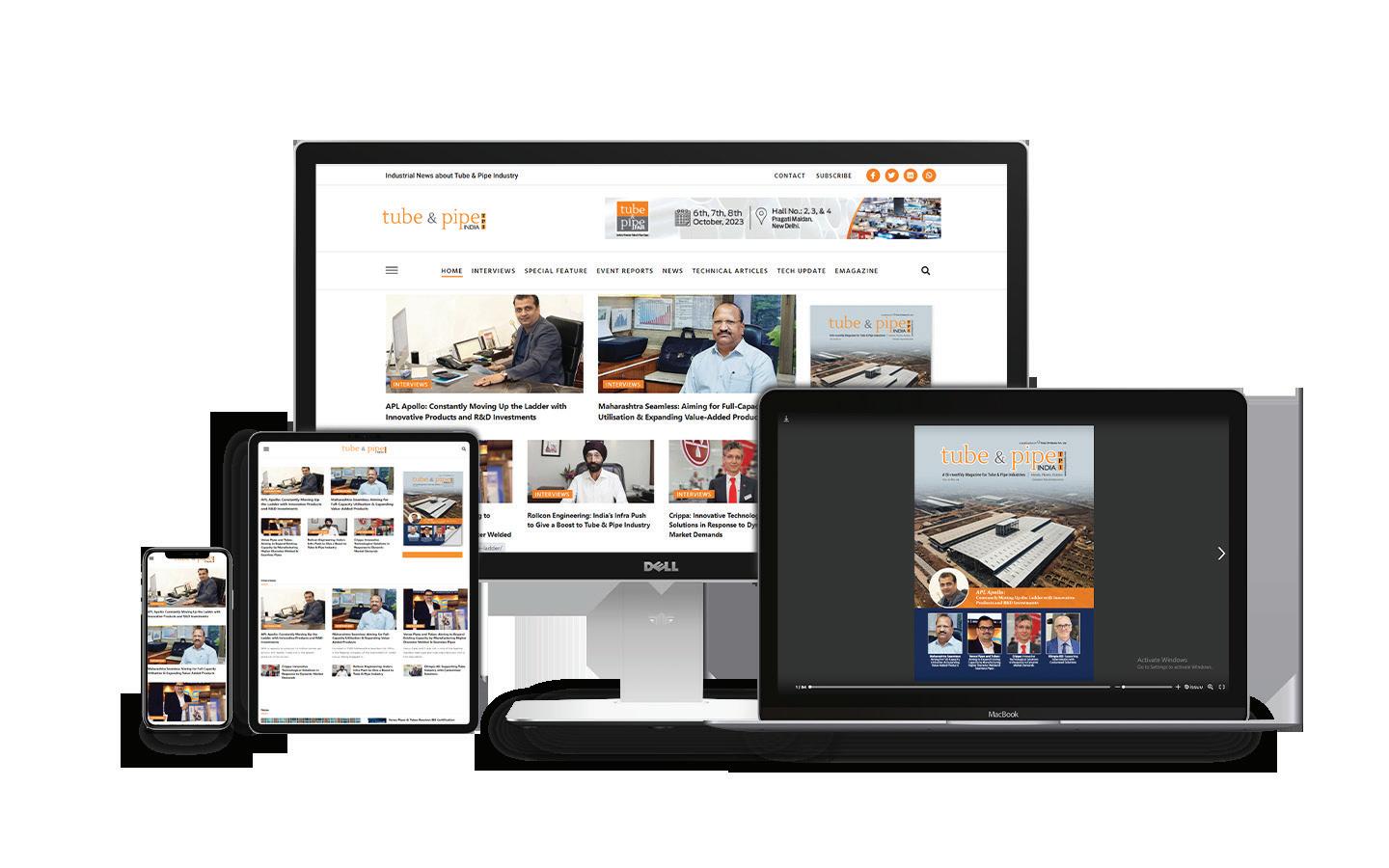
Most credible source of information for Indian Tube & Pipe Industry InterviewsSpecial FeatureTechnical Articles Event Reports News Demand DriversTech Update
3P Media Pvt Ltd
Tulip
Metals, Plastic, Rubber A Bi-monthly Magazine for Tube & Pipe Industries www.tubepipeindia.com tubepipeindia.com/emagazine
Wirex FZE to Foray into Seamless Pipe Segment
Wirex FZE has an established network of customers and suppliers and continually expands its ties to the manufacturers and customers active in different segments of the steel market. The company offers a wide range of steel products in various grades and specifications sourced globally from reputed mills. It is going to introduce seamless pipes very soon. In a conversation with Tube & Pipe India, Mr. Sivababu Manchineni, General Manager, Wirex FZE presents an overview of the company and shares more about the future plans.
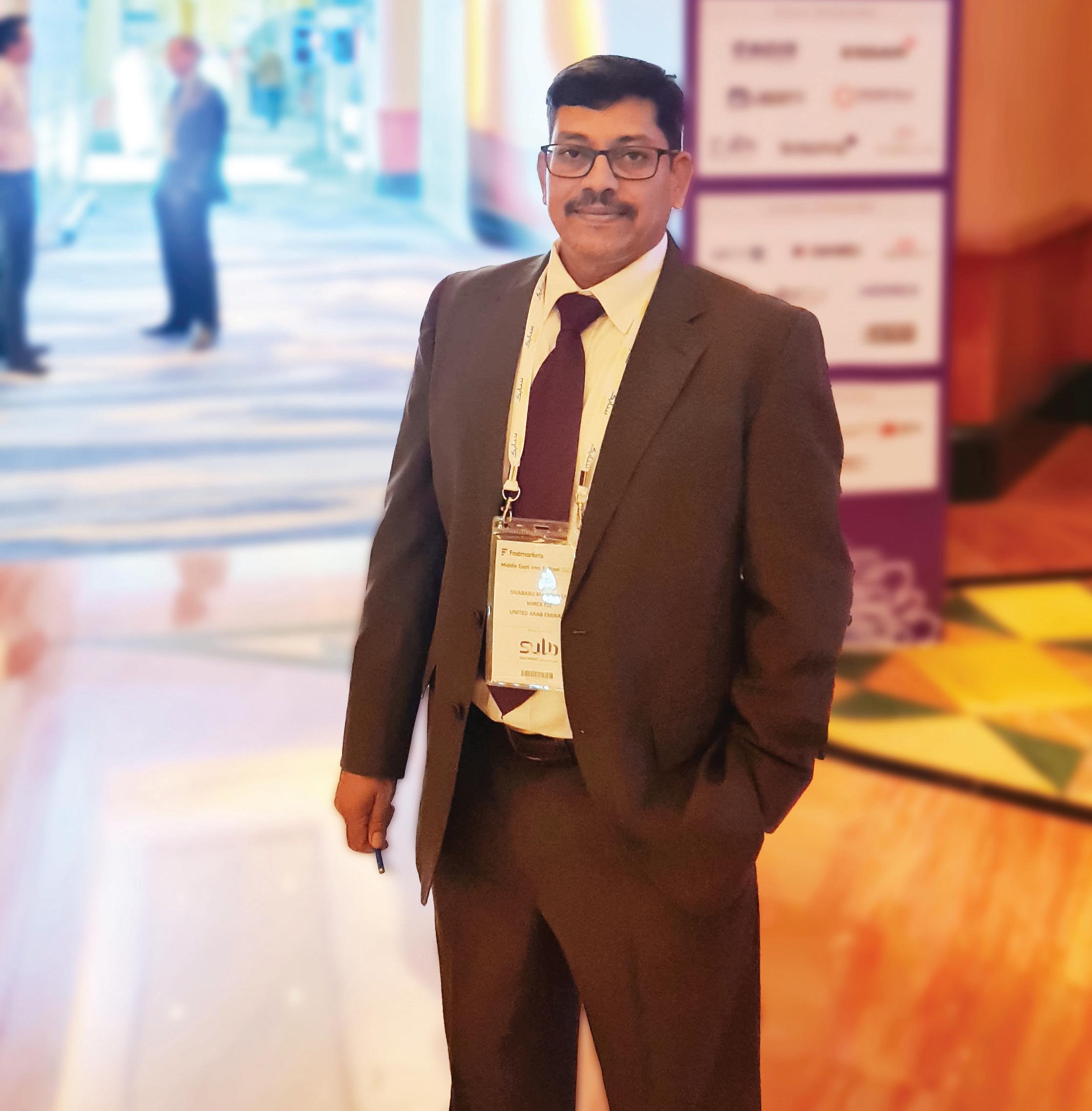
26 | INTERVIEW TUBE & PIPE INDIA • DEC - JAN 2023 www.tubepipeindia.com
Tube & Pipe India: Could you please give us a brief outline of your company?
Sivababu Manchineni: Wirex FZE is established in Jebel Ali Free Zone, Dubai with the objective of trading in a wide range of quality steel products. The basic idea for establishing the company in Dubai is the ease of doing business as we are able to cover the European as well as the Indian market from here. Our quality & experience can help the customer in getting the expertise and technical assistance.
We procure products from the Middle East as well as the Far East. The chemistry control and mechanical properties play a very critical role in manufacturing steel products. Most of our suppliers have integrated plants and use DRI along with the latest technology equipment for casting as well as rolling. This way, we support the customers in getting their quality standards met in all aspects.
TPI: Tell us about your product portfolio.
SM: Our product portfolio includes billets, rounds, rebars, special bar quality (SBQ) steel, and wire rods. We have billets available in various sizes, i.e. 150x150 mm, 180x180 mm and 220x220 mm as of now. The length ranges up to 12 mtr. We are also trying to increase our billet range to cover the blooms. In the future, we would be targeting blooms up to the size of 270 mm and the width of 380 mm and rounds up to 450 mm diameter. On the part of rolling, we have the capability to supply different sizes and can supply rolled round billets up to 200 diameter. In the rolled bar segment, especially SBQ grade, the range starts from 16 mm up to 80 mm. We are also going to have the material availability for the wire rod starting from 5.5 mm up to 16 mm. In the future, we will try to source our material up to 32 mm. We will soon come up with seamless pipes in our product portfolio.
TPI: What is the market footprint of your company?
SM: Currently, we have very wellknown clients from Thailand, Indonesia, Romania, Italy, and other European countries. We are a new company trying our best to make a mark in the market. Nevertheless, we have a very wide range of clientele who require low carbon and medium carbon steel products. We have aggressive targets and hope to come up with flying colours next year.
TPI: Please shed some light on the global market condition.
SM: The international market is getting fragmented into parts. Earlier, it was easier to understand the global market and come up with price predictions. But now, it has become very difficult due to the different dynamics in the market. Each market has a different situation - if you look at the European market, the energy crisis is a challenge. Similarly, Indian and Chinese markets have different issues altogether. Sometimes, the market gives the impression of going up but that does not happen. However, we are optimistic and hope that something positive would take place by the end of this year.
TPI: What are your thoughts on the future of the tube & pipe industry?
SM: Today’s energy crisis will shape a whole new tomorrow. Infrastructure is going to grow and we assume that wire and pipe industries are going to play a major role in that. With the import duties and export restrictions, every country is going to build its own infrastructure; hence, the market seems to be very dynamic.
‘Green steel’ is hailed as the next big thing; however, we will have to wait and see the economics of this segment. Meanwhile, we are primarily looking to expand our trading business in the Indian market. We have already started our process to bring material into India through BIS approval. I wish the Indian tube & pipe industry all the best for the future!
INTERVIEW | 27 www.tubepipeindia.com TUBE & PIPE INDIA • DEC - JAN 2023
"Today’s energy crisis will shape a whole new tomorrow. Infrastructure is going to grow and we assume that wire and pipe industries are going to play a major role in that."
Rukmini Polytubes Launches PVC Electrical Conduit Pipes
Rukmini Polytubes Pvt. Ltd. is one of the leading manufacturers of lead-free uPVC pressure pipes, casing pipes, column pipes, conduit pipes, plumbing pipes, and garden pipes. An ISO 9001-certified company, Rukmini Polytubes, operates a completely equipped in-house laboratory for testing and quality control. Along with PVC pipe manufacturing, the company also provides PVC resin, calcium carbonate and other related chemicals. In an interview with Tube & Pipe India magazine, Mr. Ajay Kejriwal, Director, Rukmini Polytubes Pvt. Ltd., talks about the company and its solutions for the industry, along with the recent developments, and the way ahead.

TUBE & PIPE INDIA • DEC - JAN 2023 www.tubepipeindia.com
28 | INTERVIEW
Tube & Pipe India: Could you please give us a brief outline of the business journey of your company along with its crucial milestones?
Ajay Kejriwal: Rukmini Polytubes, established in the year 2000, is one of the most reputable PVC pipe manufacturers in North India. Our aim to increase the quality of our inputs to get better outputs efficiently, made us start with importing the raw materials used in manufacturing our pipes. Currently, we are one of the leading Importers of PVC resin, calcium carbonate and other related chemicals used in PVC pipe manufacturing. The quality PVC pipes manufactured by us is the reason why we are trusted by everyone and have managed to create a loyal clientele base.
TPI: Kindly cast some light on the infrastructure, manufacturing capabilities, and machinery installed at your facility.
AK: Our manufacturing plant is located in Bahadurgarh, Haryana, close to the farmers’ fields, which helps us in having a good rapport and increased sales to the agriculture fields. Just like our products, our administration acts like a strong pioneer in our success.
Rukmini Pipes are produced in ultra-modern plants and machines maintaining high quality and meeting standard certifications
such as ISI, ASTM, ISO, etc.
Along with the production plants, Rukmini Polytubes also operates a completely equipped in-house laboratory for testing and quality control. Our company also supports environmental protection through the recycling of water by rainwater harvesting system. With skilled professionals backed up by market experts, our team aims to deliver the best.
products come in multiple sizes and thicknesses that can be easily installed. The easy and flexible setup of our products gives the option to adjust water flow and direction to suit your needs. We cater to various sectors such as agriculture, construction, industrial wastewater management, borewell, wire and cable protection, portable water supply and rainwater harvesting.
Few of the main strengths that Rukmini Pipes possess:-
• Economical: From market price to the installation and maintenance process, Rukmini Pipes are the best cost-effective options.
• Easy laying and joining: The Pipes are designed in a manner that the components can be assembled end to end very easily.
• Durable: Extra strong, long life, no maintenance and replacement cost.
TPI: Tell us about your product portfolio along with its key strengths and applications.
AK: Rukmini Polytubes is one of the leading manufacturers of lead-free uPVC pressure pipes, casing pipes, column pipes, conduit pipes, plumbing pipes, and garden pipes. Our products have a wide range of capabilities for optimum performance in the fields. These

• Leakproof: With close dimensional tolerance and precise design, our pipes are leakproof.
• Excellent Chemical Resistance: Non-corrosive; no concern of fungus and rust.
• 100% Lead-Free: Rukmini Pipes are environment friendly & cause no pollution.
INTERVIEW | 29 www.tubepipeindia.com TUBE & PIPE INDIA • DEC - JAN 2023
"Our goal is to produce unbeatable products, with outstanding qualities that are good for your establishment and also for the environment."
TPI: What are the recent developments at your end? Also, what will be your future plans?
AK: Rukmini Polytubes has recently launched PVC electrical conduit pipes with unbeatable packaging. Our conduits meet all the standards as per IS & BIS and possess all the other important features like fire resistance, high insulation resistance, easy wiring, etc. Our pipes are subjected to various tests to ensure durability & safety. Going ahead, our company is in the process of launching several new products in the coming months and we shall continue to improve the effectiveness of our quality management system. We are continuously conducting surveys, monitoring customer needs, and maintaining the services as per the latest results.
TPI: Please shed some light on the market footprint and clientele of your company along with the expansion plans.
AK: The company has a wellestablished association with varied dealers and distributors who assist in further sales of our products. Our company owns trucks/transport systems, and a devoted team of employees helps with the shipment of products to the set destination within the stipulated time frame. Apart from our distributor network, we are proud to serve our products in big projects of both government and private sectors. Currently, Rukmini is one of the leading brands in North
India but soon would expand its sales at the Pan-India level.
TPI: Share your outlook on the tube and pipe industry. How do you see the market evolving in the future?
AK: Growing demand for highspeed industrial, commercial and residential construction is anticipated to boost the growth in the global pipes market. Also, the need for wastewater management in industrial and municipal sectors is surging. This is resulting in governments spending hefty amounts on new pipeline installations.
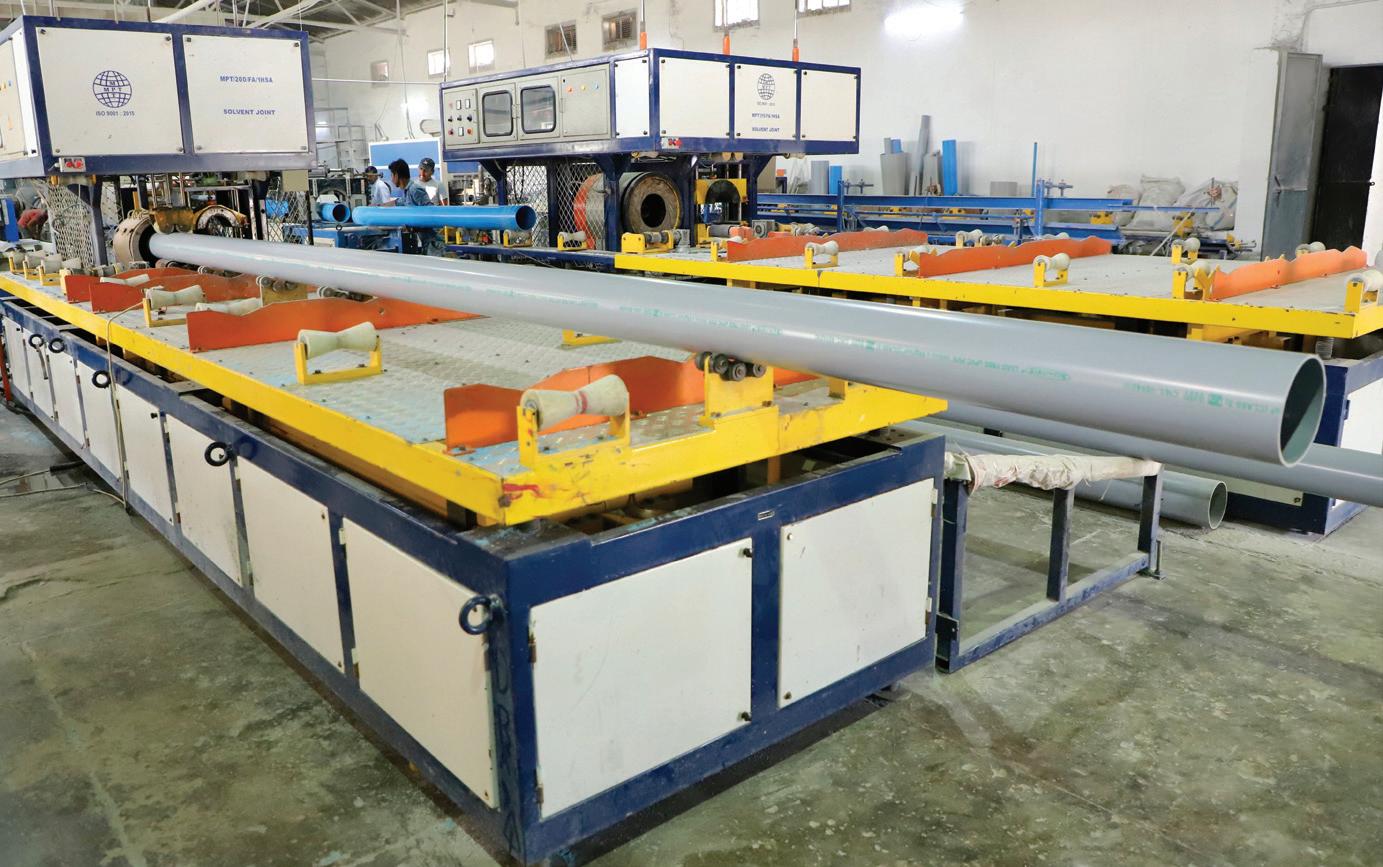
TPI: What is your technology and business roadmap?
AK: To ensure the best production, we have installed ultra-modern plants and machinery, maintaining high-quality products. Along with it, we also have a quality center/lab and a dedicated team of professionals for improved production. Keeping in mind the diversity of needs, at Rukmini, we are committed to delivering a series of strong products that can endure the sustenance of any demand.
It is our commitment to building sustainable relationships with customers through stability in product quality, unparalleled customer service, and an exceptional understanding of our customer’s needs that makes our brand outstanding.
30 | INTERVIEW TUBE & PIPE INDIA • DEC - JAN 2023 www.tubepipeindia.com
"The elevation in our growth rate is owing to our good business ethics, dedication towards our work, and maintaining trustworthy strategic relationships with clients, both domestic as well as international."
The print version of the magazine is supported by an e-magazine. The fully interactive digital edition makes it possible to read the magazine anytime, anywhere globally and hence, delivers enhanced value for the advertisers. Each issue is posted online and past issuesarearchivedonthesite.
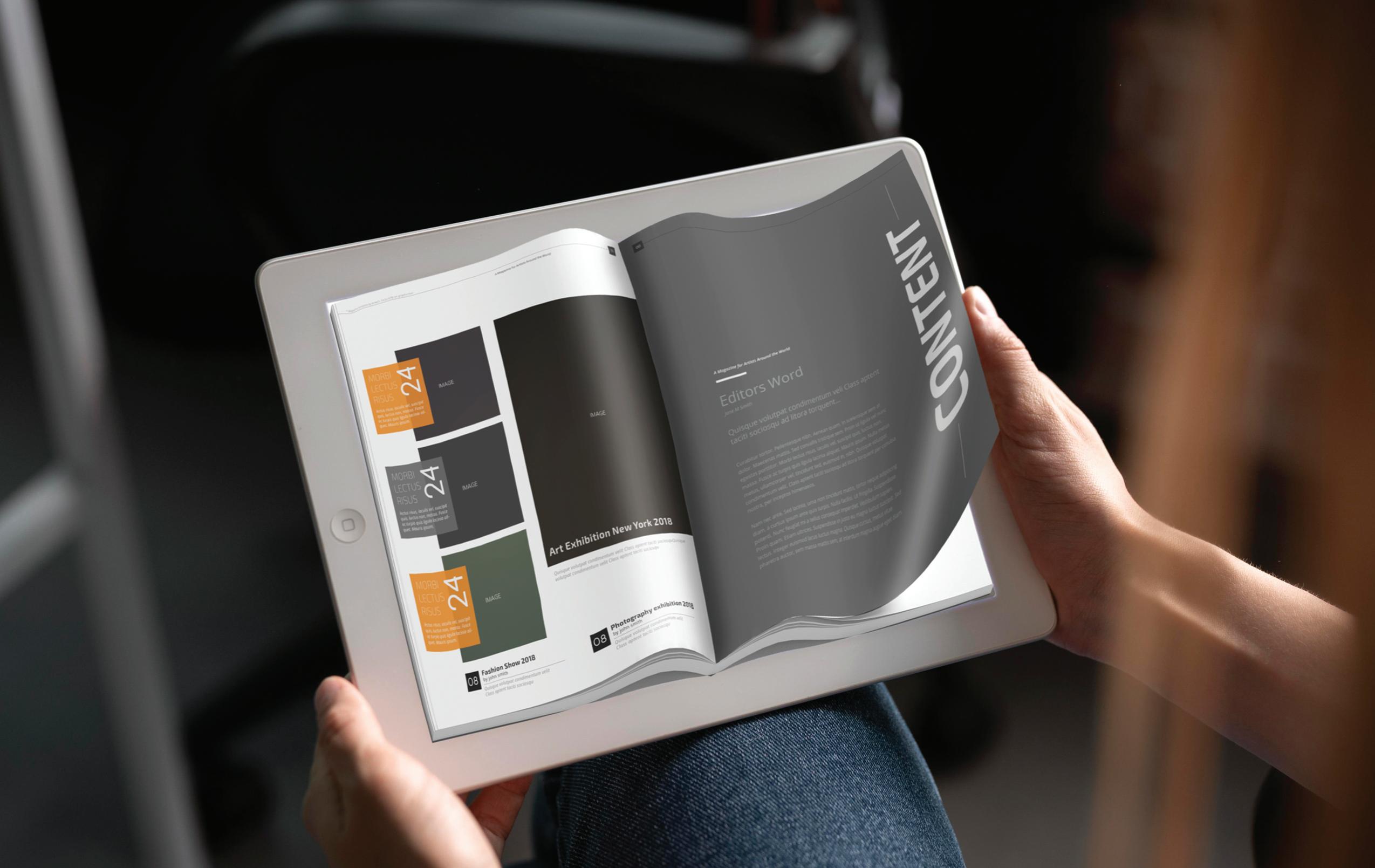
Tulip 3P Media Pvt Ltd
Mobile : +91 9910329829, Email: info@tulip3pmedia.in www.tulip3pmedia.in
Your Digital Gateway to Tube & Pipe Industry Metals, Plastic, Rubber A Bi-monthly Magazine for Tube & Pipe Industries www.tubepipeindia.com tubepipeindia.com/emagazine
Ferron Tubes: Constantly on the Edge of Innovation
Born under the aegis of New Hindustan Tubes Pvt. Ltd., Ferron Tubes Pvt. Ltd. was created with the core idea of expanding to bigger horizons. With a vision to target newer industries that require steel pipes and tubes and its by-products, Ferron is a step towards adapting to new technology and methodologies of steel production and providing quality products. In a conversation with Tube & Pipe India, Mr. Danish Chakarwarty, Managing Director, Ferron Tubes Pvt. Ltd. talks in detail about the journey and philosophy of the company.
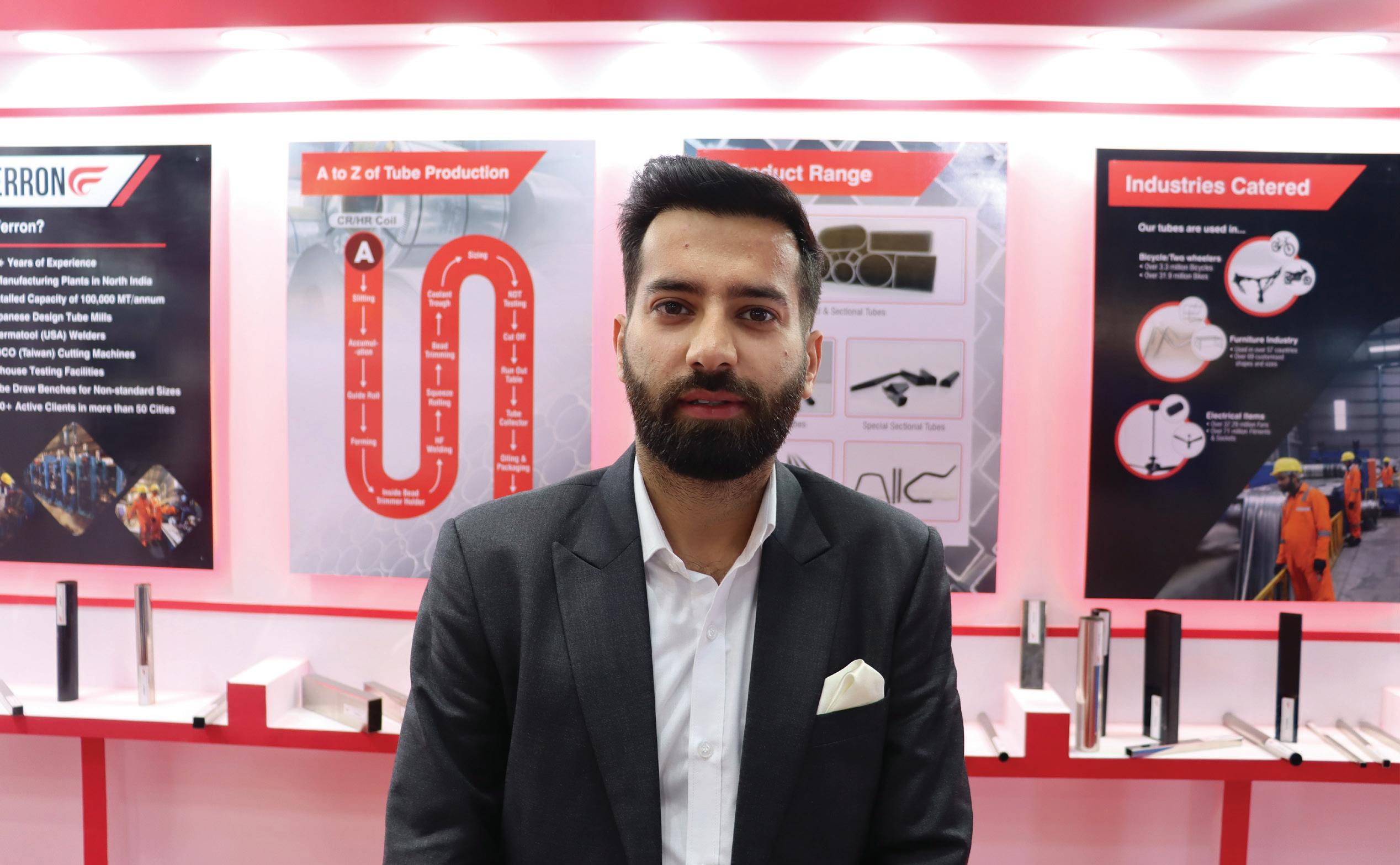
32 | INTERVIEW TUBE & PIPE INDIA • DEC - JAN 2023 www.tubepipeindia.com
Tube & Pipe India: Could you please give us a brief outline of the business journey of your company along with its crucial milestones?
Danish Chakarwarty: We started Ferron, as a part of New Hindustan Tubes Pvt. Ltd., which was started by my father in the 1980s. Ferron was established in 2014 in Palwal with one manufacturing plant. Primarily, we are into ERW steel tubes for the precision auto components, the furniture industry, and the general segment, which uses the CR tube.
The company was started with the intention to supply products to our group companies. However, we saw the huge potential in the market and started exploring more. In 2019, we tripled our capacity. Now, we produce around 3000 tonnes a month. Besides supplying to companies and traders across the country, we also export some of our products.
In 2021, we set up another unit with backward integration of slitting and processing and forward integration of tube drawing. This year, we have extensively started focusing on newer markets. We exhibited in Tube Düsseldorf and Tube India for the first time. We are extensively working in the EV market as well as exploring new markets through these exhibitions. We are one of the largest e-rickshaw tube manufacturers in North India.
TPI: Kindly cast some light on the machinery installed at your facility.
DC: The machinery we have is based on Japanese designs, but manufactured in India by a local supplier. The welders are from US-based Inductotherm Group’s Ahmedabad plant. Inductotherm Group is the pioneer of welders in the tube industry. Along with that, we have cutting, bending and chamfering machines from SOCO Machinery Co. Ltd., a machinery supplier in Taiwan. We have slitting machines from Rollform Equipment Pvt. Ltd., Ghaziabad. Apart from that, we have a lot of other small machines.
TPI: Tell us about your product portfolio along with its applications and the clientele it serves.
DC: We cater to the automotive two-wheelers, four-wheelers, rickshaws, bicycles, furniture, and a lot of industrial equipment trade segments. The industry is massive - I come across a new use of a precision tube every six months. We have supplied to industries varying from toy manufacturers to car manufacturers. The USP of our company is that we focus on customization. E-rickshaw constitutes almost 30 percent of our business. We were the pioneers in developing special section tubes on an in-house rolling mill. These tubes are used in the frames of rickshaws and we were the first to supply them to major e-rickshaw manufacturers. We recently developed a special section tube for a customer in India who is exporting it to South Africa. With that product, the cost to our end customer was 30 percent less which, in a steel segment, is a huge margin. We believe in value addition. We are the single supplier of tubular part for a Honda four-wheeler model.
TPI: What are your strategies to create value for your customers?
DC: One needs to add value to the customers, not only by providing good quality products at low prices but also by saving the cost that the customers do not see. We recently decreased the inventory cycles of our traders in Delhi from 15 days to 7 days just by doing some alterations in the supply chain. If we see it on paper, they were able to save a few crore rupees.
Our clients have been very supportive. Recently I met one of our customers at the EV expo, they are very hopeful for the growth of e-rickshaws, and they want us to dedicate a couple of lines exclusively to the e-rickshaw segment. We have always listened to our customer’s needs and demands. And that is why we've been able to grow at such a rapid pace in the past seven years.
INTERVIEW | 33 www.tubepipeindia.com TUBE & PIPE INDIA • DEC - JAN 2023
“The demand for tubes is growing not only in India but the entire Asian market… I see enormous potential and we aim to become one of the largest steel tube producers in the country.”
TPI: What are the recent developments and what will be your future plans?
DC: In 2021, we started our second unit with slitting machines, mostly to cater to our own needs. However, we have a full-fledged processing center and we do a lot of processing for other companies too. We have 8,000 tonnes of installed capacity per month.
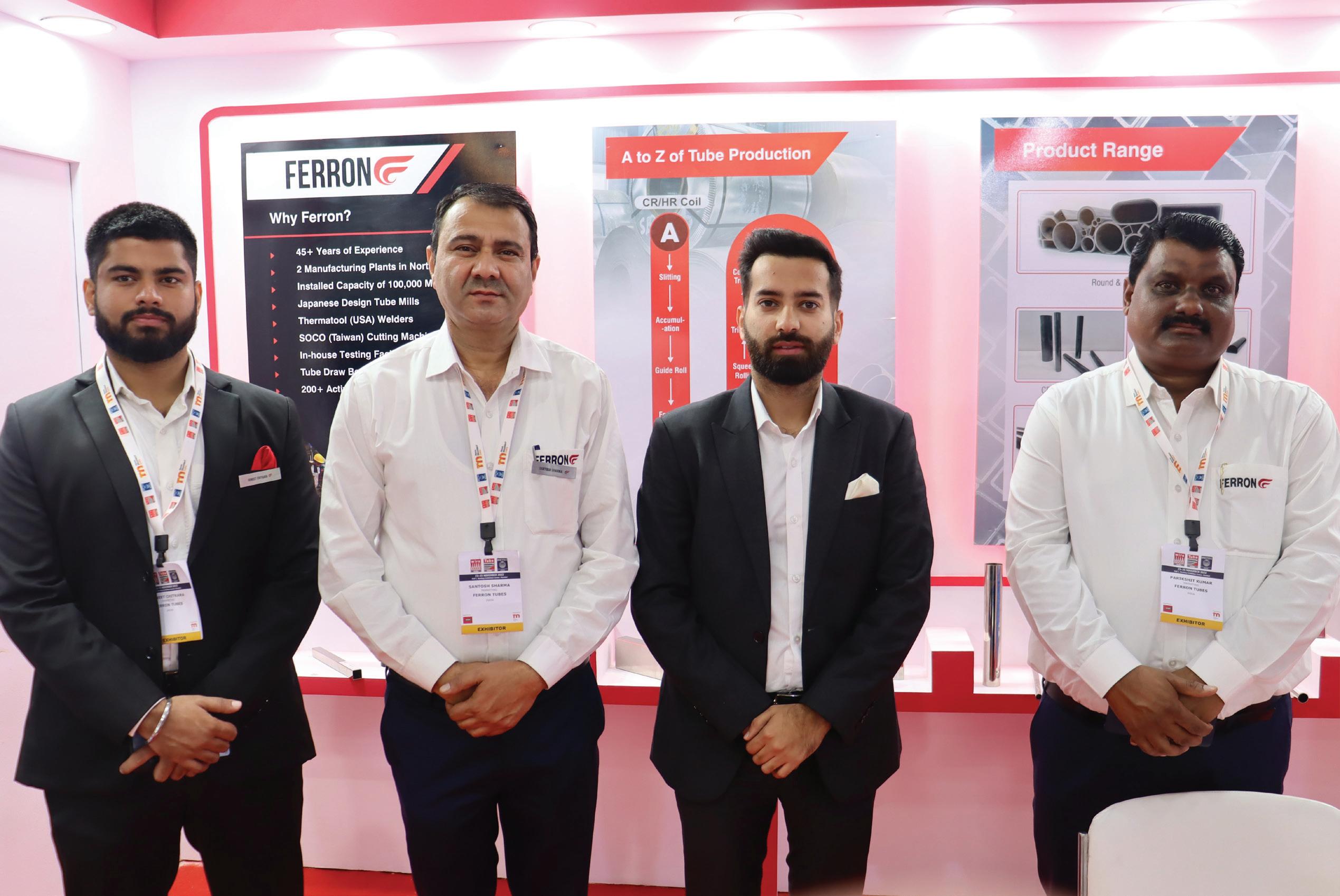
In the past year, we ventured into auto parts components. Earlier, customers were procuring tubes from us and sending them out for job work. Now, we have become a one-stop solution for a lot of companies who require a minor value-addition on the tube so that they don't have to pay for the logistics and inventories at different places. Nevertheless, our major focus remains on the ERW segment. We have been working on a lot of improvements, and efficiencies this year in the tube mills. We have installed NDTs which are now an industry standard for tube testing. We have hired a few consultants since July who drastically helped us achieve our goals more efficiently and bring our costs down.
We are rapidly looking for newer technologies. We would also be adding another plant by next year to increase the production as well as value-addition. With this, we plan to expand not just the capacity but also the range of tubes that we make right now.
TPI: Since you have been in the industry for the last few years, how do you see the market evolving in the future?
DC: The sky is the limit! The tubing market is like an endless well. We started with a very small aim, but once we entered the industry, we saw the huge potential to grow. According to various statistics, the demand for tubes is growing not only in India but the entire Asian market. A lot of people are moving from SS to cold-rolled tubes. Many companies are moving from hotrolled to cold-rolled processes to improve quality. Cold-rolled cannot become as huge as the hot-rolled pipe market; however, this niche segment, in itself, has a huge market. I see enormous potential in the future and we aim to become one of the largest steel tube producers in the country.
TUBE & PIPE INDIA • DEC - JAN 2023 www.tubepipeindia.com
“We have been working on a lot of improvements, and efficiencies this year in the tube mills… We would also be adding another plant by next year to increase the production as well as value-addition.”


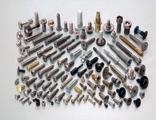
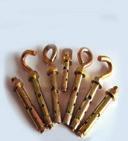
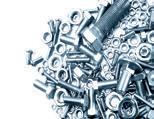
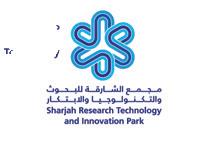
Chemical Process Piping: Developing Composite Product Combinations for Critical Applications
Chemical Process Piping (CPP) is the pioneer and market leader in the field of design, manufacture & erection of Glassfiber Reinforced Plastic (GRP), Glassfiber Reinforced Epoxy (GRE) and Thermoplastic lined GRP pipes and equipment in India, serving the industry for over the last six decades. Its products have reached several foreign shores including the USA, Germany, Singapore, France, Finland, Spain, etc. The company is the recipient of the ‘Top Exporter Award’ for GRP products from the Plastics Export Promotion Council sponsored by the Ministry of Commerce and Industry for over ten years in a row. In an Interview with Tube & Pipe India, Mr. Vijay Rajpurohit, Managing Director, Chemical Process Piping Pvt. Ltd. talks in detail about the solutions provided by the Company.
Tube & Pipe India: Could you please give us a brief outline of the business journey of CPP along with its crucial milestones?
Vijay Rajpurohit: Chemical Process Piping (CPP) was formed in 2005 after the parent company Chemical Process Equipment (CPE) demerged its piping business. Since its inception, CPP has been focused on breaking into new markets in varied geographies across the globe. While maintaining our lead in the chemical industry, CPP has made a mark in the global desalination, power, water, oil & gas markets with projects in various countries including Singapore, Australia and Chile. We are the largest exporter of FRP products in India. With the ongoing domestic and international projects, CPP is eyeing to reach INR 300 crore annual turnover by 2024 which is the first in the FRP sector for a pureplay FRP piping company. We work with the top EPC and technology companies in the markets in which we operate.
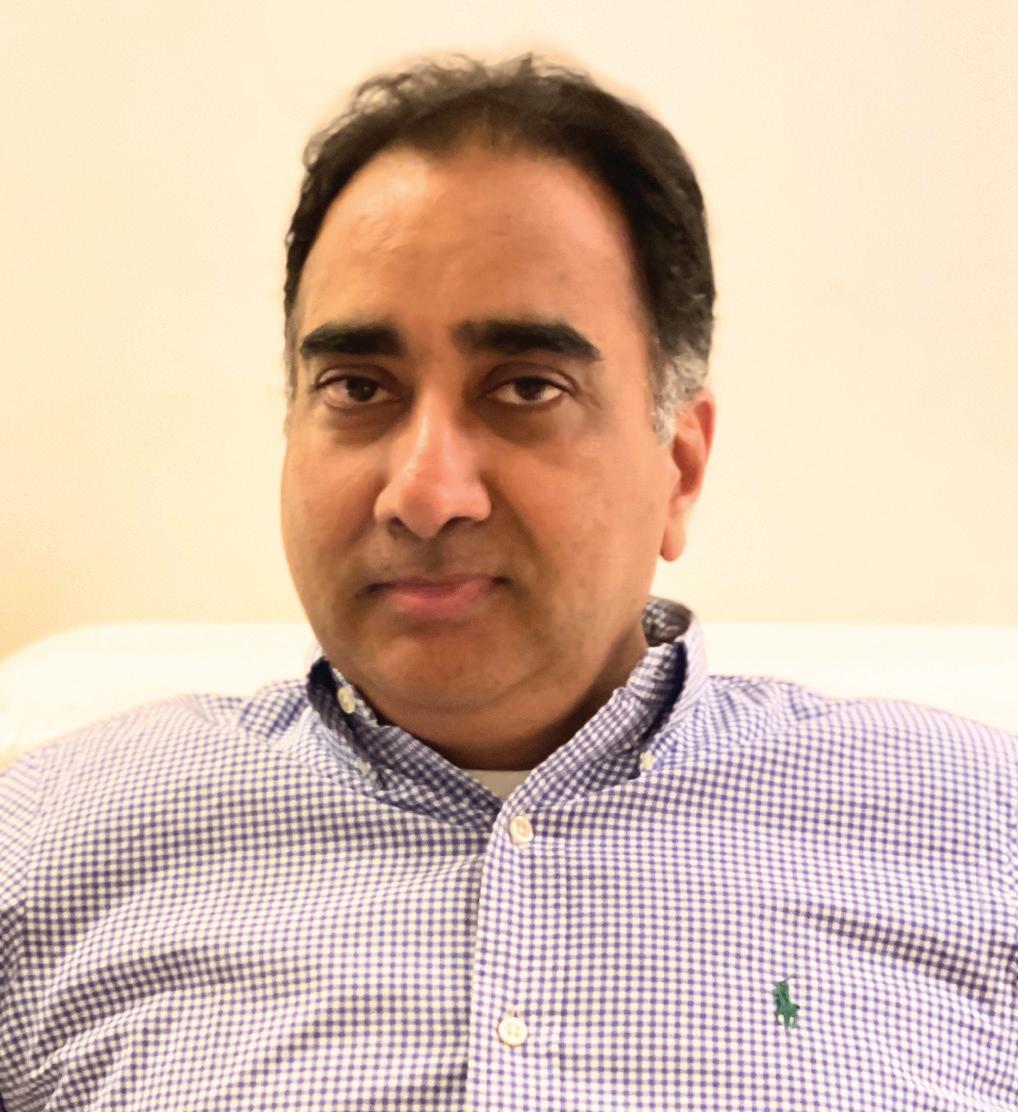
36 | INTERVIEW TUBE & PIPE INDIA • DEC - JAN 2023 www.tubepipeindia.com
CPP has several firsts to its name, like installing a 50 km fire water network for Petronas and installing the largest FRP cooling water line for a nickel mine in Caledonia. As market leaders in GRP, FRP, and GRE for close to six decades, CPP’s market share for FRP piping in Chlor-Alkali membrane cell plants is over 90 percent in India. Similarly, for the Soda ash plants, it is over 80 percent market share. Further, the company has supplied FRP piping to over 25 desalination plants globally. The chemical industry contributes 40 percent of its revenues while the rest of the markets bring in the remaining 60 percent in aggregate. Chemical Process Piping, is today one of the global leaders in the field of design, manufacture and installation of FRP, GRE and thermoplastic lined FRP pipes and fittings.
TPI: Kindly cast some light on the infrastructure, manufacturing capabilities, and machinery installed at your facility.
VR: With a large manufacturing base in Vadodara and Khopoli, CPP has the capacity to produce over 22000 Metric Tonnes of FRP piping per annum. With state-ofthe-art machines and technology, filament winding to 8 meters diameter pipes can be done efficiently. Our R&D facility is equipped with the latest testing equipment that helps with product development and to create a durable final product. We have developed high-strength laminates that can sustain very high pressures created in manufacturing plants.
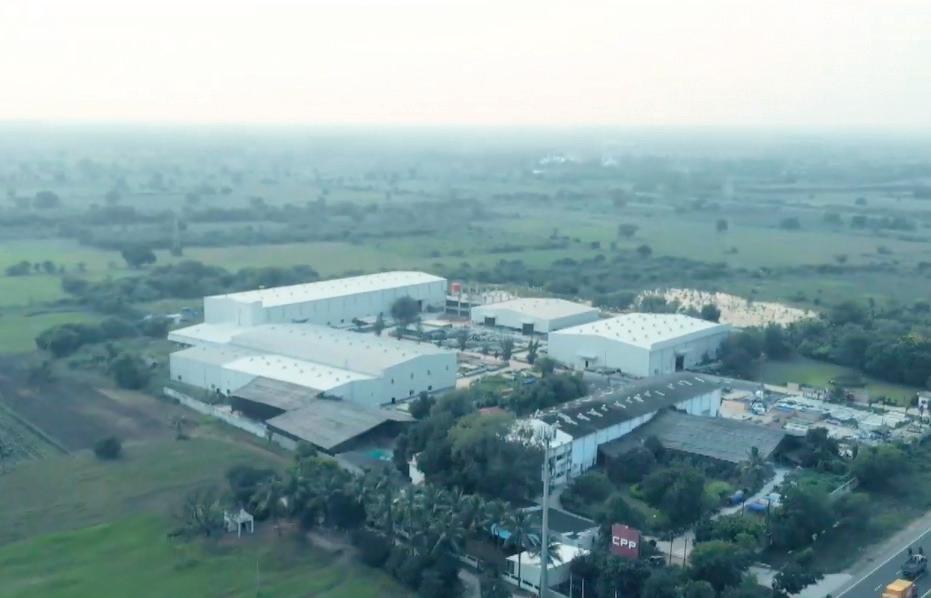
TPI: Tell us about your product portfolio along with its key strengths and applications.
VR: CPP products include pipes, fittings, stacks, headers, and ducts. The sizes range from 25 mm dia. to 8000 mm dia. With the capacity of handling pressure up to 60 bars and temperatures till around 200°C, we are wellequipped to serve a wide range of industries from power to desalination.
We develop pipes that can handle wet chlorine gas, hydrogen, SO2, H2S, seawater, DM water, wastewater, HCl, H2SO4, phosphoric acid, NaOH and many more.
TPI: Please shed some light on the market footprint and clientele of CPP.
VR: We serve several key industries like chemical, desalination, power, water, oil & gas industries in India, Southeast Asia, the Middle East, Europe and South America. Our clients include Tata Group, ThyssenKrupp, GE, Siemens, Doosan, Hyundai, IDE, Suez, Aditya Birla Group, GACL, Nirma, and DCM amongst many others. The company has successfully completed phase I of this Maitree Super Thermal Power Plant project with BHEL and Simplex in Bangladesh. Chemical Process Piping becomes the first mover in the segment to achieve this feat of building an 800ft FRP stack for a 1,320MW coalfired power station in Rampal, Bangladesh. CPP is the first FRP manufacturer in this part of the world to utilise vertical winding technology to filament wind the FRP stack for their project in Bangladesh. The project is an environmentally friendly supercritical technology-based thermal power plant.
TPI: Share your outlook on the FRP piping market in India. How do you plan to tap the market in the future?
VR: The FRP piping market is slowly catching up and has a huge potential to grow in the next 10 years. With new industry segments opening up for usage of FRP, CPP is looking forward to the upcoming years as these are going to be exciting times for the industry in terms of new product development, innovation and opening of new markets for FRP.
Targeting an average annual growth of 15 percent, CPP will continue to be the market leader in India and be one of the top 3 piping solutions providers globally.
TPI: What is your technology and business roadmap?
VR: CPP has been experimenting with newer composite materials which can be used to make FRP pipes for commercial usage. Several combinations have worked for different industry segments like power, desalination, energy, etc. With our in-house R&D centre, we are developing composite product combinations for critical applications in new segments like defence, nuclear, and green energy.
INTERVIEW | 37 www.tubepipeindia.com TUBE & PIPE INDIA • DEC - JAN 2023
“With the ongoing domestic and international projects, CPP is eyeing to reach INR 300 crore annual turnover by 2024 which is first in the FRP sector for a pure-play FRP piping company.”
Schwarze-Robitec: Technology Partner for Tailor-Made, Powerful and Future-Proof Tube Bending Machines
With passion, inventiveness, and more than 115 years of experience, Schwarze-Robitec develops unique and innovative products for tube bending solutions. The company has been synonymous with technical progress and quality in every respect for decades. In a conversation with Tube & Pipe India, Ms. Heike Ahlers, Vice President - Sales & Marketing, Schwarze-Robitec GmbH, talks about the company’s manufacturing capabilities, product range, and market presence in India.
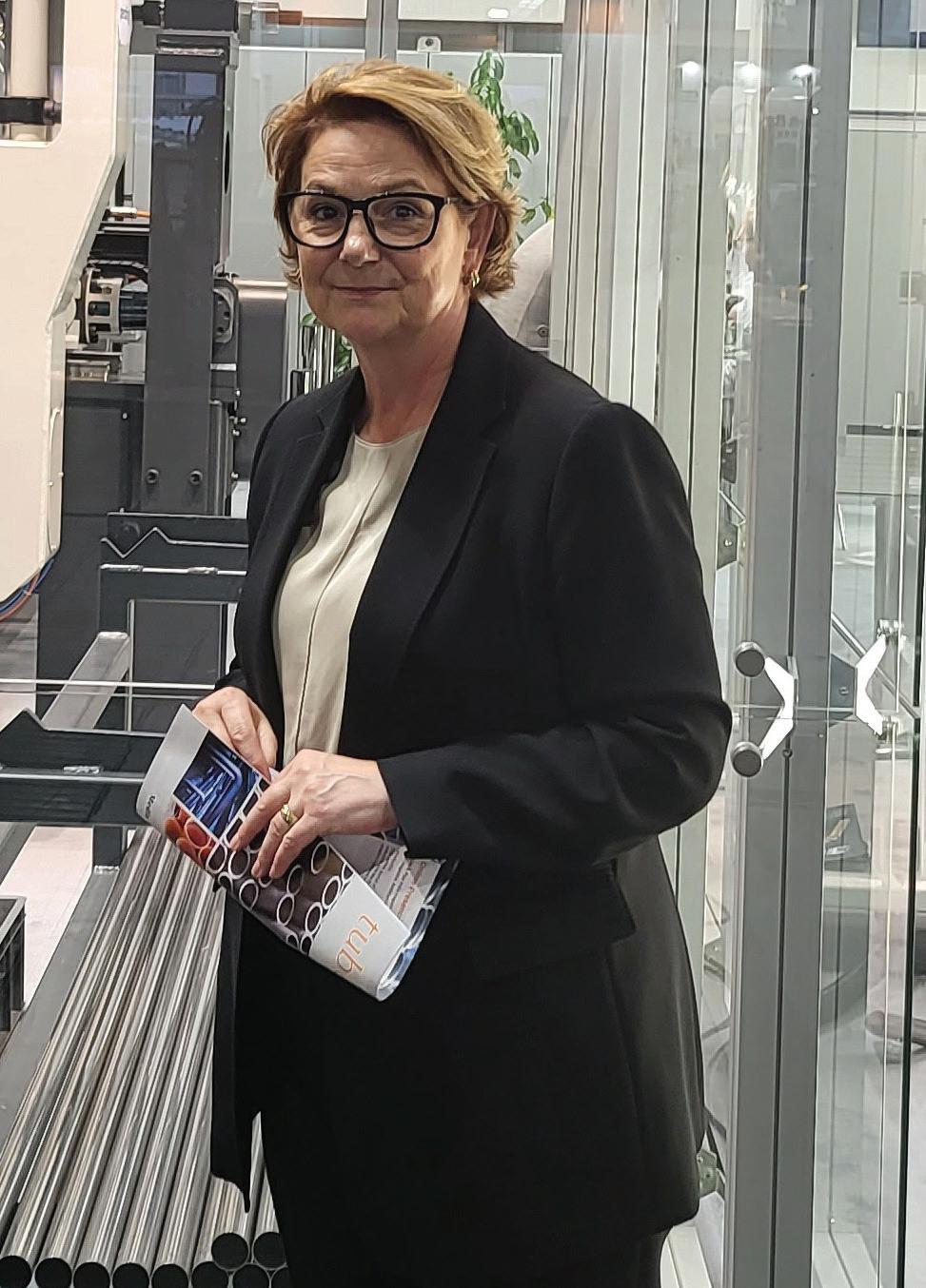
Tube & Pipe India: Please tell us about your company.
Heike Ahlers: Schwarze-Robitec is a tube bending machine manufacturer. Founded in 1903, we have been specializing in tube bending since the 1950s. We call ourselves specialists in tube bending, and we have been serving three main industries with our high-performance machines for decades now. In the automotive industry, all of our CNC machines can be expanded to a fullyautomated bending cell. The second industry is shipbuilding & offshore where we do efficient and precise processing of very large and thick-walled tubing with our heavy-duty machines. We have another industry where we are serving with our special booster bending machines, and that is the boiler and power industry.
38 | INTERVIEW TUBE & PIPE INDIA • DEC - JAN 2023 www.tubepipeindia.com
provide, it's an easy calculation. We are serving a lot of different industries and the return on investment is industry-specific. For example, in the automotive industry, material costs are big. We have special resource-saving features for our machines such as special cutting devices that will help you to save on material.
TPI: Tell us a bit about the philosophy behind the company.
HA: The philosophy behind Schwarze-Robitec is that we listen to our customers and we’re constantly developing ourselves and our machines as a result of the communication with our customers. In comparison to other tube bending machine manufacturers, we are more customised with our machines. We tailor each machine according to the individual needs a customer may have, and that starts with the drawing length. Be it three metres or six metres, we cater to each need and have various options.
TPI: Tell us about your manufacturing capabilities.
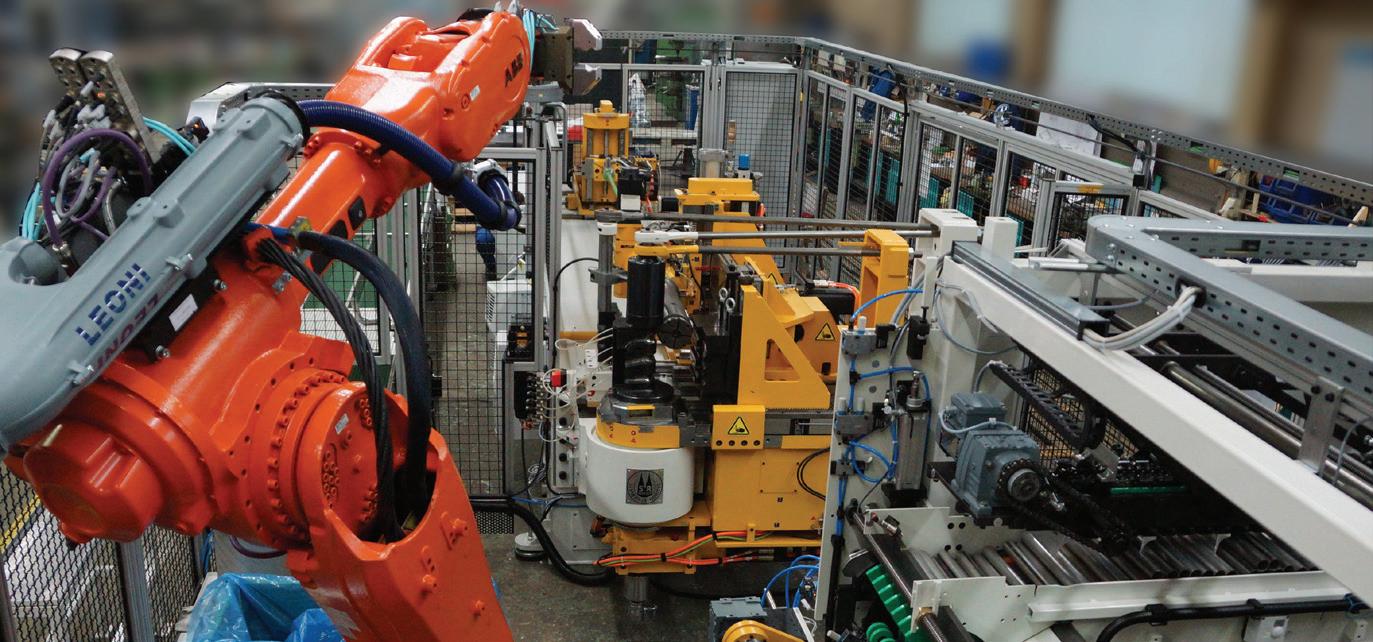
HA: The machines are manufactured in-house in Cologne, Germany. So, when you see ‘Made in Germany’ on our machines; that really means that they are manufactured in Germany. We have our own technical department, and software department, and we create all the developments in-house, no matter if they revolve around the machinery itself, the electrical components or the control system. We do not have
to rely on sub-suppliers. And, that is an added advantage.
TPI: Are there any new developments at your company?
HA: As the industries develop, we follow the trend. We listen to our customers so that we are always on point. The importance of automation has evolved from the mass production of products to automation in the production of smaller batches and we have a new line for that. So, there are continuously new developments in our company.
TPI: In the capital equipment industry, return on investment is very important. In addition to it, customers look for the overall cost of ownership of equipment. What are your views?
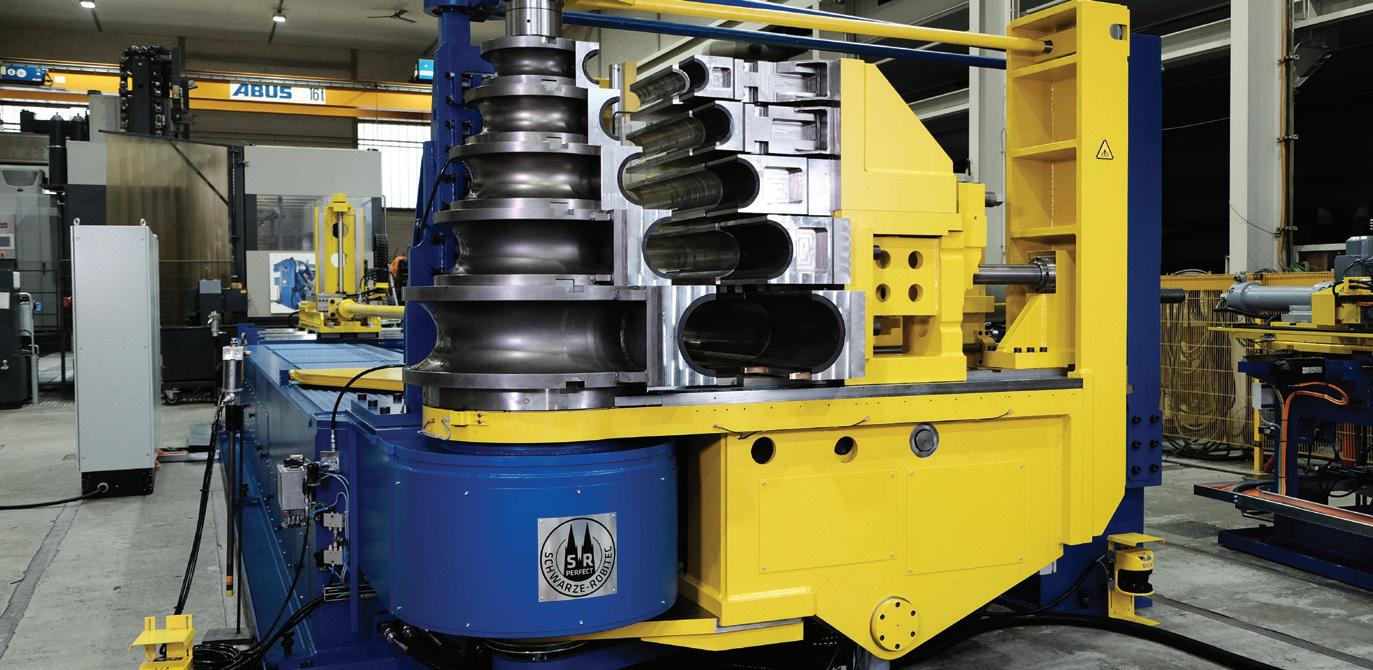
HA: There’s a saying that ‘when you buy cheap, you buy twice’. The lifetime of our heavy-duty machines is 30 years or even more than that. Moreover, we make sure that you have the access to spare parts for your machines for a very long time. With the quality equipment we sell and the after-sales service we
TPI: Could you shed some light on your presence in India?
HA: We have been selling to the Indian market for more than fifty years now. The focus in India lies on machines for the boiler and power industry and machines for Indian shipyards. And we are very keen on expanding our business in India even more.
TPI: What are your future plans for the company?
HA: As I mentioned, automation is a big industry theme at the moment. Another important topic lies within the automotive industry. As you know, combustion engines are on the edge and may not be the future technology anymore; hence, we are concentrating on e-mobility as well. We are looking for new customers in that sector and have machines in our portfolio that provide solutions that will last and are worth the investment.
INTERVIEW | 39 www.tubepipeindia.com TUBE & PIPE INDIA • DEC - JAN 2023
“We listen to our customers and we’re constantly developing ourselves and our machines as a result of the communication with our customers.”
3R solutions: Focusing on Automation through the Aid of Software Framework
“We look at what could be the actual requirements of the customer and select the machines on that basis… We have software that takes the drawings from the 3D model, splits them into individual spools, and does the planning”
3R solutions GmbH has decades of experience in the piping industry. The company specialises in pipe-shops for pipe spool production, with a focus on automation through the aid of its software framework that is customised for each unique project. In a conversation with Tube & Pipe India, Mr. Carsten B. Tripscha, Executive Assistant – Sales & Marketing, 3R solutions GmbH, shares interesting insights about the company and its automated pipe-shop solutions.
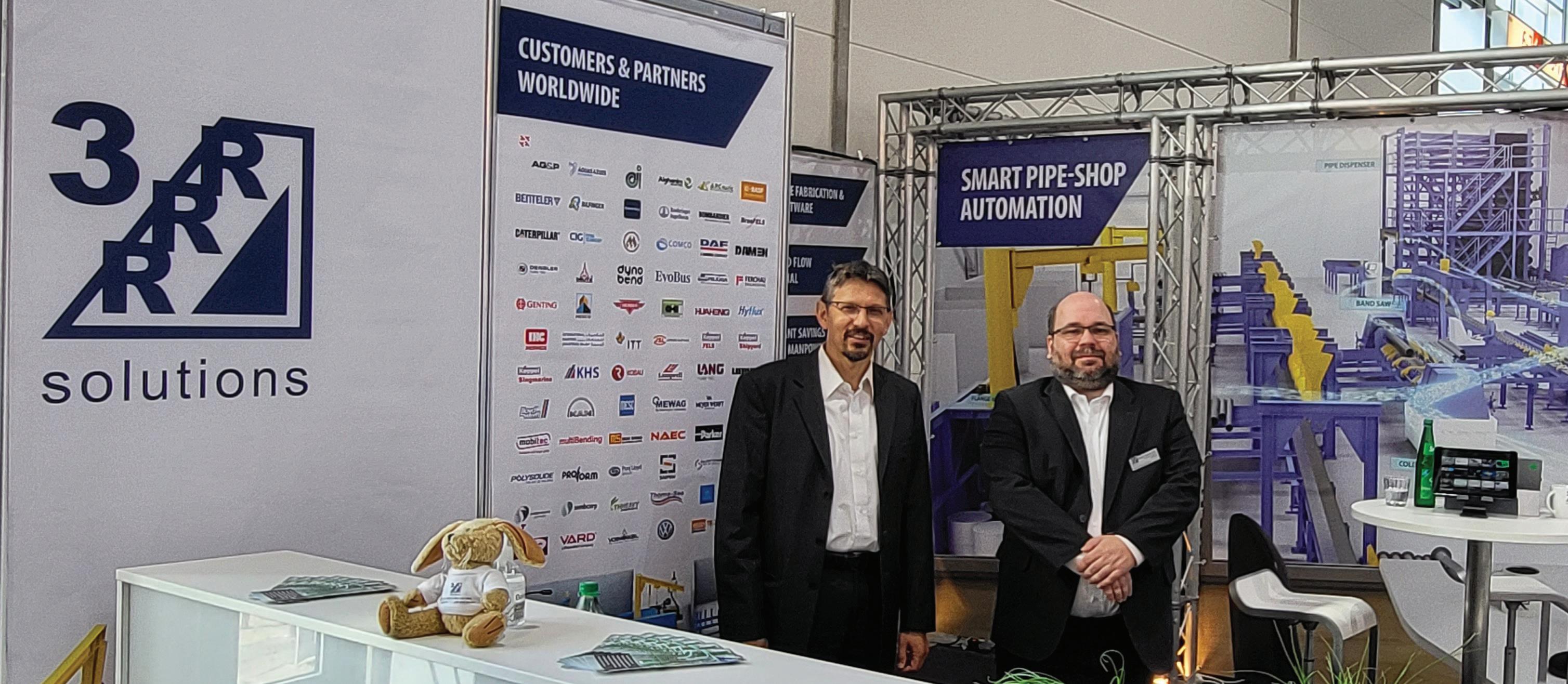
40 | INTERVIEW TUBE & PIPE INDIA • DEC - JAN 2023 www.tubepipeindia.com
Tube & Pipe India: Tell us about your company.
Carsten B. Tripscha: 3R solutions is a systems integrator specialising in setting up automated smart pipe spool factories. We have software integration throughout the entire process. We work as a consultant specialist company for customers in various industries including oil & gas, shipbuilding, and automotive. If the customers source each machine separately, they might have efficient machines, but would never be able to use them in their full capacities. We look at what could be the actual requirements of the customer and select the machines on the basis of that for an integrated flow of material. So, all the machines are designed to be part of one system such as clockwork. We have software that takes the drawings from the 3D model, splits them into individual spools, and does all the planning of the workshop or activities. With our software, you will always know who worked on which spool and at what time. That's why we call it the smart factory instead of just a regular automated factory.
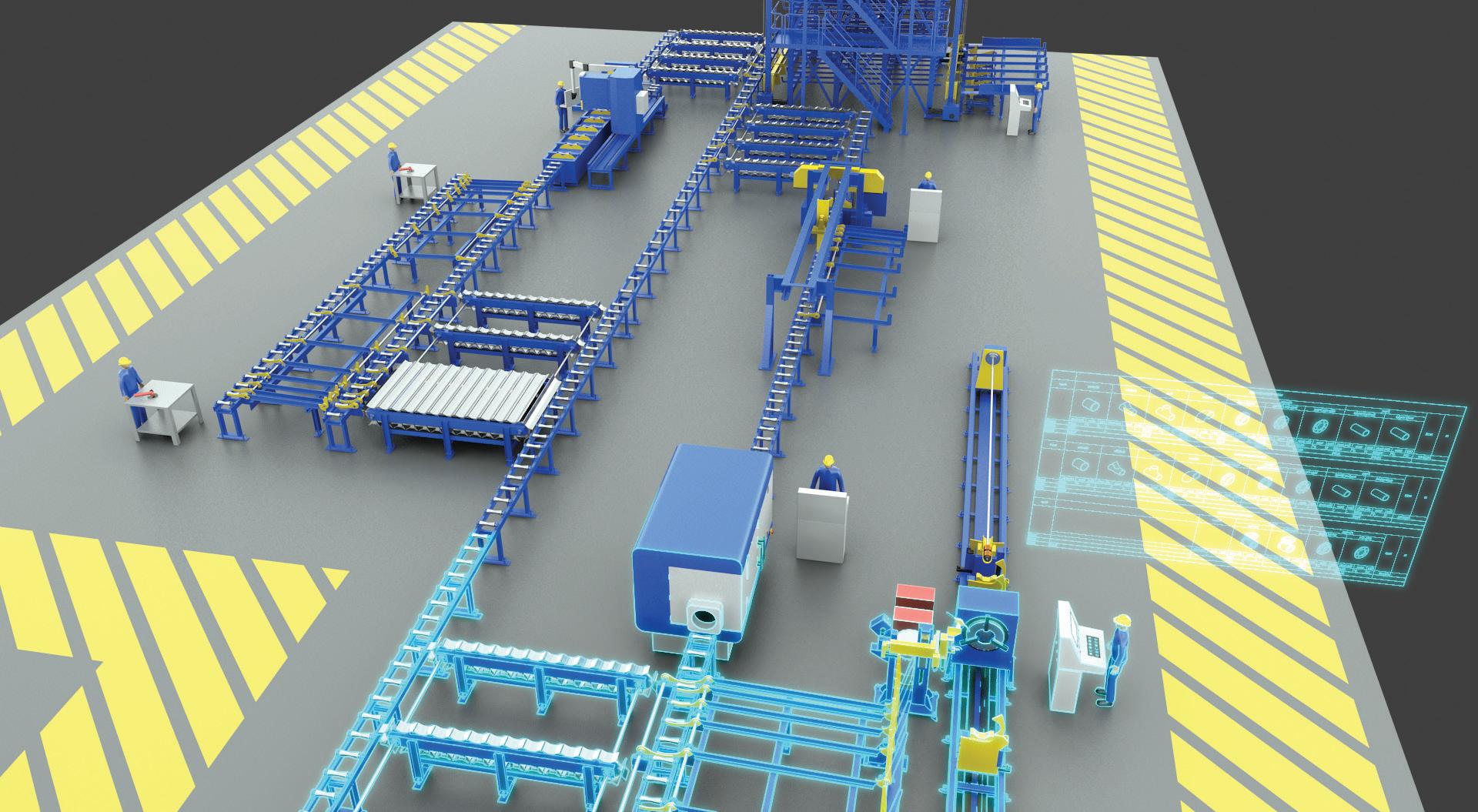
TPI: Please shed some light on the software and machines at your facility.
CBT: We are a software company and consultant company. The software is developed in-house, but the equipment and machines
are sourced from world-leading companies. Our advantage is that we are independent. If you have an agent or a distributor, they have a catalogue of the machines that they sell. We have the flexibility. If for a specific project, the machine from Company A is better than Company B, then we will propose the machine from Company A. However, if the delivery time is more and we need the machine urgently then, we might go with Company B.
Everything needs to be set up and integrated as part of a system including the activities in the shop itself. A lot of people look at one point where they think there is the bottleneck - it's usually the welding and they think they need more welders because the welding is too slow and they don't get the required output.
Usually, the welding quality is fine, but they don’t spend as much time on welding as on other things such as waiting for material, transport, etc. Reducing my welding time from 45 minutes to 40 minutes doesn't help me if it takes me 60 minutes to get the pipe from the fitter. What we are looking at is reducing the incidental time! If the welder takes 45 minutes to weld, but we reduce the time that it takes the pipe to get to the welder to 45 minutes from 60, you get a 33 percent increase in efficiency though there is no improvement in the actual welding
process. If the person has to spend five minutes checking a drawing to find out what needs to be done, that five minutes are essentially lost. That time can be reduced if he gets all the information on the screen.
TPI: Tell us a bit about your team. CBT: We are a company of about 25 people. The majority of our people are software developers including our CEO. He started at the company when he was 16 years old, and took over from our company founder when he was in his mid-20s. Our company founder is going to turn 89 this year, and is still very much involved in our work.
Initially, he was a welding engineer and instructor and did a lot of R&D in the field of welding. He set up pipe shops all over the world. In the late seventies or early eighties, people started using computers to do design work. The first CNC and NC control machines came up. However, he realised that there was a gap in the data flow. People were using software to create 3D models or fabrication, but they didn't have the data for the machines. Hence, in 1982, he founded a software company to create one of the first software applications to take construction data and turn it into fabrication data. That has basically been developed and expanded over the years, with new functionalities and applications.
www.tubepipeindia.com TUBE & PIPE INDIA • DEC - JAN 2023
We have a small marketing team and a good visual graphics artist who can visualise what we do for the customer. All the videos and advertisement materials are produced in-house. The majority of our people are software engineers with an experience of 5-15 years and we train them in-house as well.
Our three-year training program is the standard program for developers in Germany to be certified programmers. Even during that program, our trainees are involved in the projects and working with the customers as only theoretical knowledge doesn't help. People who are in their third year of training also went to Japan and Brazil for projects. The majority of the people who finish their apprenticeship stay with us. The ones, who do not, can find work anywhere because they're well prepared.
TPI: What percentage can a company save on the cost of the operation with a good automation system in place?
CBT: We had customers who reduced the manpower on the shop floor by 50 to 70 percent, but with the software and the planning, they reduced the people in work preparation by 90 percent. They had 20 people in the office doing the production planning, tracking, and pricing reporting. They reduced it 2. Talking about production efficiency, they saved about 50 percent of the time. They went from 1.5 to 1 or even less than that.
TPI: What are some of the recent trends? Also, tell us your strengths
with regard to software and information that you have.
CBT: One of the biggest trends that we see is people keep talking about Industry 4.0. I personally do not like the term industry 4.0, because it's not really clearly defined. Also, we don't automate for the sake of automation. Automation is done to save money, and not spend money. Hence, it should bring you tangible returns of around 3 to 5 dollars for every dollar you invest in it.
The concept of Industry 4.0 works fine if you have mass production of the same thing, such as the automotive industry which builds the same spools 500,000 times. However, the offshore industry builds 500,000 spools once. Hence, the process needs to be different for them.
We prefer to keep our data or the customer's data within the customer's IT network. If the customer has a cloud network, he's also responsible for keeping it. Ideally, the customer has his own server and his own IT network. About a year ago, there was an accident at one of the big data centres in Strasbourg, France. Several hundred servers went up in flames, millions of websites were down, and so much data was lost. Therefore, if you keep the data locally at your own place, there's still some risk, though steps can be taken to mitigate it.
If you store it in the cloud server, you don't know how good the physical security is and how safe is your data. We, personally, do not offer it as a standard to a customer. We've
been doing all those principles of tracking the data, giving the data to the machine, extracting all of those, and smart manufacturing, but we also prefer to have the operator on site to override because any robotic machine is only as smart as the programming.
If you have corrupted data, and you don't have the human to check, you might not be able to find the error until it is way too late. The human operator is a potential source of mistakes and errors; on the other hand, it's also a control mechanism to catch errors that might have been made.
TPI: Tell us about your Indian connection.
CBT: We have some potential customers in India. It is a significant potential market for us with a lot of demand. There are a lot of industries in India and we are considering attending some Indian trade shows. We don't have any direct customers right now. However, we work with a lot of the machine manufacturers who have clients in India who use our software or some of our applications if not the full software package.
The bending simulation software is one such software. Comco from Japan is our consumer and it has a subsidiary in India. They sell our software together with their machines. There are a number of such vendors who have business in India and find it easier to offer our software together than develop their own. I have no direct contact with such customers but would love to have a big project somewhere in India.
TPI: Anything else you would like to add to the interview?
CBT: If you do want to automate fabrication or improve it in general, keep in mind that a pipe shop is a complex system, a change to one part of the flow of material will affect everything else. Thus, whenever you make a change, you need to look at all the connected processes in sequence. Don't just look at each machine as an individual piece!
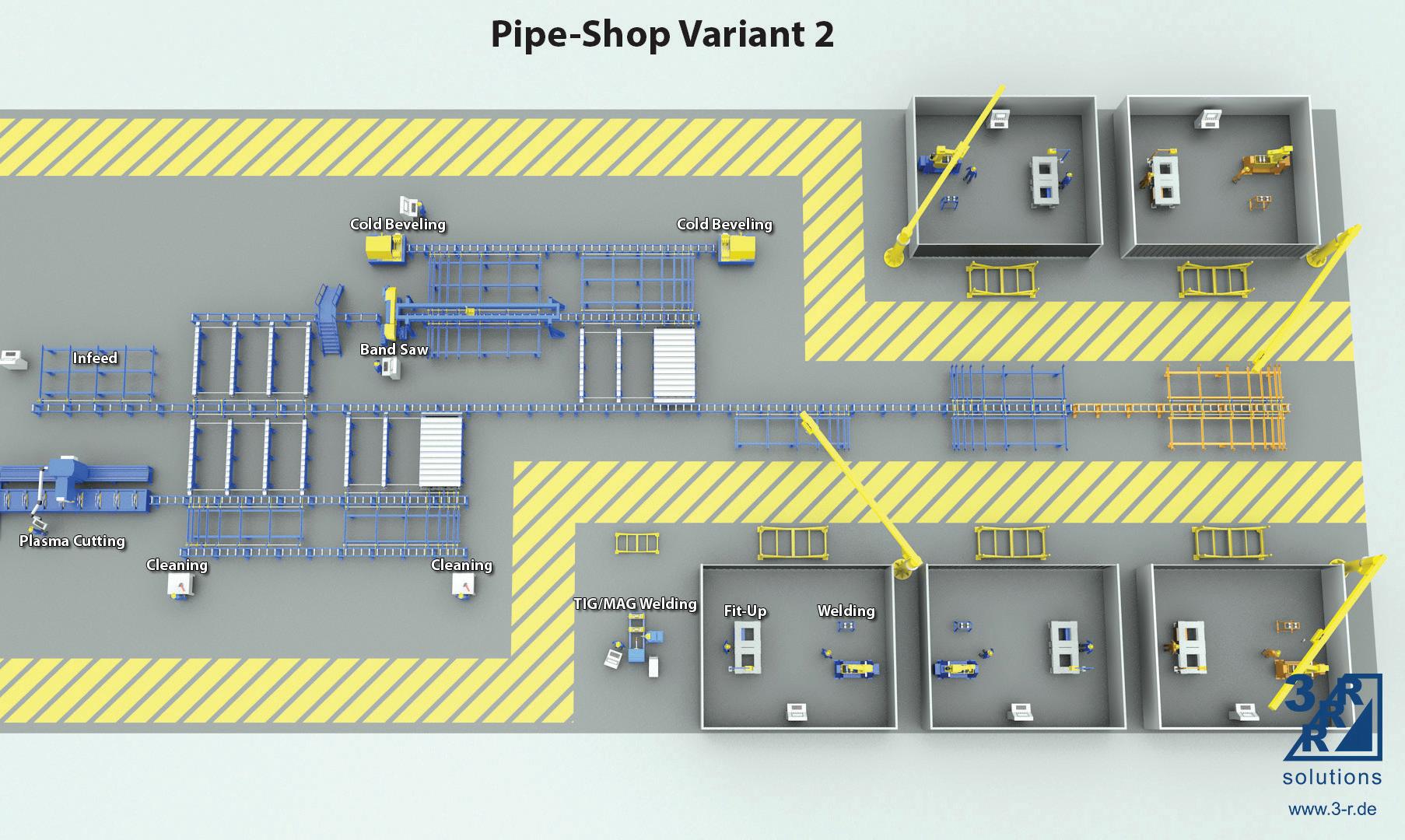
42 | INTERVIEW TUBE & PIPE INDIA • DEC - JAN 2023 www.tubepipeindia.com
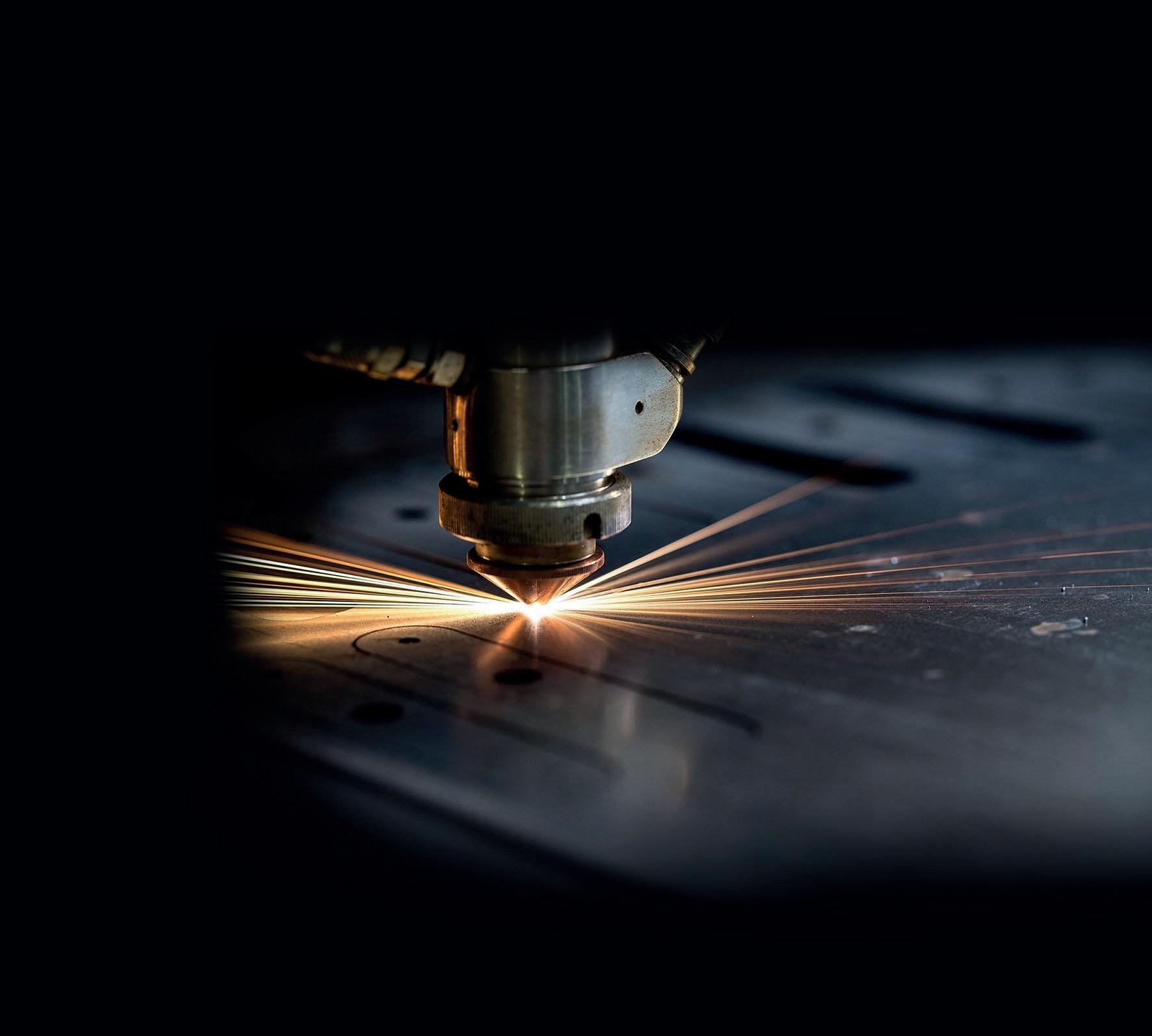




Nirmal Overseas: Keeping Up with the Latest Technology is the Success Mantra
Nirmal Overseas Pvt. Ltd. was the first company in India to manufacture a wide range of HF/RF tube welders and induction heaters. Through continuous research & development, Nirmal has emerged as a leader in the manufacturing of tube mills, slitting machines, seam normalizing, open profile machines, burr-free cutting, and other allied machinery. Nirmal Overseas has developed a new process of designing, engineering, manufacturing, and installing the equipment. In an interview with Tube & Pipe India magazine, Mr. RK Aggarwal, Chairman, Nirmal Overseas Pvt. Ltd., shares interesting facts about the company's journey.

www.tubepipeindia.com
Tube & Pipe India: Nirmal Overseas has an industry experience of almost four decades. What has been your philosophy? Also, take us through your business journey.
RK Aggarwal: Our only philosophy is to serve the country. We started our business in 1980 when nobody was manufacturing high-frequency welders in this country. At that time, the norm was to order machines from the UK, the USA, and other western nations. However, the maintenance engineers were not available in India to repair those machines. Since I've had the opportunity to work with experts from the developed parts of the world, I should start the business in this segment. Thus, Nirmal Overseas became the first company in India to manufacture such machines with the indigenous technology developed from our distinctive expertise and know-how. After that, some other firms also emerged with a similar kind of manufacturing setup as ours. However, we strive to be competent and competitive in the industry. With time, we have gained people's trust by supplying reliable solutions.
TPI: Could you shed some light on the company's achievements? What factors helped you to stay ahead of your competitors?
RKA: We started our manufacturing operations with high-frequency welders. The machines we manufacture are as per the requirements of the Indian market:
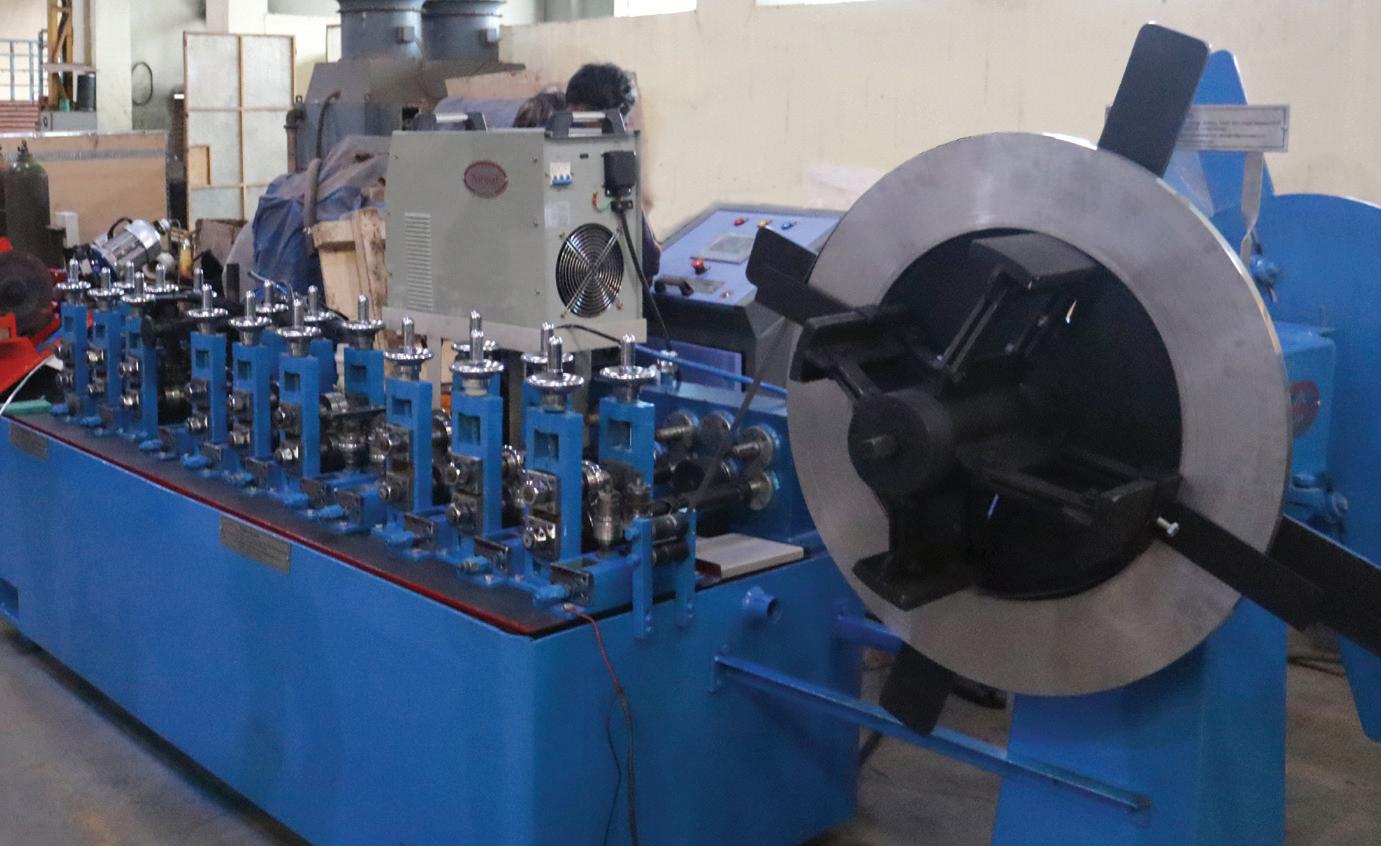
• The probability of the machine breakdown is very low;
• Any electrician could repair it;
• The maintenance costs incurred were significantly less. In the initial few years of our business, we found the competition quite challenging. In those early days, we approached companies and supplied the machine on the condition that they should pay if they were satisfied with the quality and performance of the machine. This enabled us to get good references in the market and repeat orders from the clients. Due to our organized and streamlined planning, we have received a few big
orders which are a testament to the performance of our machines. Earlier, our focus market was Punjab and nearby areas for the supply of conduit pipes. For this segment, the machines were generally procured from countries such as the Czech Republic or Slovakia. Our machines were equally efficient but with less capacity, load and cost. We became successful and were able to get around 50 orders in Punjab itself. Gradually, we expanded our business. Today, we have more than 1,500 customers in India. We made welders up to 1 MW capacity, which is the highest Walts welder in Asia, and supplied it to Maharashtra Seamless.
Nirmal is the only company to supply complete turnkey projects in India, from slitting lines, tube mills, and tube mill rolls to galvanizing and threading machines - this is our strength. Secondly, Nirmal Overseas has tie-ups with various international companies, such as Mannesmann Demac Germany MDH, Germany. We have a good focus on efficiency, customization & technical operation, and that's why we have been able to stay ahead of our competitors. Nirmal is the only company in India to supply machines up to API lines for 20-inch pipes. To be a successful company, one needs complete technology and 3M - Money, Manpower, and Machines. We at Nirmal have the latest CNC machines and skilled manpower. We keep ourselves technically upgraded and make investments accordingly.
TPI: Please summarize your entire product line for us.
RKA: We provide high-speed tube mills, seam normalizers for API pipe, hot dip pipe galvanizing plants, API tube mills, hydro testing for API pipe, hot dip structure galvanizing plants, solid state HF tube welder, slitting lines, cut-to-length lines, open profile machines C & Z, door & window, the hollow section for square /rectangular, stainless steel tube mills, spare parts for tube mill industry, tube mill rolls and bur free cold SAW cutting.
TPI: Nirmal was awarded as the Top TEN Exporter in 1997. Throw some light on the market footprint and clientele of the company today.
RKA: In 1984, we developed indigenous technology for HF
INTERVIEW | 45 www.tubepipeindia.com TUBE & PIPE INDIA • DEC - JAN 2023
“Nirmal Overseas became the first company in India to manufacture high-frequency welders with the indigenous technology developed from our distinctive expertise and know-how.”
welding, which was a hundred percent import substitute. Soon after, we started exporting our machines. In fact, we have exported more than a hundred machines worldwide to around 25 countries including the UAE, Oman, Angola, Guinea, Syria, Saudi Arabia, Nigeria, Nepal, Bangladesh, Uganda, and Rwanda, and it is our quality & service that has enabled us to make a mark in the international market. We ensure the full performance of the project and provide good customer service. We have supplied our products to Integrated Telecom Company (ITC), Bahra Electric, AlRajhi, and ASAD Group in Saudi Arabia. We get repeat customers, and this is a significant landmark for us. In India, some of our customers are Tata Steel, Bhushan Steel Industries, Jindal Steel and Power, Jindal Industries, Jindal Stainless (Hisar), Hi-Tech Pipes, PS Steel Tubes, and Surya Roshni among others. If India can provide high-quality products at an affordable price, it can capture worldwide. Our next milestone would be to export our machine to South America, North America, and countries like Brazil.
TPI: Going forward, what are your future plans for the company?
RKA: Earlier, we were producing one machine in two months. Now, we are making one and a half machines in one month. Further, we plan to make two machines per month - a tube mill or a slitting line. We will expand our manufacturing area and transform manual machines into fully-automated ones. In the coming years, we aspire to manufacture
CNC machines in all stages. All computerized machines will be there so that we can increase our production as well as improve our quality. I always wanted to make portable machines so that if anybody wants to make pipes, but cannot afford to put up a plant, they can take the machine from me on rent. I have made a pilot machine that can make 6mm pipe which I want to exhibit at upcoming events.
TPI: How has the Indian tube & pipe industry changed over the years, and how do you foresee the future?
RKA: A few decades ago, there was a dearth of qualified professionals in the Indian tube and pipe industry, except for a few conglomerates. Jindal Group was among a handful of companies that have contributed to bringing a kind of revolution in the tube & pipe industry in the country. They envisioned and succeeded in transforming the unorganized sector into an organized one.
Earlier, there was little competition in this industry. Now, the situation

is quite different as the competition has grown to a great extent. The market demands dictate that the technology suppliers should keep in mind the volume, competition, cost-effectiveness, and good quality simultaneously. This has signaled a significant change in the industry. The pipe manufacturers are looking to install quality-oriented production lines as they strive to enhance their manufacturing systems.
TPI: Any concluding thoughts on the interaction?
RKA: Since the industry is dynamic and constantly evolving, technological innovations are always taking place. For instance, newer manufacturing systems are an outcome of the ongoing evolution of technologies. Further, we are planning to upgrade the technology to integrate laser welding. This will be more efficient in terms of productivity as well as costs. A new technological revolution is on the rise. Every day brings new opportunities to learn and innovate!
Testimonial
Steelco is a Sudan-based pipe manufacturing company. We have a relationship with Nirmal Overseas for more than 16 years and have manufactured around 220 kilometers of oil & gas pipes for the government sector. Soon, we are going to establish two more projects. We are extremely happy with the solution provided by Nirmal Overseas. The machines are extremely efficient. We hope that our relationship with Nirmal Overseas grows stronger in the coming times.
Mr. Aziz Abbas, Steelco Factory for Iron Product, Khartoum, Sudan
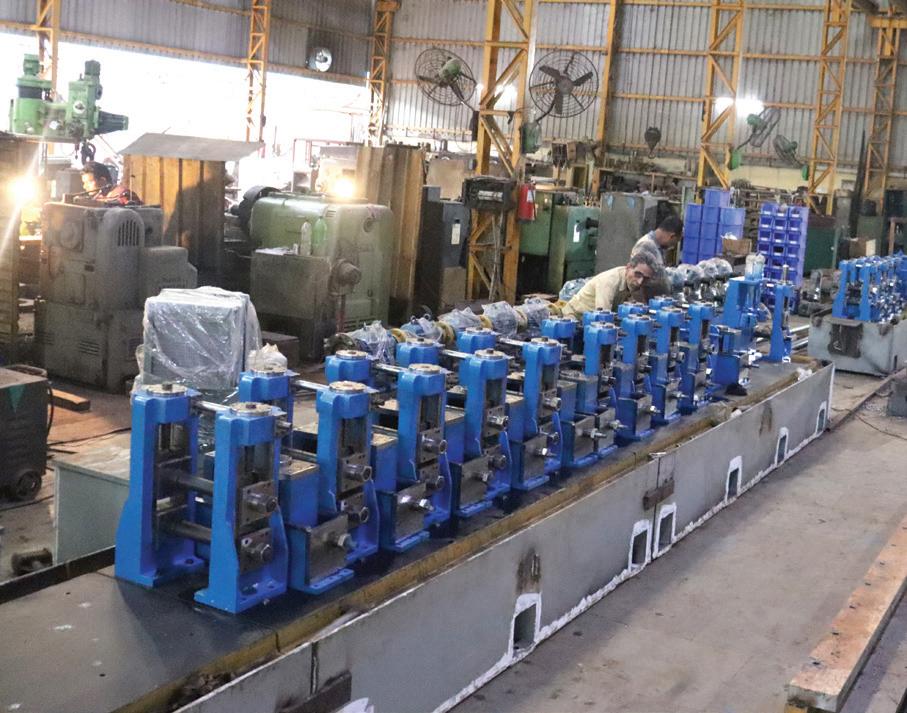
46 | INTERVIEW TUBE & PIPE INDIA • DEC - JAN 2023 www.tubepipeindia.com
Tulip 3P Media Pvt Ltd Mobile : +91 9910329829, Email: info@tulip3pmedia.in www.tulip3pmedia.in

on Tube
Plastic, Rubber
Industries
India’s only Magazine
& Pipe Industry For booking write to info@tulip3pmedia.in or call +91 9910329829 www.tubepipeindia.com Metals,
A Bi-monthly Magazine for Tube & Pipe
www.tubepipeindia.com
NEXTSENSE: Calibrating, Measuring and Optimizing
Founded in 2007, NEXTSENSE provides trailblazing profile measurement systems which are based on non-contact laser measurement technology. This enables the users to glean knowledge based on – precise information without distortion, variation, and approximation. There are three major industry segments – Automotive, Railway, and Steel – for which NEXTSENSE provides its Calipri-based solutions. In an interview with Tube & Pipe India magazine, Dr. Ralph Foehr, Global Sales Manager Steel Applications, NEXTSENSE GmbH, talks about the Company, its solutions for the steel industry, innovation in terms of production technologies, recent developments, and the way ahead.
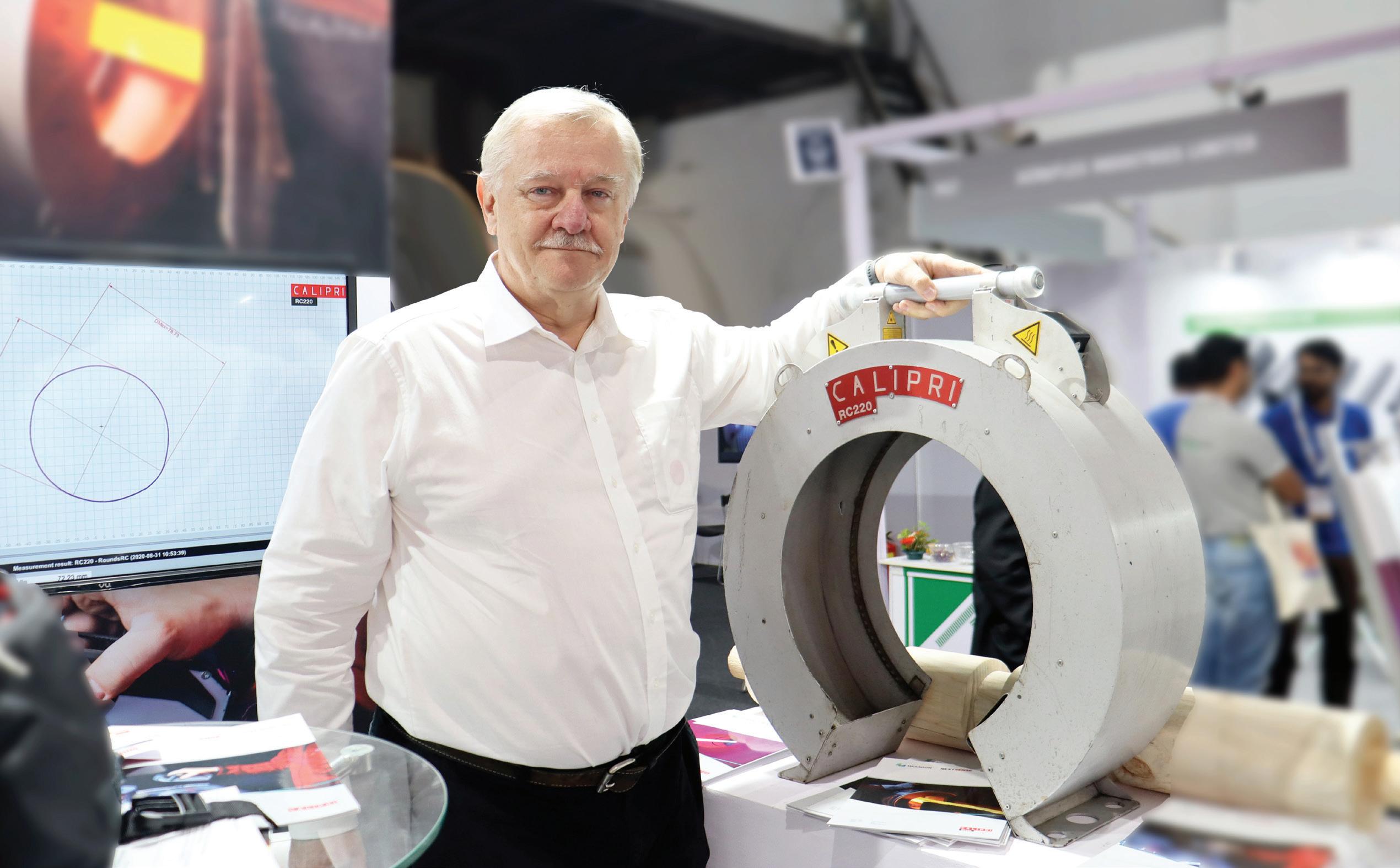
48 | INTERVIEW
& PIPE
• DEC
JAN
www.tubepipeindia.com
TUBE
INDIA
-
2023
Tube & Pipe India: Could you please give us a brief outline of the business journey of your company along with crucial milestones?
Ralph Foehr: NEXTSENSE GmbH is an Austria-based company. We have a workforce of roughly around 100 people in Austria. The company has been taking care of laser-based measurement systems for seventeen years. For four years, we are a part of the hexagon group, which is a huge name in the machine intelligence and automation systems industry. There’s been a growing inclination to glean more information about the dimensions during the production process. In this respect, the measurement has to be extremely precise. About ten years ago, most of the industry players, which also include some of our clientele, were happy with relatively simplistic measurements, for example, diameter in a horizontal direction and in a vertical direction. This is not enough in today’s times. The manufacturers want to check if certain rolling defects are occurring. It is also important to note if these rolling defects can be detected reliably so as to notify the operating crew for them to take any remediate steps during the production process. Our thorough focus is on integrating a lot of technical directions in the production industry.
TPI: Kindly cast some light on the infrastructure, manufacturing capabilities, and machinery installed at your facility.
RF: Since our capabilities lie in the production of electronics and software, thus, the role of large-scale facilities is not a major requirement for us. In fact, we have partnered with a few reliable suppliers who assist us in mechanical part-related operations. At present, we take part in the assembly of the electronics. Moreover, the CAD is also done with us. It can’t be overstated enough that the most important part of our products is the embedded software in the systems.
Also, laser sensors are an integral part of measurement systems. Since the raw signal is usually not proper, one has to do a lot of filtering and calculation so that one gets the right and precise data from the system.
TPI: What all products are there in your portfolio and what are the key strengths and applications?
RF: We, at NEXTSENSE, are producing laser gauges for three different industries. Firstly, in the ‘automotive’ industry, we enable the production process to find out whether or not the production worked well with our range of technological solutions. For the ‘railway’ industry, we provide solutions for profile measurement for predictive maintenance where we assess the working of wheels, brakes, rails or switches – we have the right solution for any measurement task. Finally, in the ‘steel’ industry, which has been the industry with which we started our journey, Nextsense offers solutions to identify surface defects and profile deviations, particularly on long products. Thus, we are enabling steel rolling mills in this aspect, for instance, in product segments like wire rods and tubes; we assist the producers in defining the cross-section of that product during production.
I would like to emphasize on the solutions for the ‘Steel Industry’. In principle, we have two big groups of products – mobile gauges which can be carried to the position which is to be measured and stationery gauges which are immobile. These devices allow you to get information about the diameter and other characteristics. We started the supply of stationary gauges 17 years ago and we started in the rail rolling industry. For four years or so, we have diversified our business and we have started serving other industry segments such as the wire rod mills, bar mills, and pipe mills.
TPI: Data Analysis and Artificial Intelligence are the future of new manufacturing systems. Please share your opinion on the same.
RF: Realistically speaking, only those mills, who know how to use the data in a proper manner, can create the
INTERVIEW | 49 www.tubepipeindia.com TUBE & PIPE INDIA • DEC - JAN 2023
“The tube and pipe makers must shift away from their conventional manufacturing processes and move towards intelligent processes… For this, precise measurement systems are crucial.”
right SOPs, to be referred to in the production process which is quite advantageous for the manufacturers. Meanwhile, the people associated with the financial department of the mills or those taking care of the financials, are majorly concerned with the Return on Investment (RoI). In this regard, I would say that the measurement process itself doesn't save money in a direct way. It is only what you do with the data, which you then integrate into the production operations. This enables in saving the capital. This enables us in making measurement-related decisions in a much faster way with our different measurement systems which also gives the required feedback to the operations team. Further, there is another driving factor which we are foreseeing, and which is pushing us now in a certain direction. In the next 20 years, steelmaking will change completely with the prevalence of green steel. For green steel production, the processes will be different keeping in mind the unique mechanical properties of green steel. Now if one uses hydrogen in the blast furnace instead of coke, then there is no carbon in the iron. It means that one will need to find a different way to inject the carbon into the iron. In the beginning, that material will have different mechanical properties. This also means that we will need to ensure a steeper learning curve to get used to the new mechanical properties. The rolling mills see this material first and there we need to watch the process more thoroughly. The said learning curve can only be achieved if the industry players pay attention towards collecting more knowledge and understanding of the processes, using Big Data analytics and Artificial Intelligence to understand how the new rolling process works.
TPI: Please shed some light on the clientele of your company in the Indian market. Also, kindly share your outlook on the tube & pipe industry.
RF: In the Indian market, we have been supplying our products for the last ten years. We have established a strong repute and our customers
include the Steel Authority of India Limited (SAIL), Jindal Steel and Power Limited (JSPL), and so on. These are a few of the major customers we’ve been serving. In the coming future, we would like to increasingly collaborate more with the tube, wire rod, bar, and tube mills.
In terms of our portfolio, we are looking forward to expanding our presence in the tube & pipe industry to fulfill their requirements related to measuring systems. We aspire to get more inquiries for our solutions from the tube & pipe industry. Nonetheless, it will be an initiative that has to be directed by the manufacturers. The tube and pipe makers must shift away from their conventional manufacturing processes and move towards intelligent processes. This is where we come into the picture. The need to become smarter in the production processes has become more urgent than ever before. For this, precise measurement systems are crucial. In our understanding, we are quite enthusiastic to serve the requirements of the tube & pipe industry.
complete rolling process. This is the major focus area for us.
At a later stage, all these data and information are integrated as A.I.-models, i.e., the simulation of so-called digital twins. This will enable to go through all the details much more thoroughly and asses the activities in the facility. Hence, in this respect, we would like to increase our inclination towards software and A.I.
TPI: Is there anything else you would like to add with respect to the Indian market?
TPI: What is your technology and business roadmap for the future?
RF: Essentially, we would focus on: increasing our dependence on software/machine-intelligencebased systems and growing the usage of standardized components in the hardware. For instance, in a rolling mill, if one can only afford to put just one gauge inside because it's expensive, we would need to make the gauges less expensive so that many more gauges can be placed inside so that one can follow the
RF: The Indian market is quite challenging. It has been around 10 years that we’ve been coming here on a regular basis. In the future, we would like to associate with more such companies who are willing to make their factories smarter. This is a large-scale transformation which would not happen automatically. It will entail the right strategies and tools to drive such changes. In fact, the disposition of the customers in this regard will be significant. Their investment in the right personnel and the right processes would be a determining factor. Presently, the Indian manufacturing industry is booming, which is a positive indicator. It can be said that the situation in the manufacturing industries in China was at a similar level, about 20-30 years ago. Also, the investment of China in quality and supporting technologies was not that considerable. This was because they could still sell without anybody checking on the quality-aspect. Right now, the demand dynamics in the global market have become more than the industry can deliver. Thus, quality, in principle, has become less of an issue. However, the situation is changing. Today, in China, one will find the most modern and state-of-the-art mills. This has been made possible because of their willingness to invest in improving production technologies. Since there is a degree of competition inside the country, they strategize to position themselves in a completely different way. What I am hoping is that India is paying diligent attention towards the quality-related parameters of the products manufactured.
50 | INTERVIEW
TUBE & PIPE INDIA • DEC - JAN 2023 www.tubepipeindia.com
“We would focus on: increasing our dependence on software/machineintelligence-based systems.”
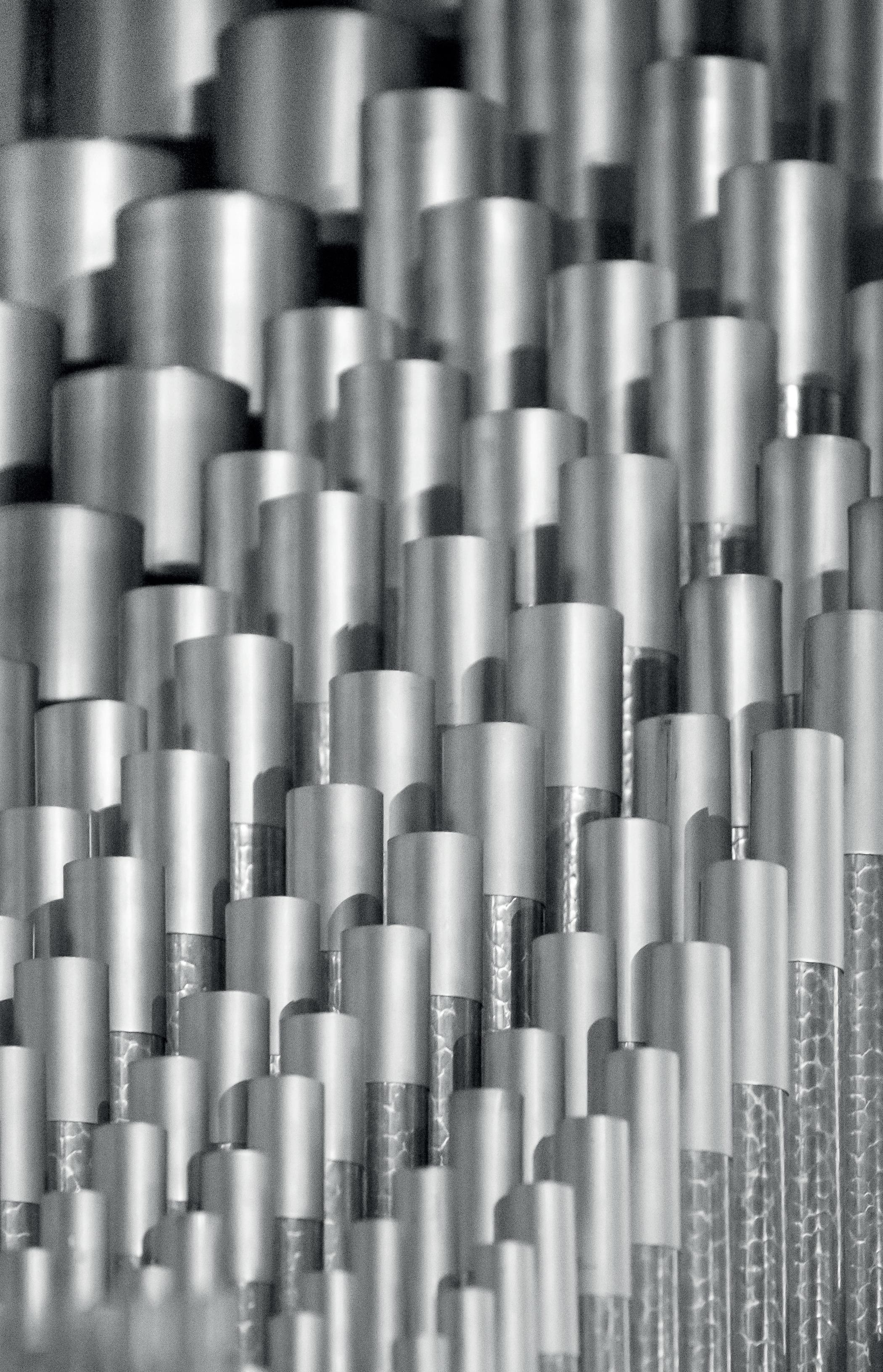
























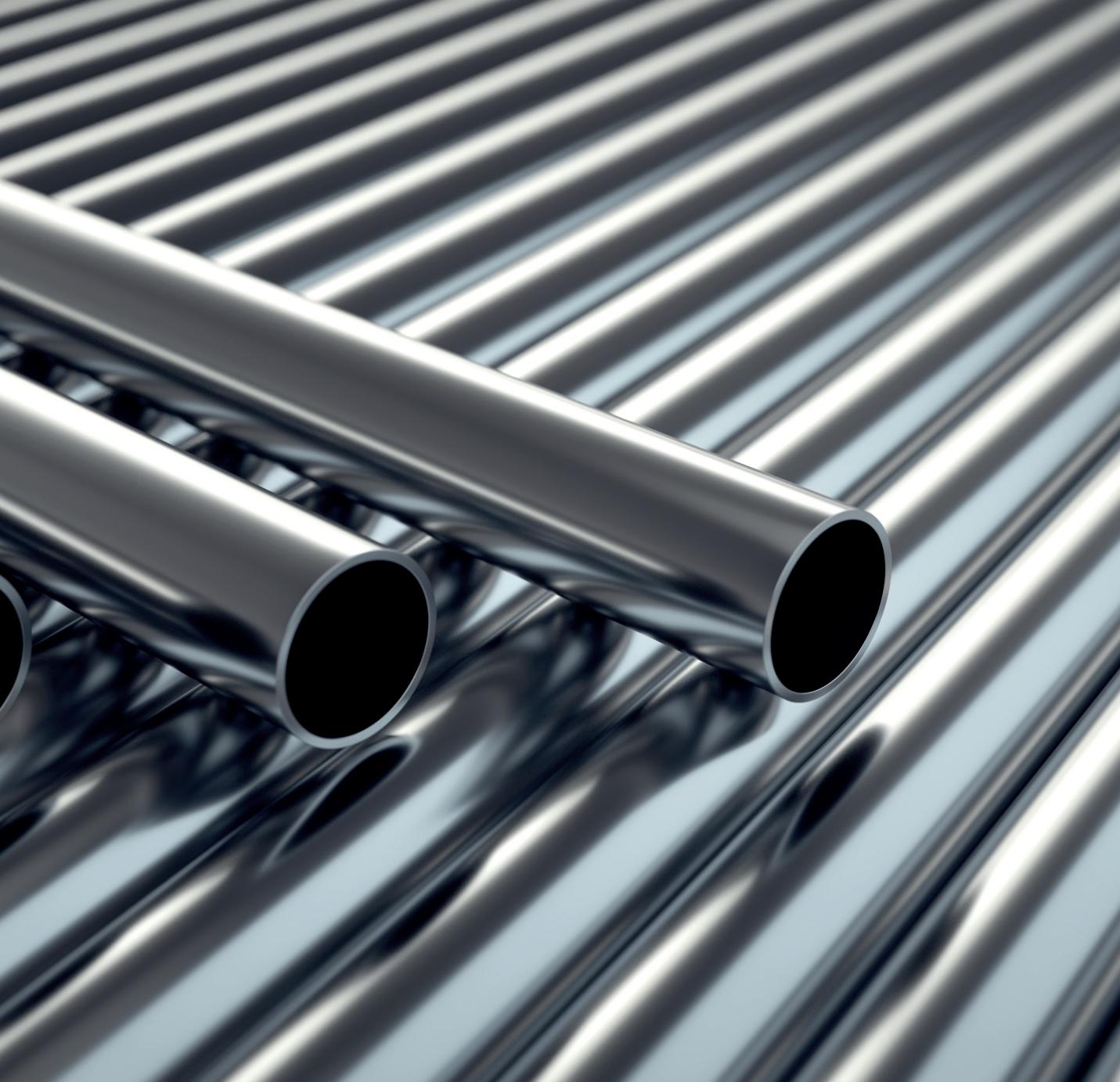
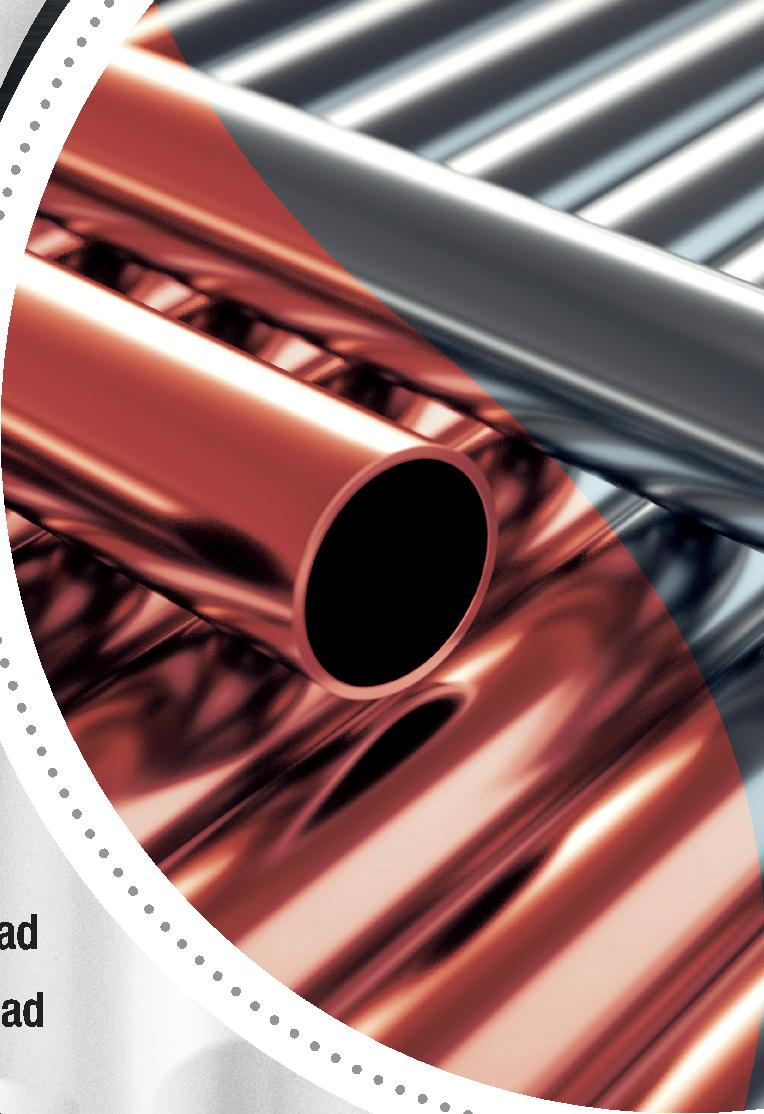

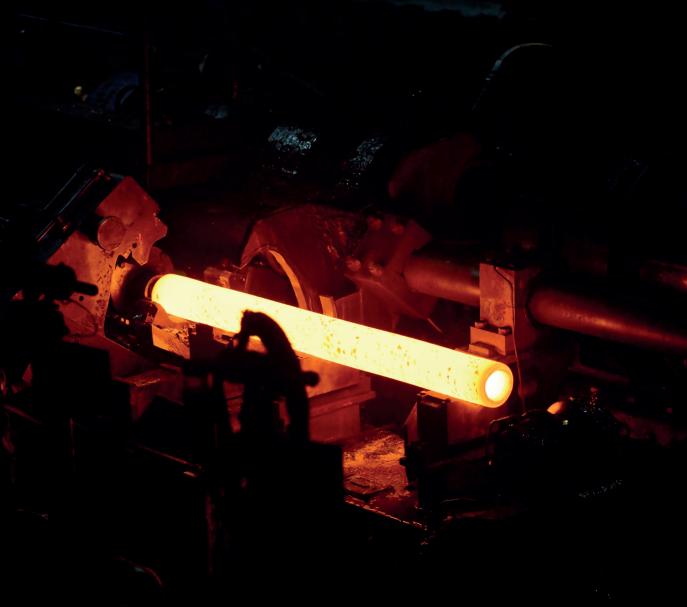
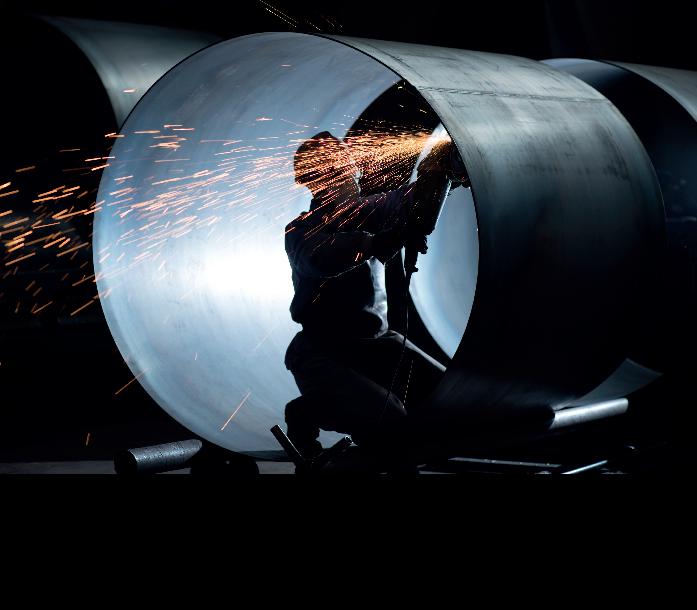
WIDE RANGE OF PIPES • Line Pipes • Boiler Tubes • Aph Tubes • Large Diameter Pipes • Square & Rectangular Hollow Sections • Low Well Thickness General • Engineering Pipes OUR BRANCHES BRANDS WE STOCK & REPRESENT Mumbal Office: 211-213, Navratan Building, 69, P.D. Mello Road, Carnac Bunder, Mubai-400009. Maharashtra-india Ph. +91 22 23488554 | Fax +91 22 23486356 info@shahsteeltubes.com shahsst@gmail.com Email: Ahmedabad Office: 201-203, Sukhsagar, Near Hotel Fortune Lamdmark, Ashram Road, Ahmedabad-380013, Gujarat - india. Ph. +91 79 27561123-24-25 Fax +91 79 27561224
GMT Industries Limited: Aiming Exponential Growth through World-Class Products and Services
GMT Industries is one of the leading manufacturers of tube mills and all related equipment. The company has been servicing the needs of Indian manufacturers for more than ten years by designing and commissioning turnkey projects. In a conversation with Tube & Pipe India, Mr. Neeraj Dubey, Managing Director, GMT Industries Ltd. shares the company’s product portfolio along with expansion plans.

52 | INTERVIEW TUBE & PIPE INDIA • DEC - JAN 2023 www.tubepipeindia.com
Tube & Pipe India: Tell us about your company.
Neeraj Dubey: GMT Industries was established in 2008. Within the span of 14 years, GMT has been able to manufacture 52 tube mills in a year with 12 to 14 slitting lines apart from other equipment. Today, GMT Industries is a leading MS & SS ERW tube mill & finishing line equipment along with Slitting Line & CTL manufacturer in India in terms of quality, delivery and volume. We have been designing and commissioning turnkey projects throughout the globe. This year, we are targeting an annual turnover of INR 100 crore.
TPI: Please shed some light on the infrastructure and machine installed at your facility.
ND: We have a well-equipped infrastructure and a dedicated technical team & expertise, with large industry experience to carry out our projects. Our plant is spread across 1.5 acres in IMT, Faridabad. Apart from this, we have two more units where we do fabrication and roll machining. We have around 12 CNCs and 200 employees. Most of the machines we supply are produced in-house; however, we import a few materials such as PLC/ Drive /Servo Motors from Siemens, Germany.
TPI: Describe your product range along with its strengths.
ND: We strive to offer our customers the most advanced equipment to give them a competitive edge in their business. Besides high-quality stainless steel tube mills, ERW tube mills and slitting lines for metal cutting with the best quality, GMT offers the widest range of modern designed horizontal accumulators with several models suitable for any type of strip processing line.
We provide single/triple tube type draw benches with automatic operations, a huge array of highquality tube push pointers, strip shear & welder, straightening machines, rolls for tube mill, forming lines and straightening machines, automatic cam operated twin head end facer with three tool system, annealing equipment,
tube hydrotesters, pipe bundling machines, pipe threading machines, servo cut to length lines, and specially built cold saw bar and tube cutting machines. As of now, we do not make pickling and galvanizing lines but we have tie-ups with other companies and we guide our customers accordingly.
TPI: Please name some of the renowned clients you serve.
ND: Our commitment to customer satisfaction and quality product has led to a growing list of pleased customers. We get repeat orders from most of them. We have supplied around 28 tube mills in APL Apollo Group. Our client list includes some of the major players in India such as Hi-Tech Pipes, Jindal Industries Ltd, Jindal Stainless (Hisar), Ratnamani and Swastik Pipes among others. In Raipur, we have supplied products to almost all companies including Ganpati Ispat, Isckon Strips, R.R Ispat, Fortune, Shree kuber, Shivam overseas, Nakoda and Shri Bajrang power etc.
TPI: What are your thoughts on the Indian market? Also, tell us about your plans for the future.
ND: The Indian market has a very good prospect. I feel that in the next five years, India would be able to beat China. We want to achieve exponential growth through worldclass products and services and for that; we are tying up with various companies. This year, we will be making big tube mills, i.e., above 8 inches. In the future, we will go for direct forming sections even for the bigger sizes, i.e. up to 24 inches and 500 X 500 mm. It is important to keep up with technology. We are constantly evaluating our valued suppliers, manufacturing systems and internal procedures to determine where improvements and efficiencies can be made.
INTERVIEW | 53 www.tubepipeindia.com TUBE & PIPE INDIA • DEC - JAN 2023
“We strive to offer our customers the most advanced equipment to give them a competitive edge in their business.”
Blue Star Engineering & Electronics: Eyeing Global Expansion
Blue Star Engineering & Electronics Ltd. offers advanced technology products as well as turnkey engineering solutions that cater to several industries in the country. A wholly-owned subsidiary of Blue Star Ltd., it is the exclusive system integrator in India for many globally renowned manufacturers of hi-tech professional electronic equipment and services, as well as industrial products and systems. It provides customized Weld/ Seamless pipe inspection systems using both Conventional and Phased Array Ultrasonic technologies. In a conversation with Tube & Pipe India, Mr. Biju Varghese, Deputy General Manager (Sales), Blue Star EE Ltd. shares interesting insights about the company’s technology
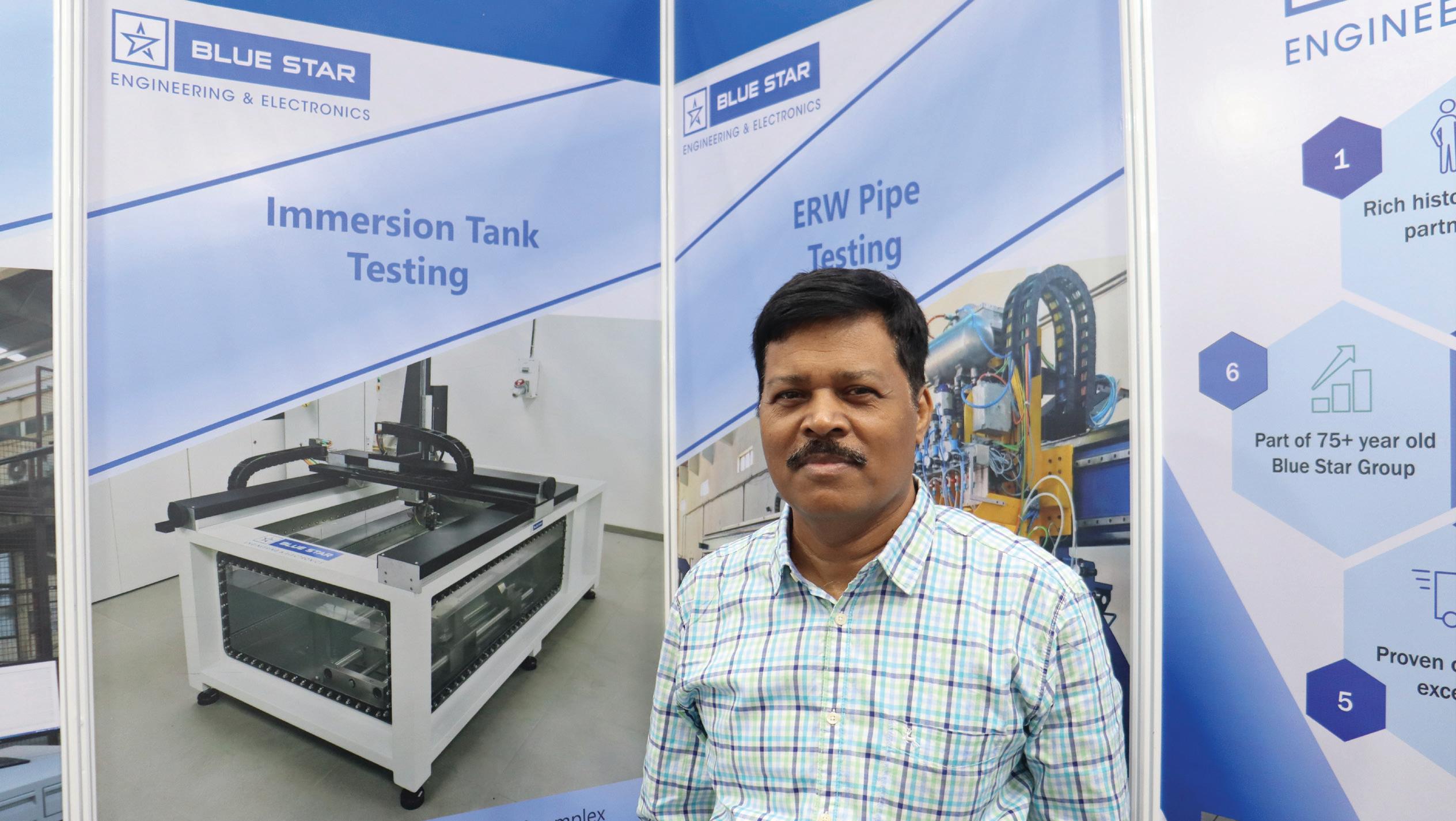
54 | INTERVIEW TUBE & PIPE INDIA • DEC - JAN 2023 www.tubepipeindia.com
Tube & Pipe India: Could you please give us a brief outline of the business journey of your company along with crucial milestones?
Biju Varghese: Blue Star Engineering and Electronic Ltd. is a wholly owned subsidiary of Blue Star Ltd., which is a 79-year-old company. In India, we have been providing Non-Destructive Testing (NDT) on pipes for the last 20 years. We are one of the leading system manufacturers for ultrasonic pipe testing for ERW pipes, LSAW pipes, HSAW, plate inspection, and radiographic inspection systems, which are very critical requirements for APIgrade pipes.
TPI: Can you cast some light on the infrastructure and technology installed at your facility?
BV: Blue Star is a renowned company. We have an Industrial Automation department, under which we have our NDT department. We have offices across the country and we have sales and service team in all the major cities of India. We have our own application lab and customer experience center in Mumbai. We have 40 team members; most of them have good experience of around 15-20 years. We have technology partners from companies such as Olympus from Canada and Yxlon from Germany among others. We undertake automation related tasks in India
and provide cost-effective value-added solutions to our customers. We have our own design team for the application development. This is how we are trying to build up our strong presence. We want to evaluate it and make it the best in the world in terms of quality and performance.
TPI: Tell us about your product portfolio.
BV: Any pipe mill that is API approved needs welding to be inspected through an ultrasonic system as per API standards. Only then, they can guarantee that it won’t crack when you transport petroleum products at very high pressure. We have an Ultrasonic weld inspection for ERW/LSAW/HSAW and for Seamless pipes. We also have automated radiographic (X-ray) systems for LSAW & HSAW weld pipes.
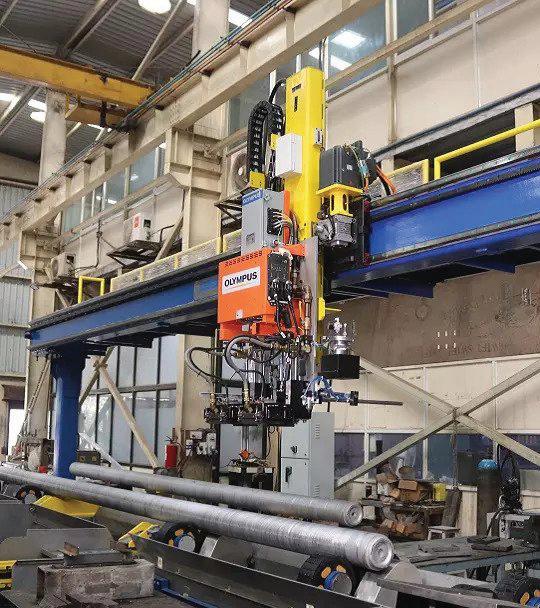
There are some standards where you have to check for Hydrogen-Induced Cracking (HIC) and we have an immersion UT system for HIC inspection.
TPI: Can you share some light on the market footprint and clientele of your company?
BV: In India, we are well known for more than 20 years and have around 60 to 70 percent market share in API approved pipe mills. All the leading pipe industries like Jindal SAW, Welspun, Ratnamani, Man Industries, MSL and Surya are using our machines. Other than pipes, we also have a very strong presence in Automated Ultrasonic testing systems for alloy steel bars. We have supplied Phased Array UT Bar Inspection systems to JSW, Mukand, Kalyani, Sunflag and others. We currently have around 21 such systems in India and constitute 95% market share.
Our system is installed in Dubai – the Middle East hub and we have also supplied to Canada and the USA. Now, we are trying to penetrate in other parts of the world, especially Southeast Asia.
TPI: Share your outlook on the tube & pipe industry. How do you see the market evolving in the future?
BV: The market is very good. India has embarked on a massive expansion of City Gas Distribution (CGD) to develop large-scale nation-wide infrastructure for making Piped Natural Gas (PNG) available to domestic, commercial, industrial consumers, and CNG vehicle owners.India's natural gas demand is set to grow at a CAGR of 8% and the Indian government is trying to increase access to gas to about 70% of the population by 2025. So there is a huge demand for laying new pipeline network across the country. Existing pipe mills are increasing their manufacturing capacity and many new companies are now going for API approvals. Hence, we see quite a good potential in this segment.
INTERVIEW | 55 www.tubepipeindia.com TUBE & PIPE INDIA • DEC - JAN 2023
“We deliver Customer right Solutions”
"We undertake automation-related tasks in India and we have our own design team for application development."
ISEND: Utilizing Artificial Intelligence for Smart Industry
ISEND S.A. is a technological company that designs, manufactures, and implements pioneer solutions for process and quality control. It is based on the technology of Eddy Current and integrated with Artificial Intelligent, Artificial Vision and Big Data Analysis (using neuronal nets and algorithms) for decision making. All this has software tools that put the information in an easy and accessible way for the end users. In an Interview with Tube & Pipe India, Mr. Pablo Gutierrez Azanza, Client Representative, ISEND S.A. talks in detail about the solutions provided by the Company and the technological roadmap along with their key vision.
Tube & Pipe India: Could you please give us a brief outline of the core business of your company?
Pablo Gutierrez Azanza: ISEND is a technological company that designs, manufactures, and implements pioneer solutions for process and quality control. Our solutions help in the digital transformation of the company, making it a smart factory by implementing industry 4.0 solutions. We have solutions that integrate Eddy Current technology with Artificial Vision and Artificial Intelligence. All this generates a lot of data coming from the process. This data is managed with Big Data analysis that helps identify and solve deficiencies in the process and the product. The software package contains different tools and helps the customers to have all the information accessible in an easy way. We are based in Spain but we work with customers in different countries across the world such as all of Europe, the United States, India, Thailand, and South Africa.
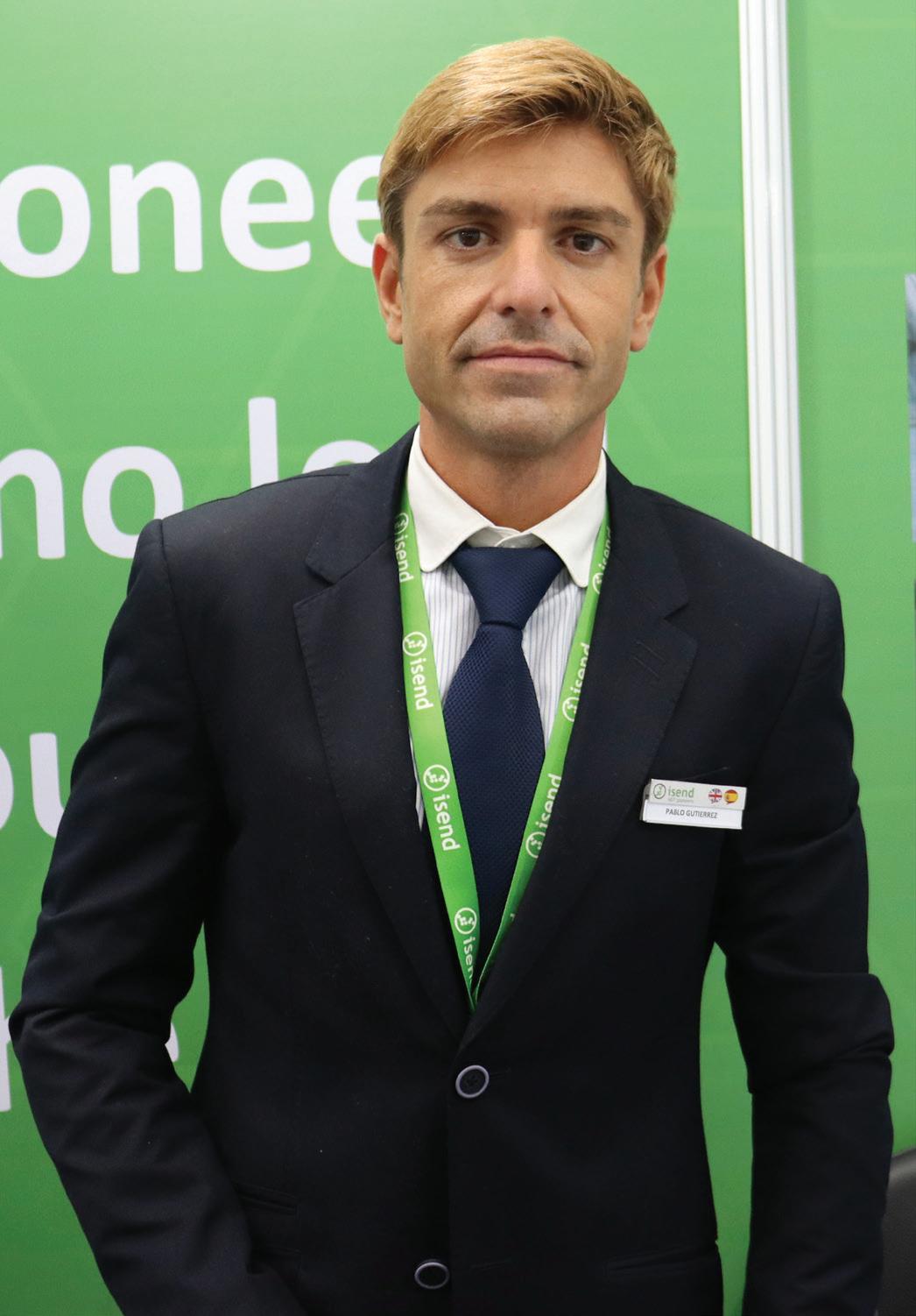
56 | INTERVIEW TUBE & PIPE INDIA • DEC - JAN 2023 www.tubepipeindia.com
TPI: Kindly cast some light on the solutions you provide and their advantages.
PGA: Our focus is on the process, product and quality control with Artificial Intelligence and Artificial Vision integrated with Eddy-Current technology that enables the digital transformation of the customer. ISEND solutions are focused on a wide range of industrial applications. Our set of solutions is created to fit the requirements of our customers.
We design, manufacture and deploy NDT (nondestructive testing) solutions based mainly on Eddy Current technique, Artificial Vision, Artificial Intelligence and Big Data analysis for online and offline metals inspection on metal producers. For example, in tubes, we can identify and prevent potential defects or leaks before their service life is reached, which helps to control the process and the quality.
TPI: Which industries do you serve with your solutions?
PGA: ISEND can offer different solutions for all kinds of customers. In the specific sector of tubes, we have solutions for seamless tubes, welded tubes, and solutions for 360º inspection of the tube or for welding inspection, in ferromagnetic and non-ferromagnetic materials. All the data is processed in a digital way and our R&D department works in close collaboration with our customers in order to continuously improve ISEND's solutions.
We offer solutions for each need, our EDDYEyes for process and quality control in hot rolled producers detects the defects and classify them with Artificial Intelligence (neuronal nets and algorithms), HOTdiscover detects many types of defects in hot rolled rod products by Eddy Current technology, ROTOdiscover detects longitudinal defects in cold formed long products by using rotating probes, WELdiscover detects defects in the welding area of the tubes, ENdiscover detects punctual and transversal cracks in cold formed long products,
DEFdiscover detects defects in components, it's usually combined with robotic solutions. MATdiscover classifies metals by physical properties such as composition, hardness or conductivity.
Our solutions are unique in the market and are part of the IoT technology since the user does not need to go to the production line and check what is happening, instead all the information will be displayed directly on the computer.
TPI: Share your outlook on the tube & pipe industry. How do you see the market evolving in the future?
PGA: We are facing a very peculiar situation coming from the effect of the Chinese manufacturers, the Russia-Ukraine war the United States high demand and the increase in the price of raw materials. The market is affected by several factors right now which were not forecasted by the market trends. However, even with this situation, we see that all the tube & pipe manufacturers are doing well and able to sell their products. So although the general environmental conditions are unpredictable, the steel market generally looks good; and we hope that in the near future, it would be better.
TPI: What is your technology and business roadmap for the future?
PGA: Integrating smart and digital new technologies and bringing novel innovations are the ‘strategic point of view’ of our company. We want to help companies in a digital world to improve their process, reduce CO2 emissions, and join our efforts with the customers to make a better environment.
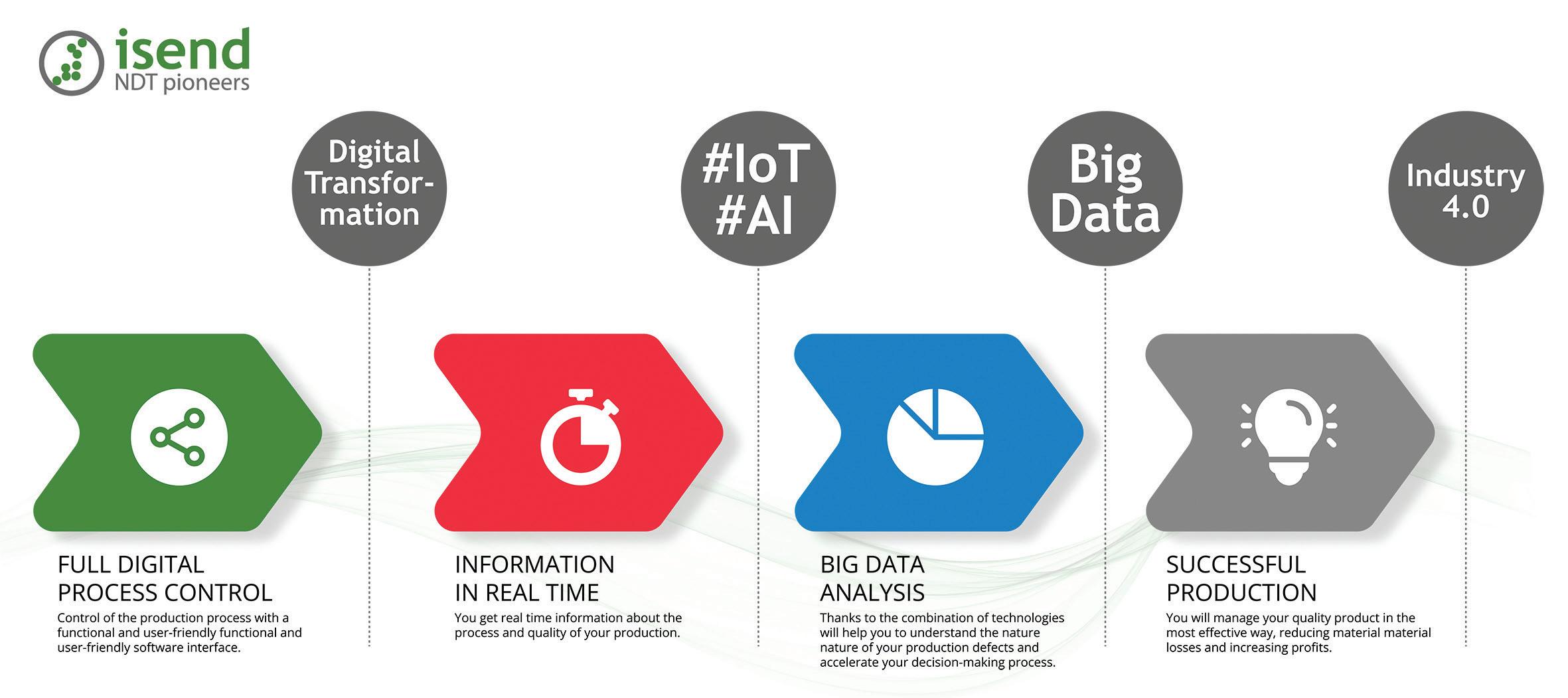
INTERVIEW | 57 www.tubepipeindia.com TUBE & PIPE INDIA • DEC - JAN 2023
“Integrating smart and digital new technologies and bringing novel innovations are the ‘strategic point of view’"
Mechatronics to Set Up a Manufacturing Unit in India
Mechatronics Industrial Equipment is a one-stop solution provider for industrial automation. Over the years, Mechatronics has strengthened its operation by providing critical turnkey solutions in pneumatics, hydraulic, electrical, and electronics applications with its wide range of products, competent team of engineers, and modern machinery. The company operates in India under the name of Mechatronics Control Equipments India Pvt. Ltd. In a conversation with Tube & Pipe India, Mr. Lokesh D, Vice President, Mechatronics Control Equipments India Pvt. Ltd. shares interesting details about the company’s operations in the country.
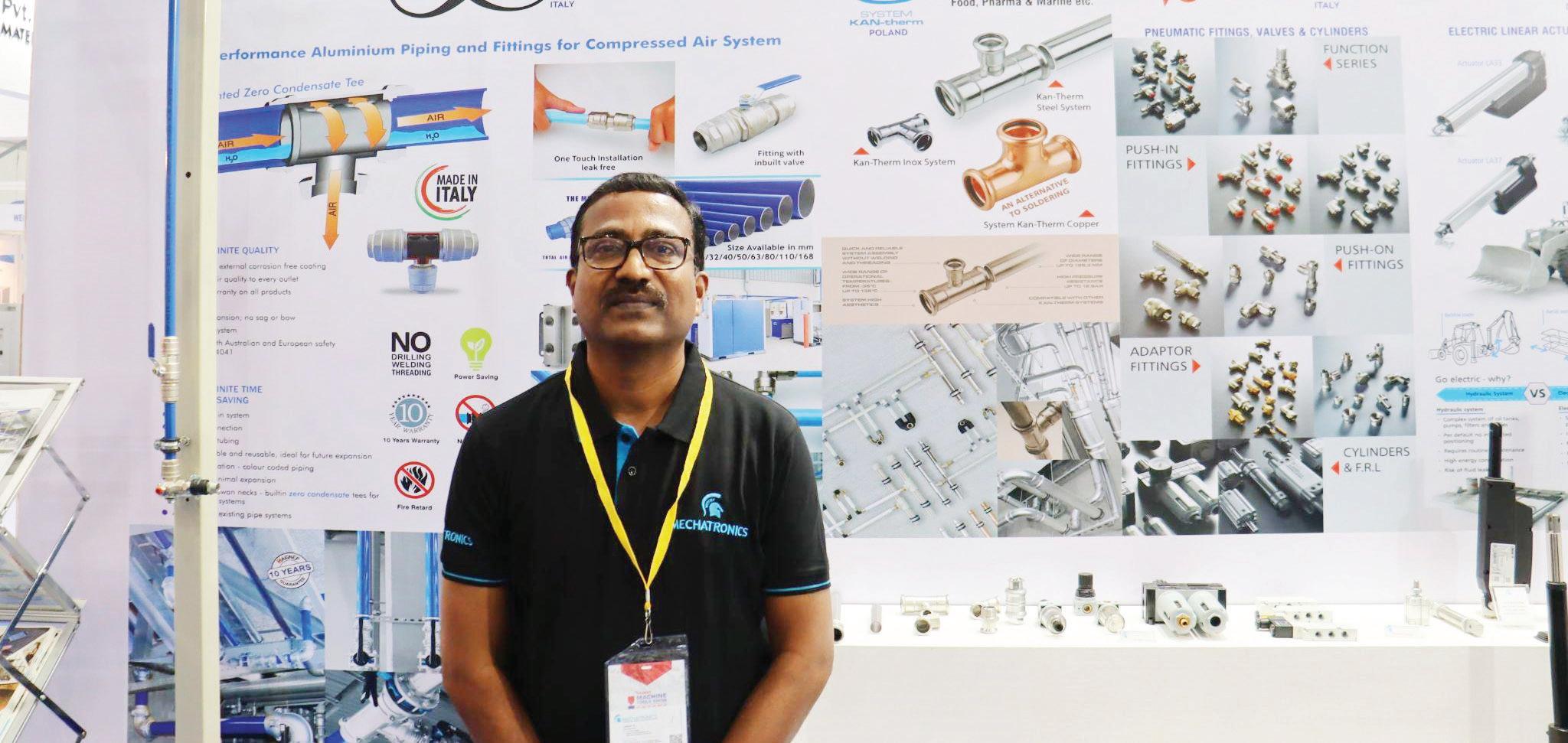
58 | INTERVIEW TUBE & PIPE INDIA • DEC - JAN 2023 www.tubepipeindia.com
“We take due care that our services meet the requirements of the customers in every way possible!”
Tube & Pipe India: Could you please give us a brief outline of your company along with future plans?
Lokesh D: Dubai-based Mechatronics started its operations in India in 2008 with its headquarters in Chennai. Talking about our sales, we cover all major regions in India. As a group, our revenue is around USD 25 million. We have around twenty-two different products for industrial automation for which, we are a pan-India business partner. We mostly deal with European products.

In the first quarter of 2023, we will come up with our own manufacturing unit in Chennai. The plant will be equipped with in-house CNC machines for the production of hydraulic cylinders. In the future, we might also export the products manufactured at the facility. Besides our own manufacturing plant, we would also come up with a few joint ventures in India.
TPI: What has persuaded you to invest in India in such a big way?
LD: It is projected that India is going to be a major manufacturing hub. Additionally, there are a lot of transformations happening globally which will push forward India’s focus on manufacturing. We want to capture this opportunity and tap the Indian market by setting up our own manufacturing unit.
TPI: Tell us about the product range of the company along with the USPs.
LD: Our product portfolio includes compressed air pipelines made of aluminum. We procure the air pipelines from Aignep-INFINITY, Italy. The non–corrosive extruded aluminum provides structural strength and delivers contaminate-free fluid in a leak free piping system. Easy install fittings and patented zero condensate tee, all go together to keep the fluid flow laminar by reducing turbulence, minimizing pressure drop, and removing condensation.
Another product is specifically for water and chemical industry-related applications. Apart from this, we provide critical turnkey solutions in pneumatics, hydraulic, electrical and electronics applications. Some are vacuum technology products that are used for industrial and automation purposes.
TPI: Could you enlighten us about the clientele of your company?
LD: We supply our products to various renowned players such as JSW, Hitachi, Reliance BP Mobility Ltd, and Bharat Forge and have around 400 clients in India who regularly buy from us. Be it the public sector units or private companies, we are present everywhere in the country. Last year, our revenue was INR 16 crore and we expect to reach INR 20 crore this year.
TPI: What opportunities do you see in the tube & pipe industry and how do you plan to make the best of it?
LD: Earlier, GI pipes were used for compressed air pipelines; however, now people are gradually shifting towards aluminium. In my understanding, aluminium has huge growth potential in the tube & pipe industry. We will be strongly focussing on all hydraulic products that we intend to come of our own. Slowly, we will check the possibility of doing value addition in the products that we import, so that we are able to give a quality product to our end users. We want to focus on the AignepINFINITY compressed air pipelines, which is their patented technology that assures a leak-proof warranty of 10 years. We had undertaken some installations of these about ten years ago and didn’t receive any complaints from the customers yet. In fact, we get repeat orders from most of the customers and they seem happy with our workmanship. We take due care that our services meet the requirements of the customers in every way possible!
INTERVIEW | 59 www.tubepipeindia.com TUBE & PIPE INDIA • DEC - JAN 2023
LN Tech Solution to Ramp Up its Manufacturing
LN Tech Solution is a newly established company that provides sheet metal solutions to a variety of industries across the country. The Gujarat-based company, established in 2020, provides advanced equipment with cuttingedge technology for metal operations such as laser cutting, laser marking, and laser welding, as well as NC/CNC press brake and punching machines. The company also sells laser consumables, which are important components of high-tech systems. In a conversation with Tube & Pipe India, Mr. Harmesh L. Patel, Director, LN Tech Solution shares interesting developments about the company.
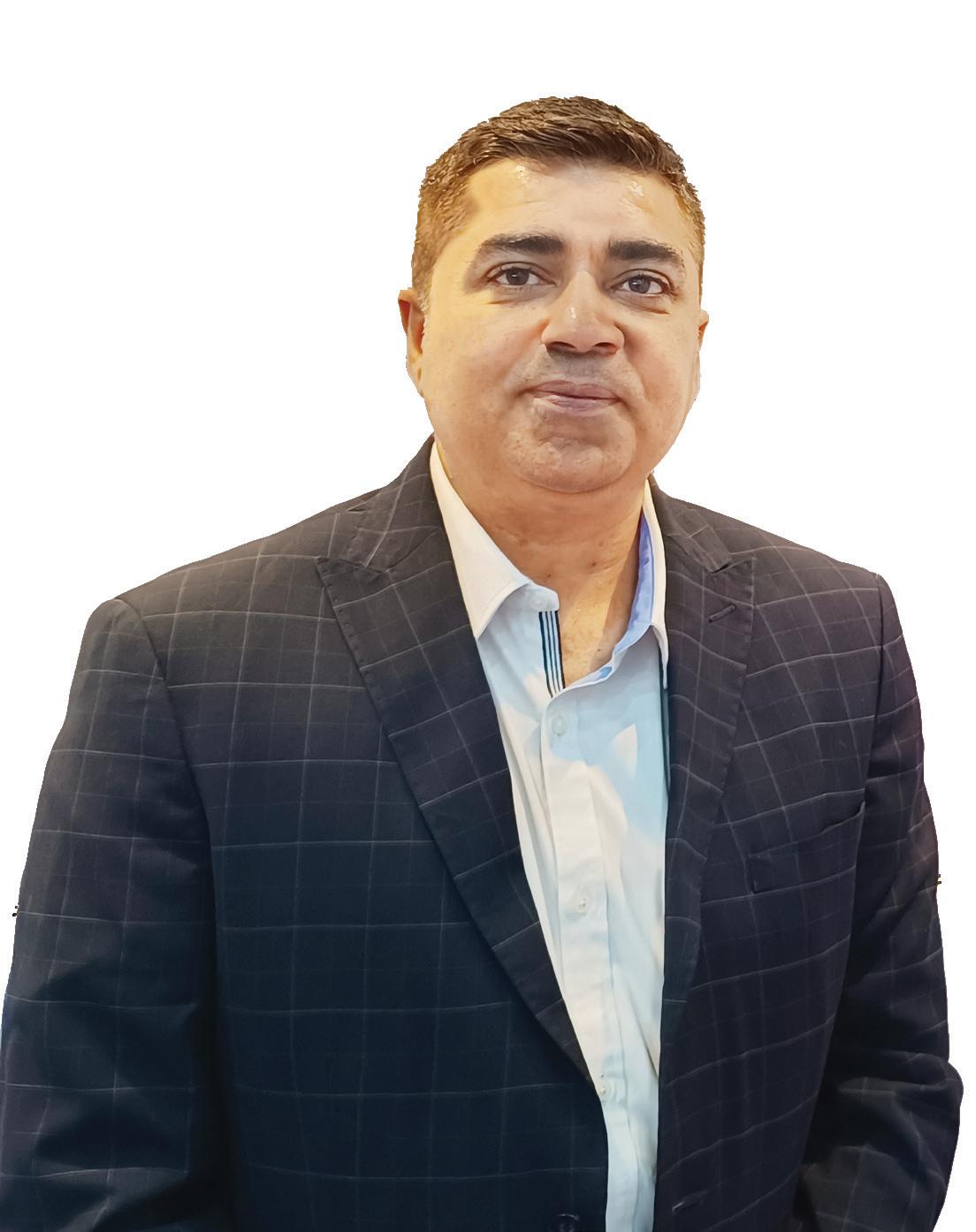
60 | INTERVIEW TUBE & PIPE INDIA • DEC - JAN 2023 www.tubepipeindia.com
“We have reached to a good turnover in the last fiscal year and we are aiming to have a growth of around 70-75% this year.”
Tube & Pipe India: Could you please give us a brief outline of the business journey of LN Tech Solution?
Harmesh L. Patel: LN Tech Solution is a one-and-ahalf-year-old company. It is a manufacturer and supplier of laser pipe-cutting machines, laser welding machines, repair services, etc. Talking about my journey, I’ve been in the field of lasers for the last 18 years. Being a technical person, I've closely seen the needs as well as the ups & downs of the industry.
TPI: Kindly cast some light on the infrastructure of the facility.
HLP: We are basically located in Ahmedabad, Gujarat. Our office is in Kathwada GIDC, which is a prime industrial location. Besides in-house manufacturing, we also import a few of the machines. While we make small machines right now, we aspire to manufacture large machines in the near future. We have a space of around 1000 sq ft available at our facility.
TPI: Tell us about your product portfolio and its applications.
HLP: We deal in sheet metal working machinery and our specialization is in the laser sector. We cater to almost all the key industries like engineering, aerospace, kitchen equipment, and pharmaceuticals with various products like laser cutting systems for sheets, laser pipe cutting machines, laser CNC press brakes, punching machines, laser marking machines, etc. Our company is a one-stop solution provider for the sheet metal industry.
TPI: What are the recent developments and future plans of your company?
HLP: Recently, we have launched a new product for the Indian market – a pipe-cutting machine that can process six-meter-long pipes. It’s a very good product for the industries that are manufacturing end products from pipes like gym equipment, bicycles,
and automobiles. I am sure all such sectors will benefit from this product. In the future, we might expand the production of these machines. Our aim is to expand our manufacturing operations. We have looked for a bigger space at Kathwada GIDC and we are going to manufacture many of the machines that we currently import to India.
TPI: Could you shed some light on the clientele and market footprint of LN Tech Solution?
HLP: Talking about our client base, there are various companies from different industries such as engineering, pharmaceuticals, and kitchen equipment. Most of these companies happen to be from the MSME sector. We are promoting our products to the MSME sector so that they can build good machines with our machinery and cater to the international markets along with their domestic market reach. We have sold tube & pipe laser cutting machines in Delhi and Ahmedabad. Most of them are manufacturing furniture or gym equipment.
TPI: Share your outlook on the tube & pipe industry.
HLP: The tube & pipe industry has a very good position in India. Nowadays, it has become a very important part of any machinery. Earlier, if people wanted to make any structure, they used sheets, but now they use tubes & pipes as it is not only flexible but also easier to process. Be it automobile or architecture, every sector is now using tubes & pipes for different applications.
TPI: What is the technology and business roadmap of the Company?
HLP: We have reached to a good turnover in the last fiscal year and we are aiming to have a growth of around 70-75% this year. And for this, we plan to expand our team as well as our product portfolio. Later this year, we would be introducing a new product – CNC pipe bending machines which again play a major role in the tube & pipe industry.
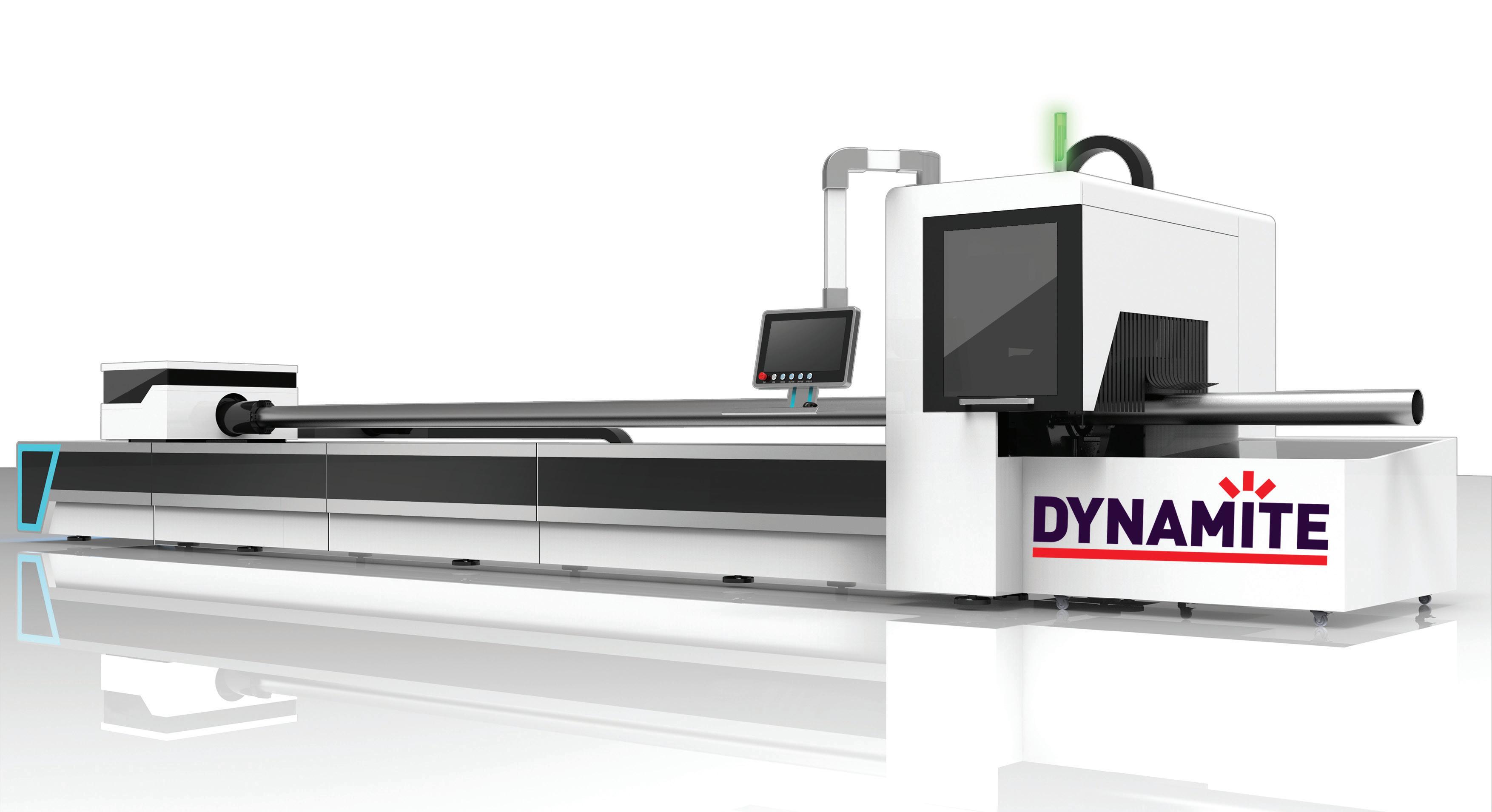
www.tubepipeindia.com TUBE & PIPE INDIA • DEC - JAN 2023
INTERVIEW | 61
Tata Steel’s Jamshedpur Steel Plant – India’s First to Achieve ResponsibleSteel Certification
Tata Steel has received ResponsibleSteel Certification for three of its facilities in Jamshedpur. ResponsibleSteel is a global multi-stakeholder standard and certification programme for steel producers.
Tata Steel has placed India on the global decarbonisation and sustainability map with three of its production facilities in Jamshedpur receiving the coveted ResponsibleSteel Certification. The Company’s Steel Works, Tubes Division, and Cold Rolling Mill (Bara) in Jamshedpur have joined an exclusive group of steel producing sites around the world to receive the ResponsibleSteel Certification, which also includes some of the other renowned steel manufacturers in the world.
ResponsibleSteel is the steel industry’s first global multi-stakeholder standard and certification initiative that works with steel producers, consumers, and intermediaries towards building a sustainable steel industry by addressing pressing challenges including climate change, diversity, human rights, and more.
Mr. T.V. Narendran, CEO & MD, Tata Steel, said, “This is a historic moment for Tata Steel and an important step in our sustainability journey. Globally, the steel industry is at a critical juncture and the larger impact of how we produce and consume steel needs to be
Tata Steel's Steel Works, Tubes Division and Cold Rolling Mill have received the ResponsibleSteel certification.
addressed urgently. For Tata Steel, this has always been a very important part of our journey from when we first produced steel in Jamshedpur in 1912. We are honoured to receive the ResponsibleSteel Certification for three of our facilities and will work towards achieving this recognition for all our production sites.”
Tata Steel has been a member of ResponsibleSteel since October 2020.

In the words of Ms. Annie Heaton, CEO, ResponsibleSteel, “Tata has demonstrated vision, commitment, and investment and has worked incredibly hard to achieve ResponsibleSteel certification for its Jamshedpur site, the first Tata Steel site to be certified and the first ResponsibleSteel certification in India. It isn’t enough to only focus on reduced carbon emissions. Certified sites must also ensure that they are fully aligned with other sustainability objectives in the Standard, for example, ensuring good water stewardship, creating a healthy and safe workplace, safeguarding labour rights, and engaging with local communities and other stakeholders."
Tube Investments of India to Come Up With Electric Heavy Commercial Vehicles
This will be the second venture in the electric vehicle category, the first being an e-three wheeler under the Montra brand.
Tube Investments of India Ltd. (TII) is all set to introduce electric heavy commercial vehicles. This launch will be followed by small electric tractors, as informed by Mr. Vellayan Subbiah, Executive Vice Chairman, TII (Murugappa Group).
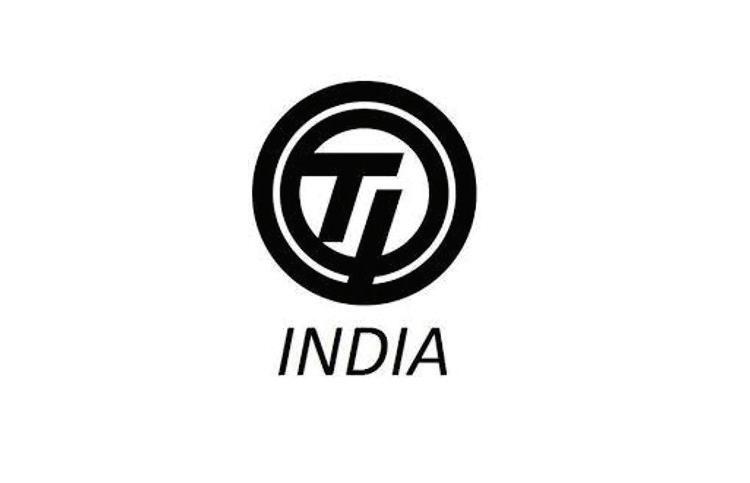
This will mark the second venture by the Murugappa Group in the electric vehicle category, the first being an e-three wheeler under the Montra brand.
Within TII’s vision to boost its presence in clean mobility, TII’s subsidiary TI Clean Mobility Pvt. Ltd. acquired 65.2 percent equity stake in IPLTech Electric (IPLT) in September. Gurgaon-based IPLTech Electric is a manufacturer of electric heavy commercial vehicles.
TII aspires to strenghten its presence in clean mobilty.
Firstly, TII will sell a limited number of trucks – about 30 to 50 a month, as stated by Mr. Subbiah during an earnings call.
There has been a tremendous response in terms of interest in the new product, he said. Also, the company was working on a new facility that would be ready by Q1 of FY24 which would enable them to produce higher volumes.
62 | NEWS TUBE & PIPE INDIA • DEC - JAN 2023 www.tubepipeindia.com
November 2, 2022
November 18, 2022
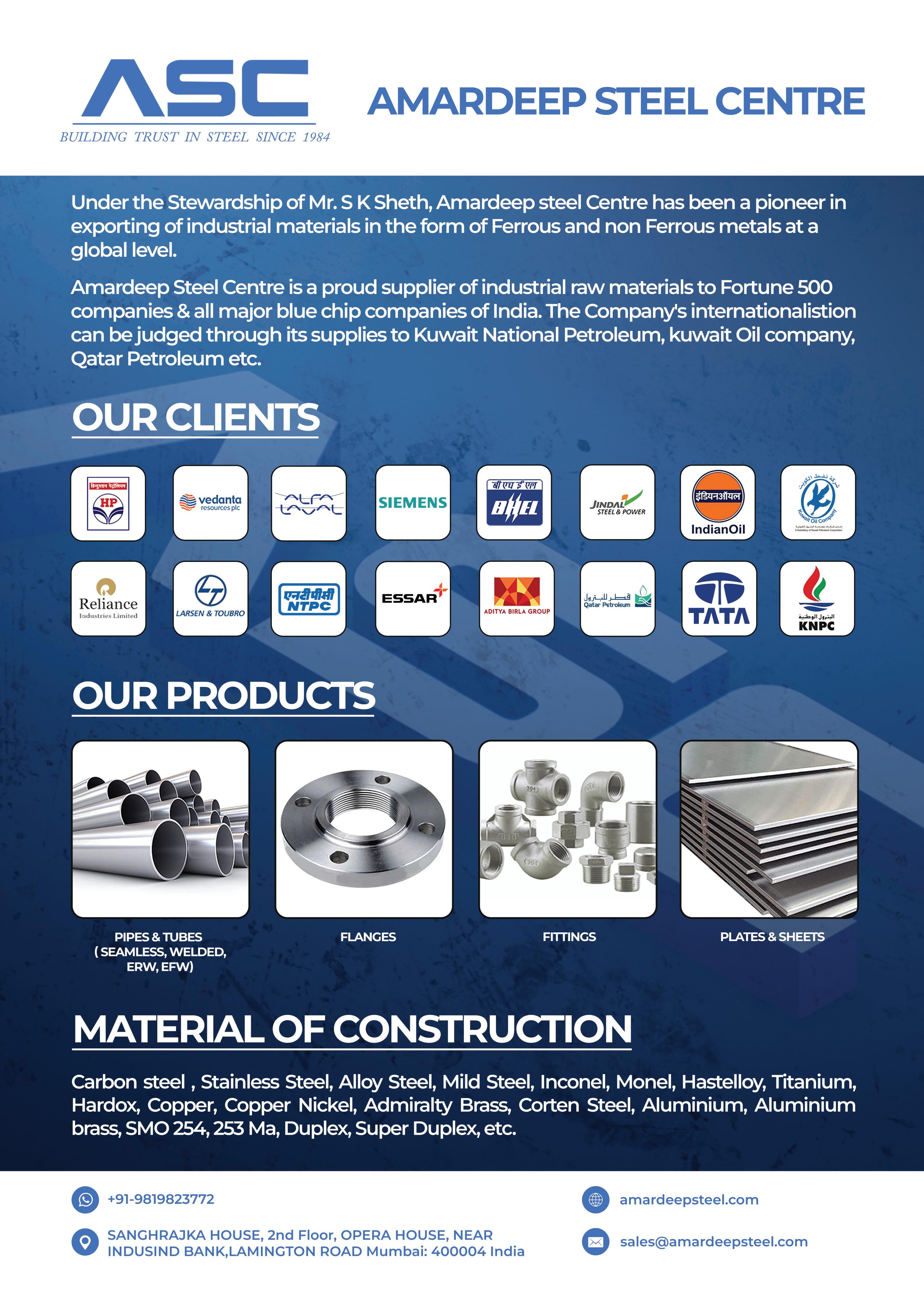
Venus Pipes & Tubes to Undertake Capacity Expansion of INR 50 Cr for Tube Mill
Venus Pipes & Tubes has planned the capacity expansion in addition to the ongoing growth of 600 MT per month of welded pipes up to 48 inches. Afterwards, the total welded capacity will nearly triple from 700 MT per month to 2,000 MT per month by FY24.
Venus Pipes & Tubes Ltd. has approved an investment worth INR 50 crore for capacity expansion to set up a bigger diameter tube mill for the production of stainless steel welded pipes. This new line will expand the existing welded pipe range to a maximum diameter of 20" (508mm) and thicknesses up to SCH80s, with a capacity of 700 MT per month. The project will be supported by a combination of debt (term loan) and internal accruals, with commercial production projected to begin in Q1FY24.
To support the higher dia. welded pipe process, the planned extension will comprise a tube mill as well as the whole finishing infrastructure, including an annealing furnace, pickling and passivation setup, high-end testing, and so on.
This increase in capacity will be in addition to the ongoing growth of 600 MT per month of welded pipes up to 48 inches. After both of these capacity expansion projects are completed, total Welded capacity will nearly triple from 700 MT per month to 2,000 MT per month by FY24.
This capacity increase will provide us an advantage and enable us to capture greater market share in this category, said Mr. Arun Kothari, Managing Director, Venus Pipes & Tubes.
Additionally, the extra 500 MT per month (on top of the existing 300 MT per month) capacity for seamless pipes/ tubes is on track. So, after projected expenditure, the total Welded (2000 MT per month) and Seamless (800 MT per month) capacity will be 2800 MT per month.
Rama Steel Tubes Wins Orders Worth INR 6.7 crore
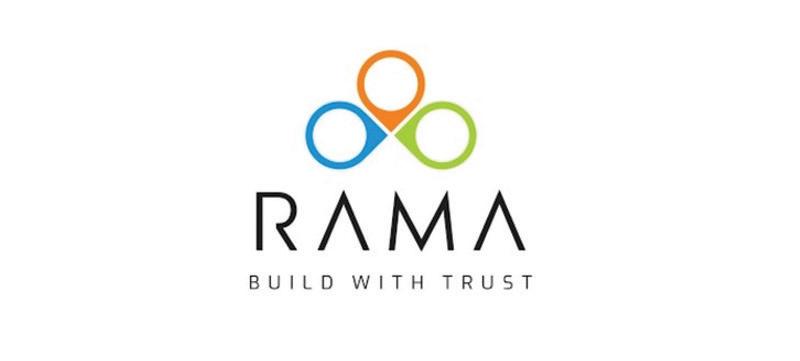
Rama Steel Tubes has received orders for the supply of steel tubular poles from PUVVNL and PVVNL. These orders will further scale up the manufacturer’s order book and credibility in the market.
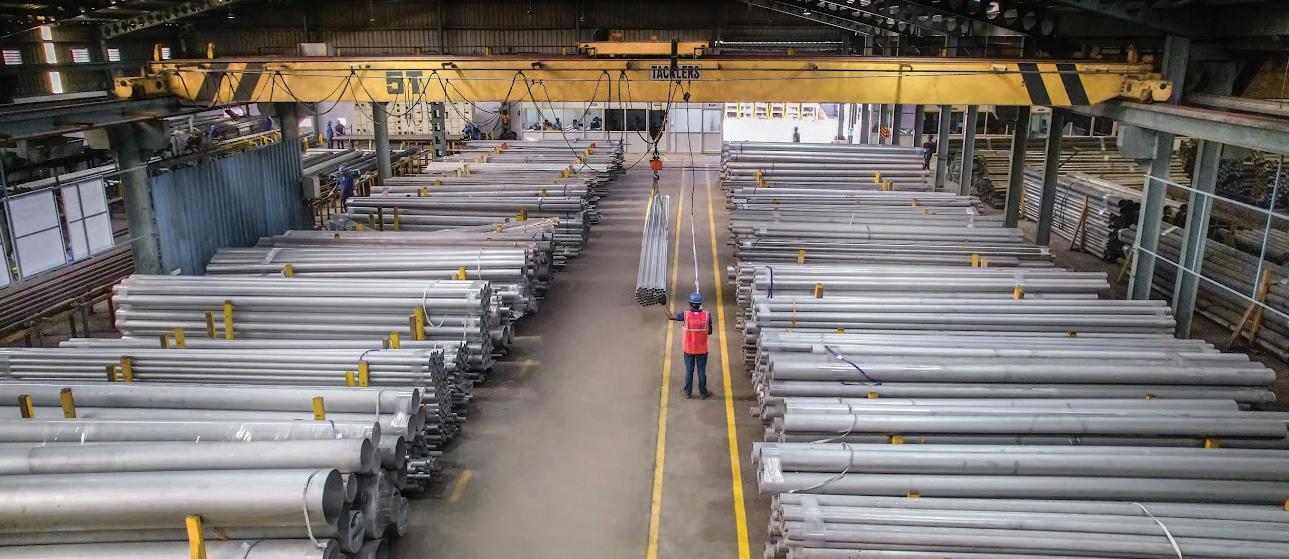
December 7, 2022
Rama Steel Tubes Ltd (RSTL), one of the leading manufacturers of steel tubes and pipes, has won orders from Purvanchal Vidyut Vitaran Nigam Ltd. (PUVVNL) and Paschimanchal Vidyut Vitaran Nigam Ltd. (PVVNL). The aggregate total sum of the orders is to the tune of INR 6.7 crore.
These orders are mainly for the supply of steel tubular poles. These orders will further strengthen RSTL's order book and credibility in the market.
In the words of Mr. Richi Bansal, Executive Director, Rama Steel Tubes, “We are proud to announce that the Company has received orders. Our sustained relation and credibility has yet again fructified in bagging us new prestigious orders.”
Recently, RSTL announced a large-scale capacity expansion project which will add up another 30,000 MT in the Khopoli plant. Also, the manufacturer had begun the setting up of a new manufacturing unit in Nigeria with a capacity of 20,000 MT.
“RSTL has been associated many State Corporations, even in the past and we celebrate our long-standing relationship with them. These orders will help us in strengthening our position and credibility in the market. These orders will also help us in achieving our targeted revenues at a slightly faster rate than what we had anticipated,” Mr. Bansal added.
64 | NEWS TUBE & PIPE INDIA • DEC - JAN 2023 www.tubepipeindia.com
Image Source: Venus Pipes & Tubes
December 19, 2022
Image Source: Rama Steel
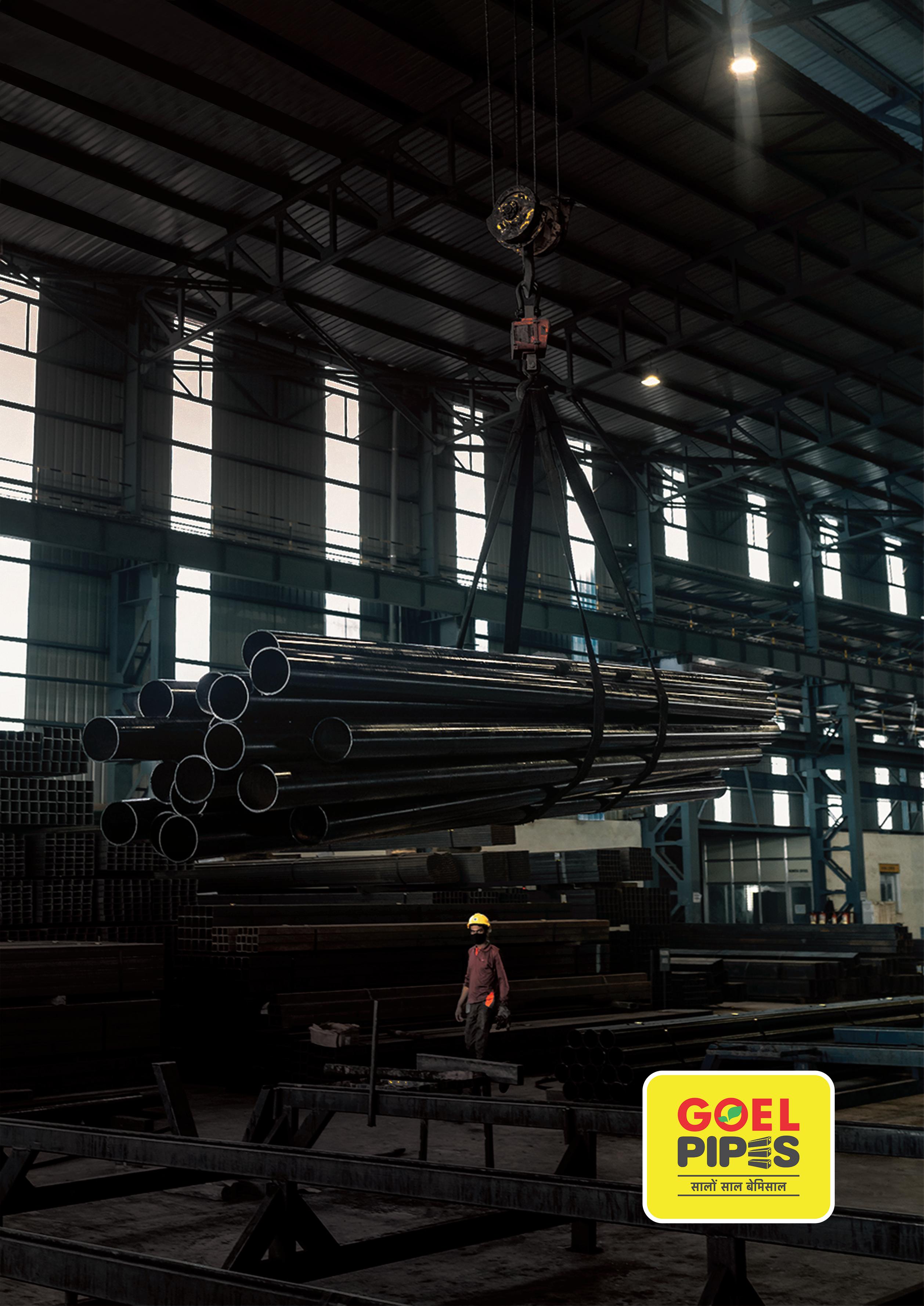



ONGC Videsh to Reacquire a 20 Percent Stake in Sakhalin-1 Oil and Gas Field
ONGC Videsh Ltd has appealed to Russian authorities to retake a 20 percent stake in the Sakhalin-1 oil and gas fields.
ONGC Videsh Ltd. (OVL), the overseas subdivision of Oil and Natural Gas Corporation (ONGC), has put forth an official appeal to Russian authorities to retake a 20 percent stake in the Sakhalin-1 oil and gas fields.
As published in news reports – Russian President Vladimir Putin disbanded Exxon Neftegaz – a regional subsidiary of US super major ExxonMobil – as operator of the Sakhalin-1 and transferred the project and all of its assets and equipment to a new operator.
“ONGC Videsh Board in its meeting held on October 18, 2022, has approved submission of its consent to claim the company's right in Sakhalin-1,” ONGC said in its notes to a stock exchange filing on July-September quarter earnings.
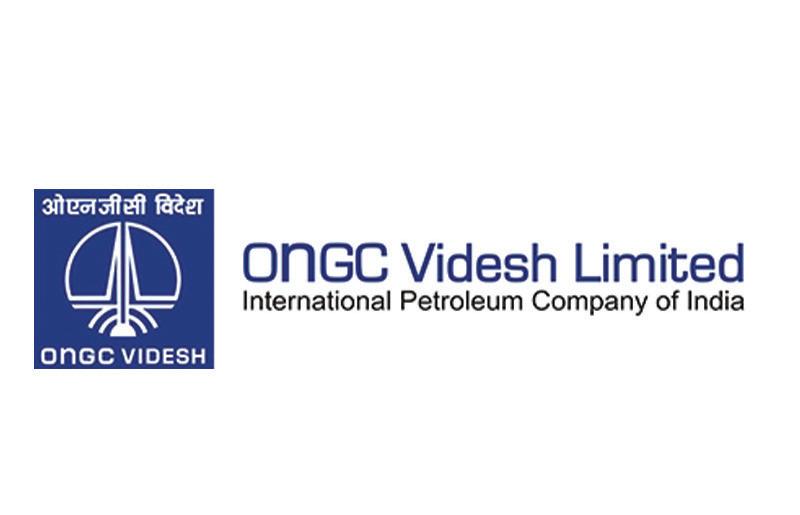
Moscow has assigned a 20 percent stake in Sakhalin-1 and operatorship to a regional subsidiary of Russian oil
producer Rosneft. Russia has asked foreign shareholders in the project – ExxonMobil, Sodeco, and ONGC Videsh – to apply to reinstate their shareholdings in the project before mid-November.
Sakhalin-1 is a large oil and gas field in far-east offshore Russia, spread over 1,140 sq km, which includes three offshore fields namely Chayvo, Odoptu, and ArkutunDagi. OVL acquired a 20 percent stake in the project in July 2001.
Cairn Oil & Gas Bags Production Sharing Contract for Rajasthan Block
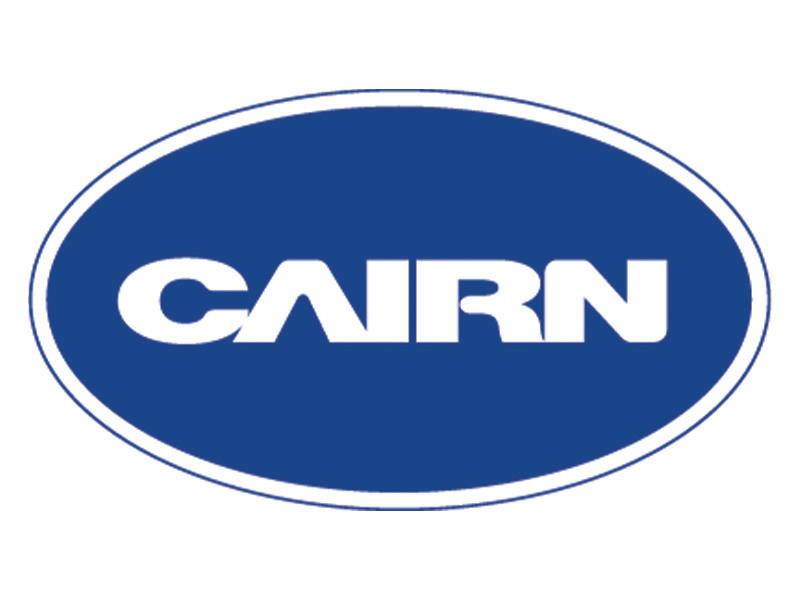
Cairn Oil & Gas recently won eight oil blocks and one coal-bed methane block under the DSF Round III bids, which now makes the company’s total assets in the country to 62.
Cairn Oil & Gas, a Vedanta Ltd. unit, has won consent from the government to extend the Production Sharing Contract (PSC) for its Rajasthan block for ten years until May 2030. As published in a news daily – this contract extension will further boost capex investment and encourage private players to enter the sector, the firm said.
“This extension will be a key determinant in our goal of doubling production, and help India achieve energy atmanirbharta. Home to prolific fields, the bloc demands extensive investment in technologies to enhance recovery. The field also carries potential for new explorations,” Mr. Prachur Sah, Deputy CEO, Cairn Oil & Gas said.
Cairn India won eight oil blocks and one CBM block under the DSF Round bids.
Cairn Oil & Gas recently won eight oil blocks and one coalbed methane (CBM) block under the DSF Round III bids, taking the company’s total assets in the country to 62. Being the largest oil and gas exploration and production company in India, Cairn is already contributing 25 percent of India's domestic crude production, with a vision to take it to 50 percent.
66 | NEWS TUBE & PIPE INDIA • DEC - JAN 2023 www.tubepipeindia.com
Image Source: ONGC Videsh
November 18, 2022
November 5, 2022
www.papermart.in www.papermart.in/emagazine
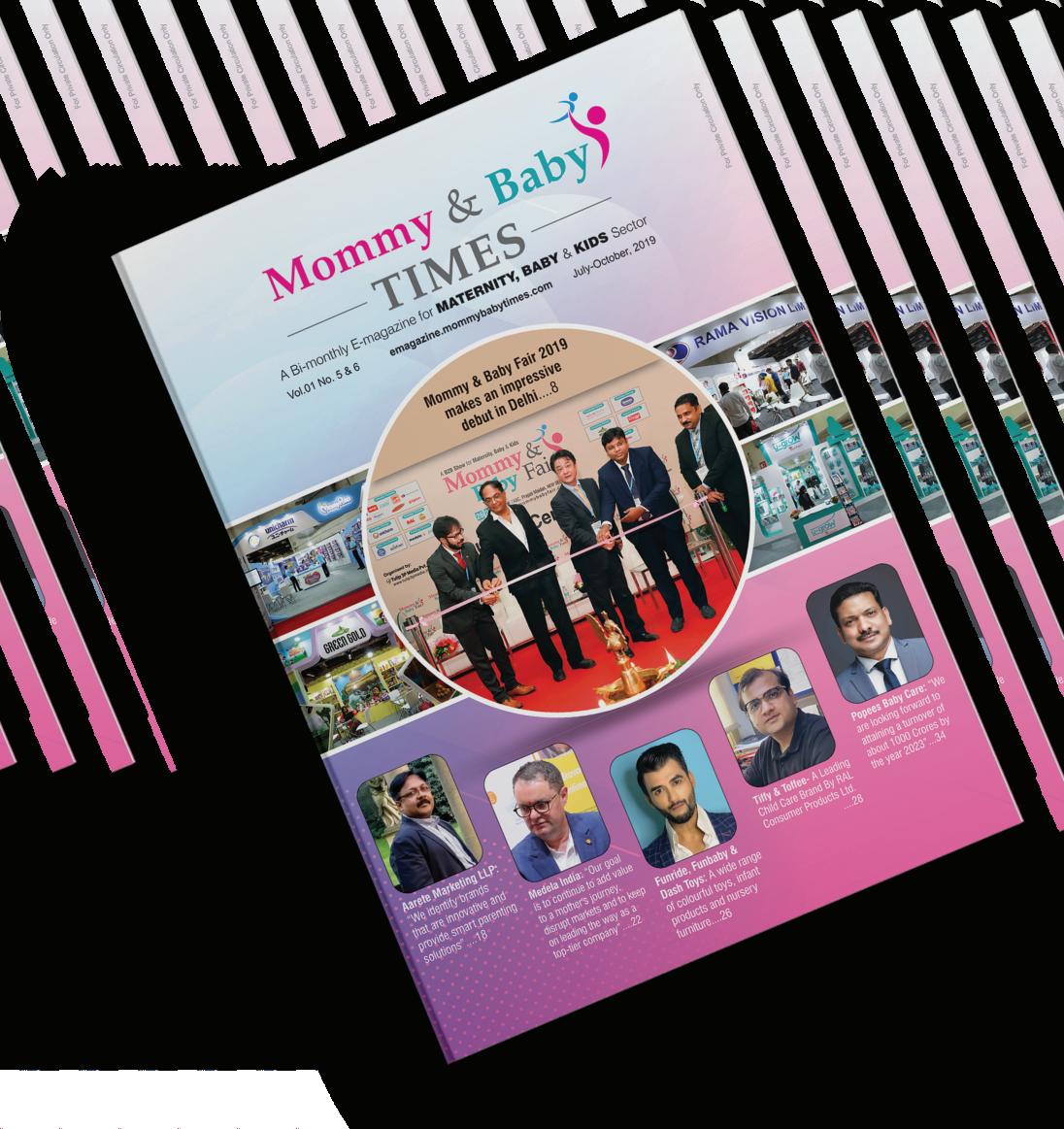

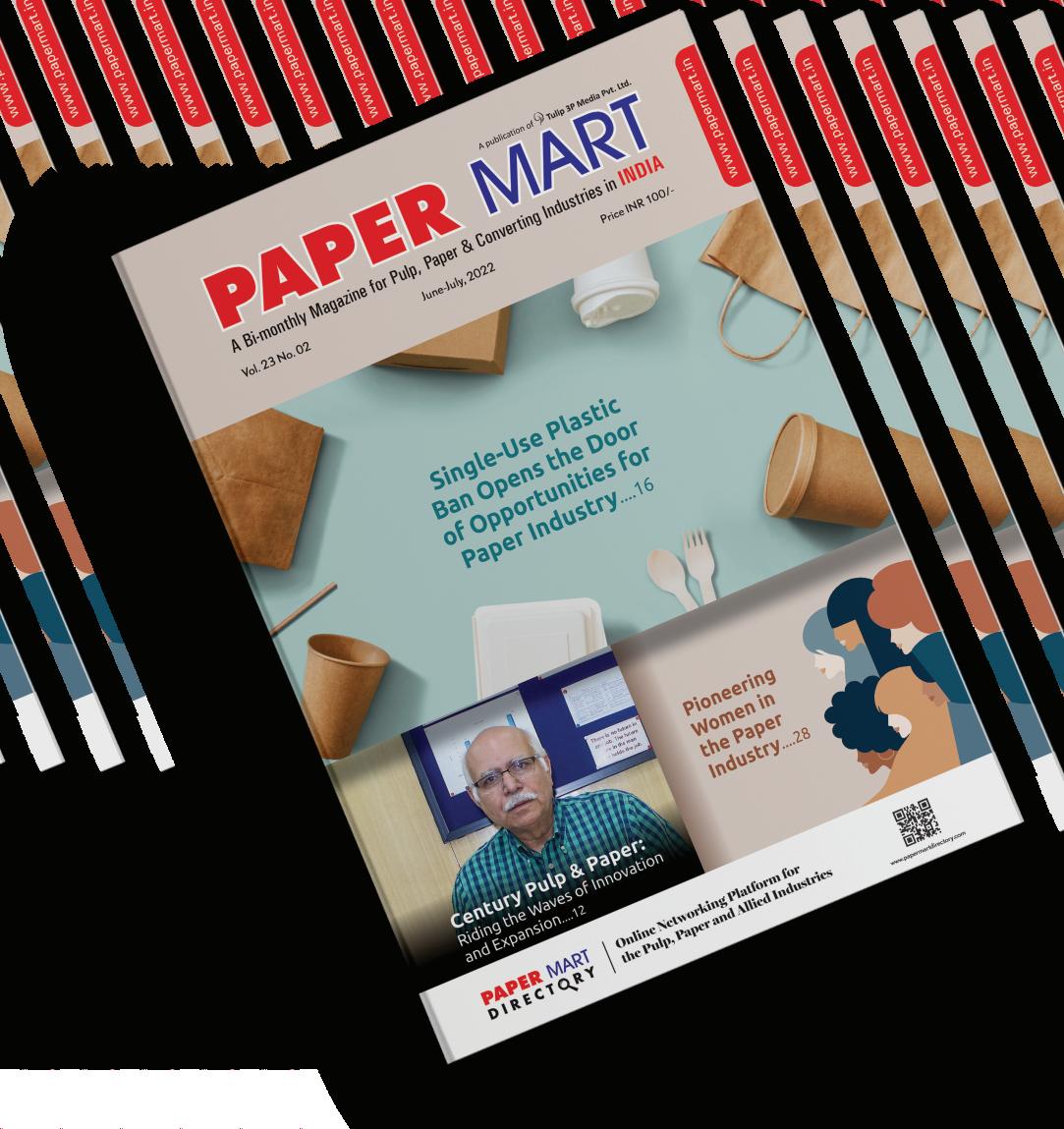
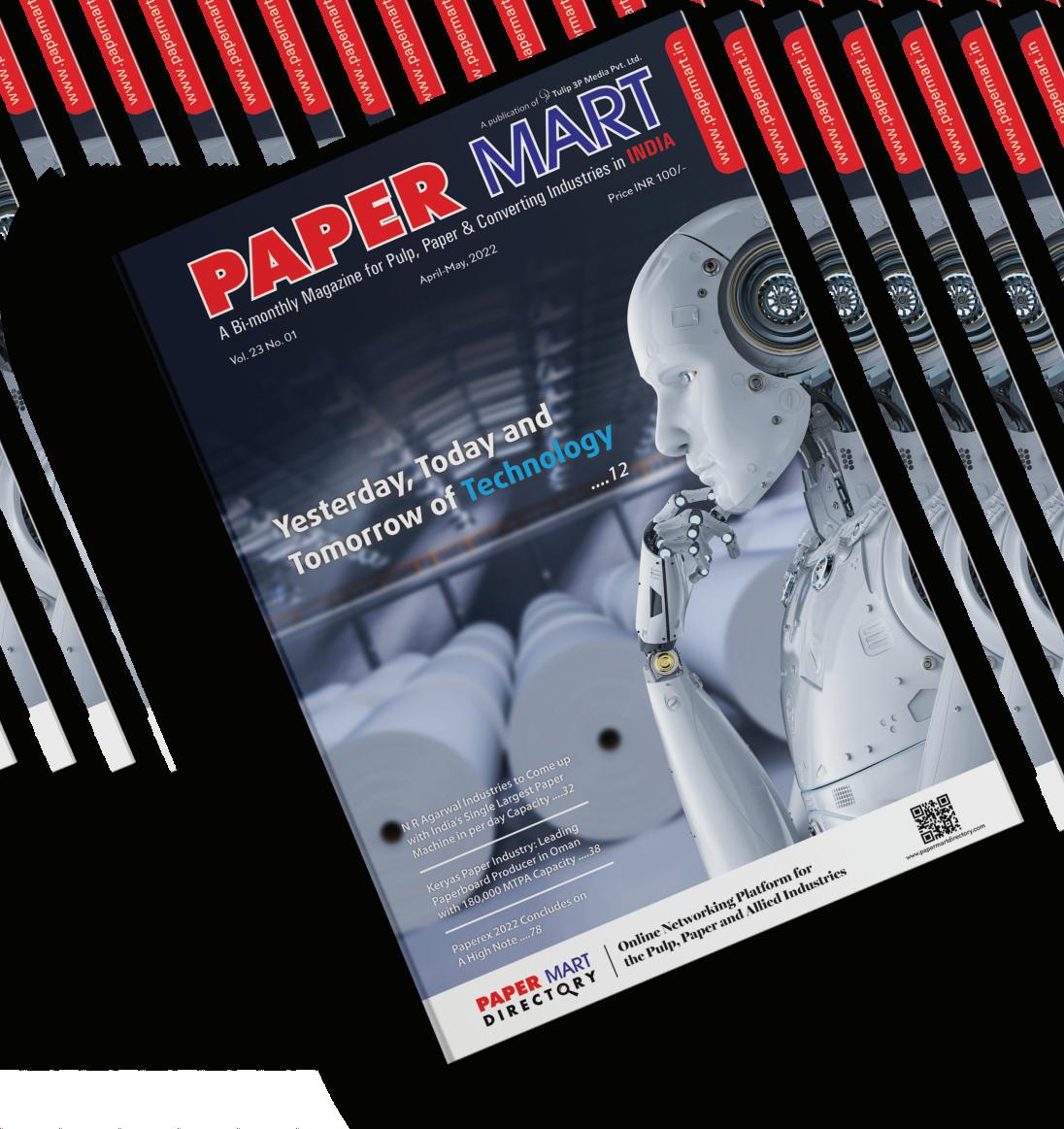
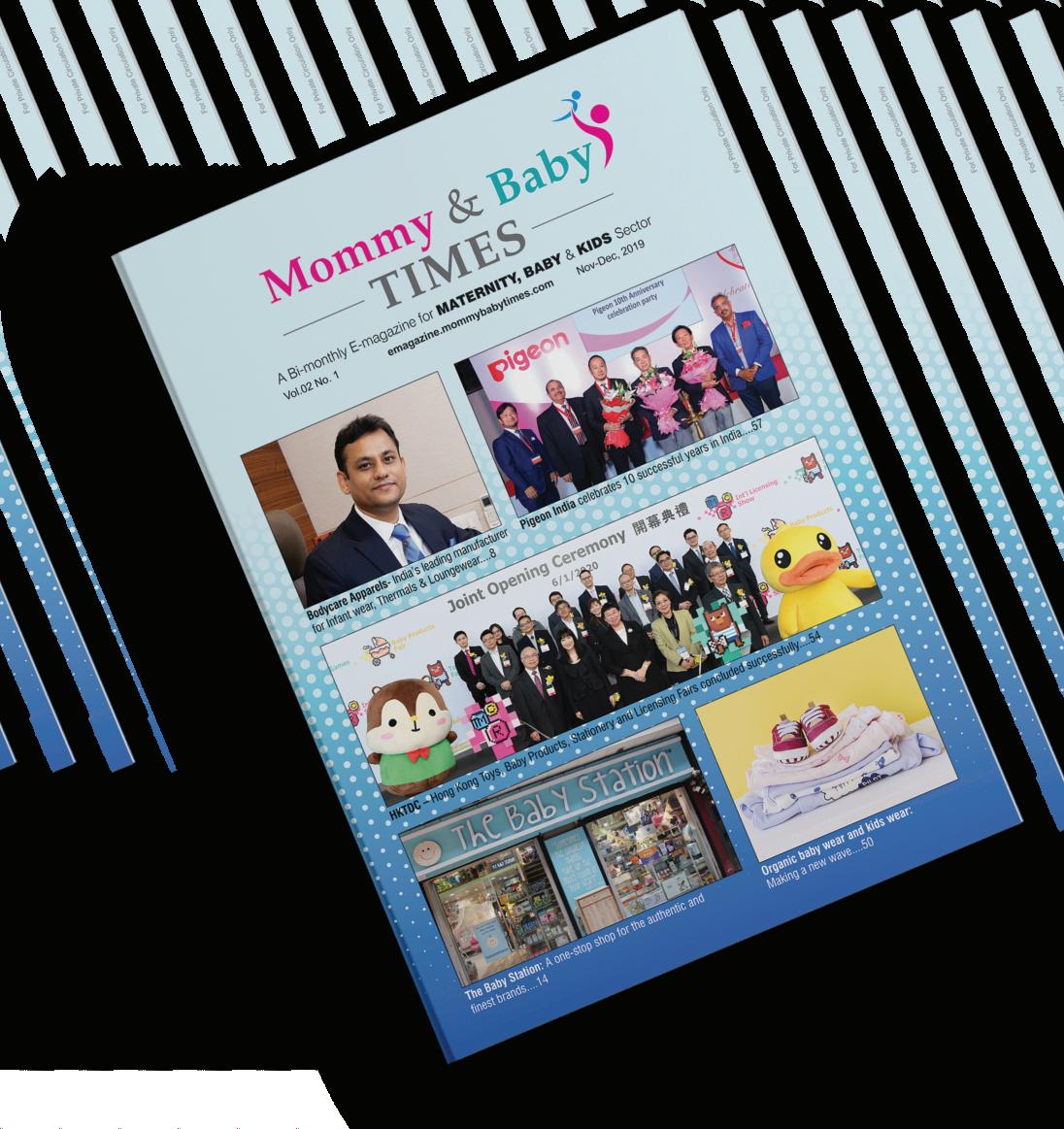
www.wirecable.in www.wirecable.in/emagazine

www.mommybabytimes.com
www.tulip3pmedia.in
Our Publications
Tulip 3P Media Pvt Ltd
Saudi Arabia to Establish a USD 270 mn Stainless Seamless Pipe Plant
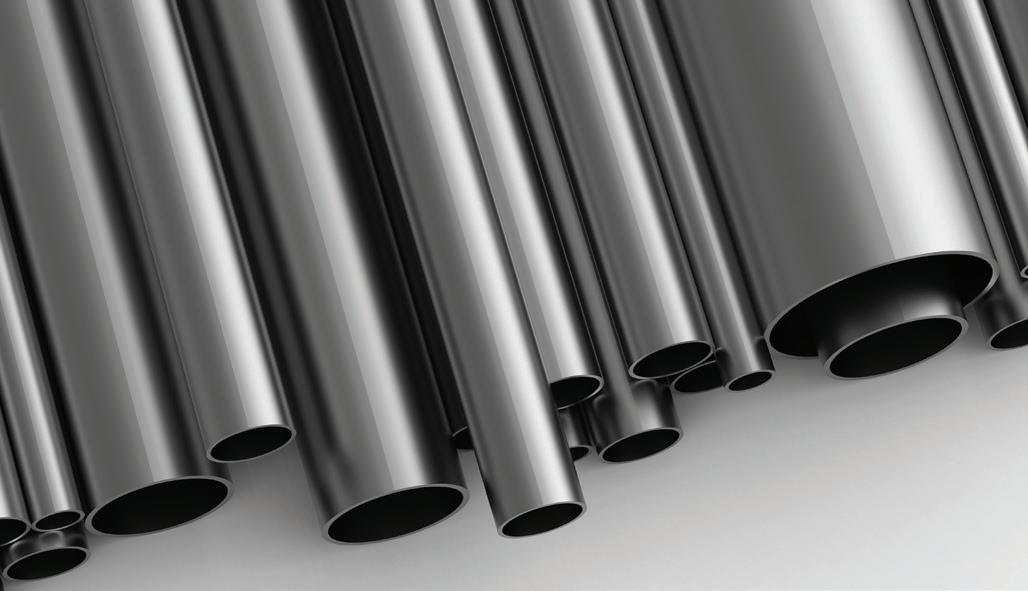
The pipe manufacturing plant will be set up in a joint venture between SeAH Gulf Special Steel and King Salman Energy Park.
Saudi Arabia’s King Salman Energy Park (SPARK) has signed an agreement with SeAH Gulf Special Steel to establish a seamless stainless steel pipe factory at an investment of 1 billion Saudi riyals (USD 270 million).
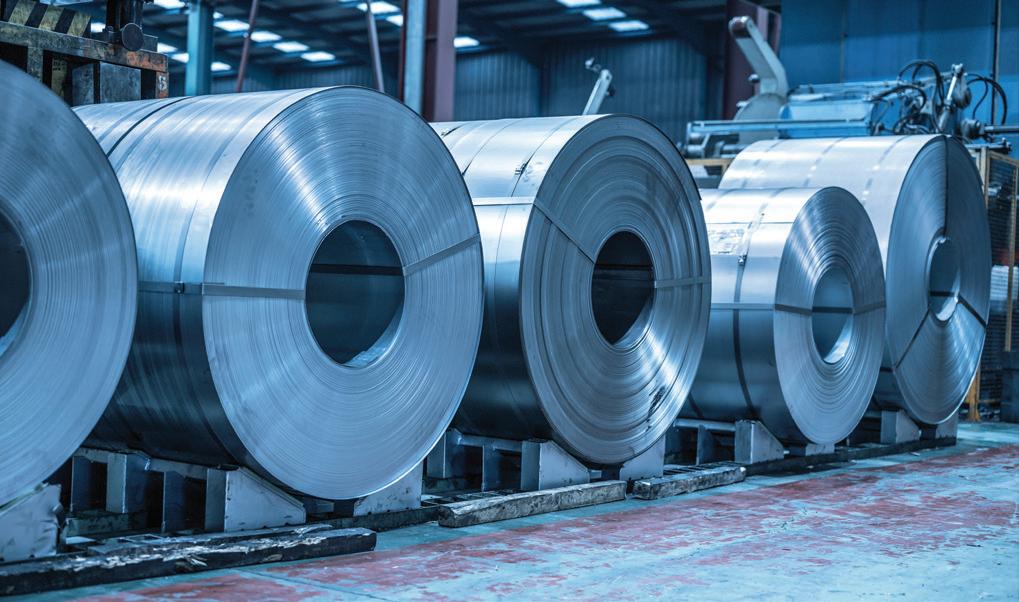
King Salman Energy Park, a new megaproject, is being constructed and located between Dammam and Al-Ahsa in the Eastern Province of Saudi Arabia.
SeAH Gulf Special Steel is a joint venture between the UAE's SeAH Steel and the Saudi Arabian Industrial Investments Company (Dussur).
In a tweet, SPARK asserted that the seamless stainless pipe manufacturing project will help localise a strategic industrial segment, which supports the energy sector and enable knowledge transfer in the Kingdom of Saudi Arabia (KSA).
The contract was signed on the sidelines of the second Saudi International Iron and Steel Conference in Riyadh as part of the National Steel Strategy under the Vision 2030 program.
A press statement by the Ministry of Industry and Mineral Resources informed that the projects planned by KSA include an integrated steel plate production complex with an annual production capacity of 1.2 million tonnes to supply manufacturers of oil pipelines, platforms, and storage tanks, and the shipbuilding industry. In addition, a steel rolling mill with a production capacity of four million tonnes of hot rolled coils and one million tonnes of cold rolled coils, is also planned. Further, 200,000 tonnes of tin-plated steel to serve automotive, food packaging, household appliances, and water pipe manufacturers and a steel billets plant with a production capacity of one million tonnes per year to support the manufacture of seamless steel pipes for the oil & gas industry.
Jindal Steel and Power to Infuse INR 7,930 crore under PLI Scheme
Being a qualifier under the PLI scheme, Jindal Steel and Power will make HR coil, sheets, and plates API GR which is used in the oil & gas sector.
Jindal Steel and Power Ltd. (JSPL), part of O.P. Jindal Group, has announced its plans of investing INR 7,930 crore under the PLI scheme for speciality steel. The capital will be utilised in the manufacturing of eight different kinds of high-end alloy in India – according to media reports.
JSPL is one of the qualifiers of the government’s Production Linked Incentive (PLI) scheme. The steel manufacturer aspires to increase the output of valueadded steel using new age technologies in the domestic steel sector.
As for the details of the alloy grades, Mr. Bimlendra Jha, MD, Jindal Steel and Power, asserted that the company
will make “HR coil, sheets and plates API GR which find application in sectors like oil and gas”. The high tensile sheets which the company would be manufacturing under the PLI scheme find applications in structural grade fabrication and the automobile industry, Mr. Jha said.
68 | NEWS TUBE & PIPE INDIA • DEC - JAN 2023 www.tubepipeindia.com
Image Source: Freepik
October 31,
2022
Image Source: Freepik
December 21, 2022













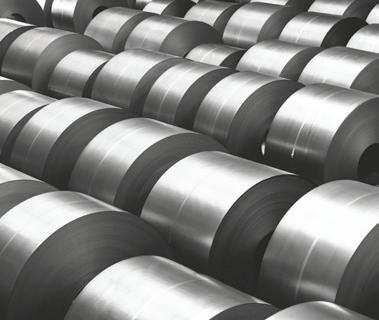
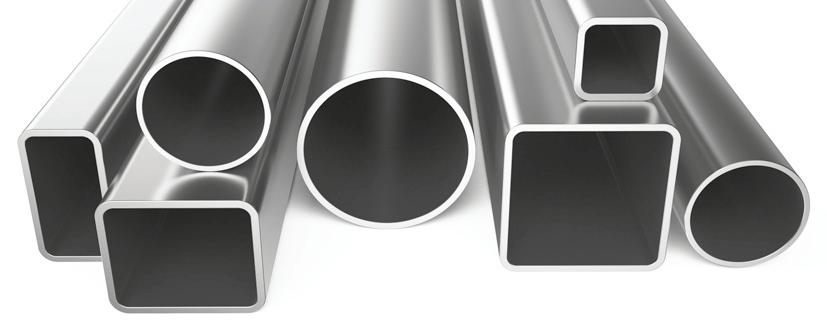
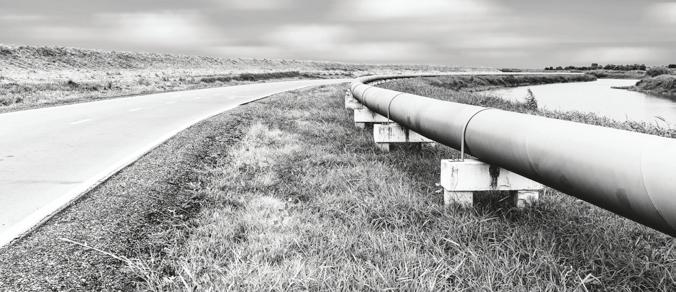
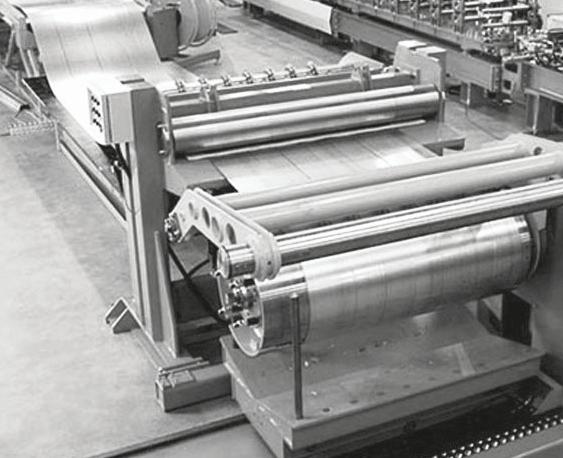
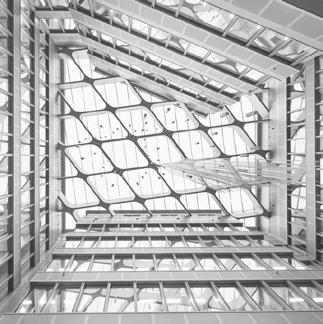
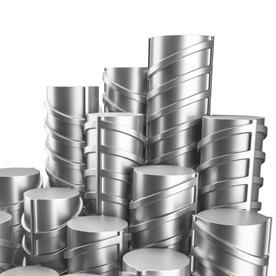
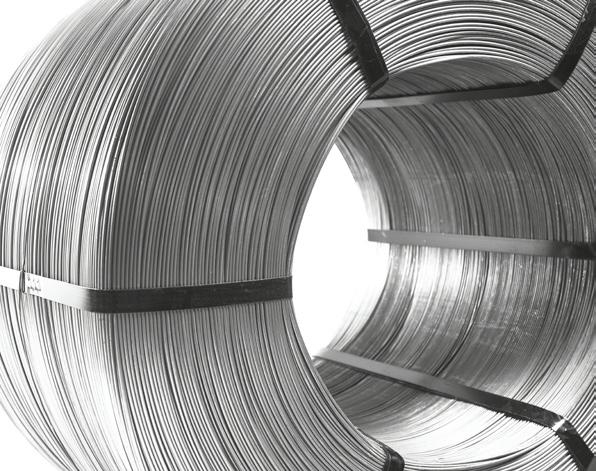




Kirloskar Ferrous to Merge the Operations of Indian Seamless Metal Tubes

As per the decided merger, Kirloskar Ferrous Industries will acquire all the assets and property of Indian Seamless Metal Tubes.
Pune-based Kirloskar Ferrous Industries Ltd. (KFIL), a leading pig iron and castings maker, has announced the plan of the merger to amalgamate and consolidate the business operations of Indian Seamless Metal Tubes Ltd. (ISMT). As per a news daily, the decided date for the said scheme is April 1, 2023. Thus, all the assets and property owned and managed by ISMT would be taken over by KFIL. Moreover, all the liabilities of the ISMT immediately before the merger appointed date shall stand transferred to KFIL.
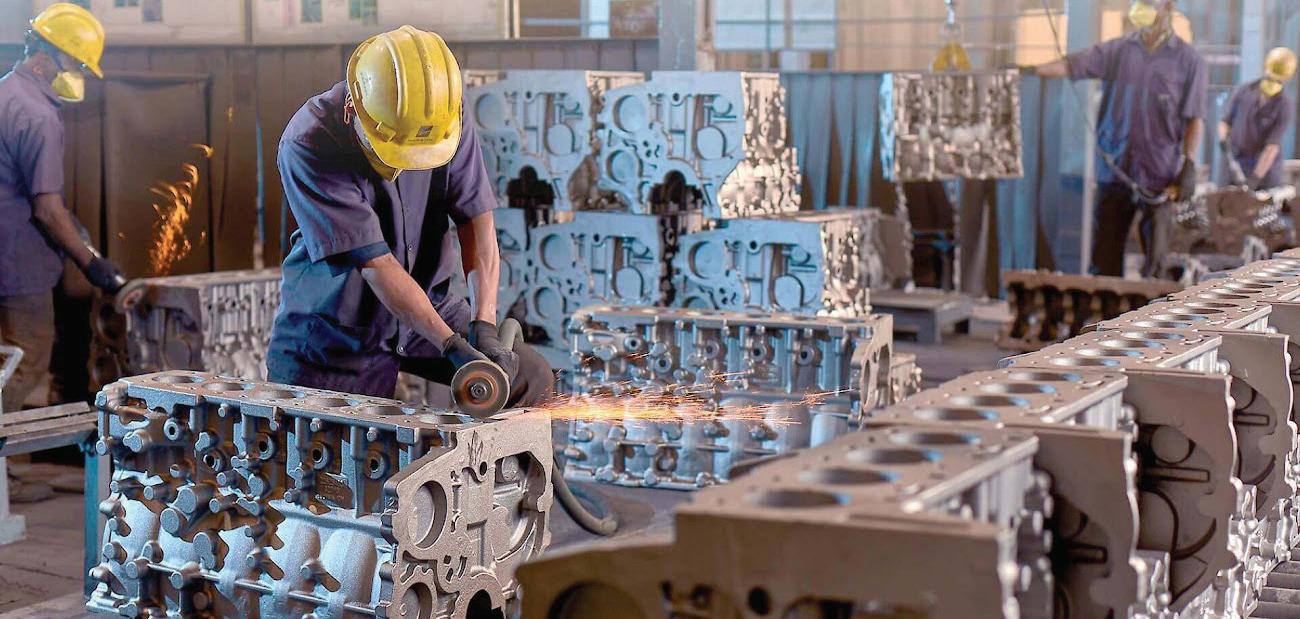
TSpeaking about the merger, Mr. Atul Kirloskar, Chairman, KFIL, said, “We acquired ISMT in March 2022, to enter into the seamless tubes market. For KFIL, this was a step towards forward integration and product diversification. On the other hand, for ISMT, this was a step towards backward integration.”
Mr. Kirloskar further added that the acquisition has brought an opportunity to integrate iron ore to seamless tubes. In this direction, the Company is proposing to integrate the entire business under the umbrella of Kirloskar Ferrous Industries Ltd. to reap the synergies between the two businesses.
In the words of Mr. R.V. Gumaste, Managing Director, KFIL, “As we complete two-quarters of the full operations of ISMT post-acquisition, our team has ensured smooth operations and is confident to move ahead in line with our expectations. We believe, the merger will result in a financially robust entity with a broader customer base covering the entire value chain. This will also help us improve operational efficiencies through standardization and simplification of business processes.”
Established in 1991, KFIL is one of India’s largest castings and pig iron manufacturers. The company caters to various industry sectors, such as tractors, automobiles, and diesel engines. SMT is the largest integrated specialized seamless tube producer in India. Being one of the most diversified manufacturers of specialized seamless tubes in the world, ISMT produces tubes in the range of 6-273 mm diameter.
JSW Steel to Establish a Facility in Andhra Pradesh, Entailing Investment of INR 8800 Cr
JSW will infuse the investment into the JSW Steel factory project which will be undertaken in two phases. The proposed investment has been approved by Andhra Pradesh SIPB.
The Andhra Pradesh State Investment and Promotion Board (SIPB) has approved two proposals along with other proposals with an aggregate investment of INR 23,985 crore – as published in media reports. Out of this, INR 8800 crore will be invested by JSW Steel, while Adani Green Energy Sectors and Shirdi Sai Electricals are also involved in their respective investments in the overall investment.
Steel manufacturer JSW Steel Ltd., the flagship company of JSW Group, will establish a steel manufacturing facility in YSR Kadapa city in Andhra Pradesh. This will entail a capital investment of INR 8,800 crore.
The JSW Steel factory project will be undertaken in two phases with an annual production capacity of 3 million tonnes.
“The steel project will give direct and indirect employment to thousands of people. We expect the work on the project to be commenced soon. It will benefit the entire Rayalaseema as it would foster several allied industries,” according to the statement of the Chief Minister of Andhra Pradesh Y.S. Jagan Mohan Reddy.
70 | NEWS TUBE & PIPE INDIA • DEC - JAN 2023 www.tubepipeindia.com
Image Source: Kirloskar Ferrous
December
19, 2022
Image Source: JSW Steel
December 12, 2022
Growing

Tulip 3P Media Pvt Ltd Mobile : +91 99999 35011 / 22 / 44, Email: info@tulip3pmedia.in www.tulip3pmedia.in Our Services:• Magazine Publishing • Events • Market Research • Bespoke Publishing • Digital Marketing
An upcoming media company, Tulip 3P Media brings out publications for different B2B verticals. Theactivitiesofthecompanynowembraceeventsandmarketresearchaswell.Tulipiscurrently on its way to further expanding its publication portfolio through publications for other business verticalsandarichofferingofothernichemediaservices.
Our Brands:www.cablewirefair.com Mommy & Baby Fair www.mommybabyfair.com
Magazines Events Online Platform www.papermartdirectory.com FAIR www.tubepipefair.com
with the Industry
www.mommybabytimes.com www.tubepipeindia.com www.papermart.in papermart.in/emagazine www.wirecable.in wirecable.in/emagazine mommybabytimes.com/emagazine tubepipeindia.com/emagazine
Ratnamani Metals & Tubes Takes Up Major Stake in Ravi Technoforge
The process of Ratnamani Metals’ acquisition in Ravi Technoforge will be made in three tranches.
Ratnamani Metals & Tubes Ltd. has signed a definitive agreement for the acquisition of equity shares in Ravi Technoforge Pvt. Ltd. (RTL). The acquisition will be made in three tranches over the period based on the performance metrics and other terms & conditions.
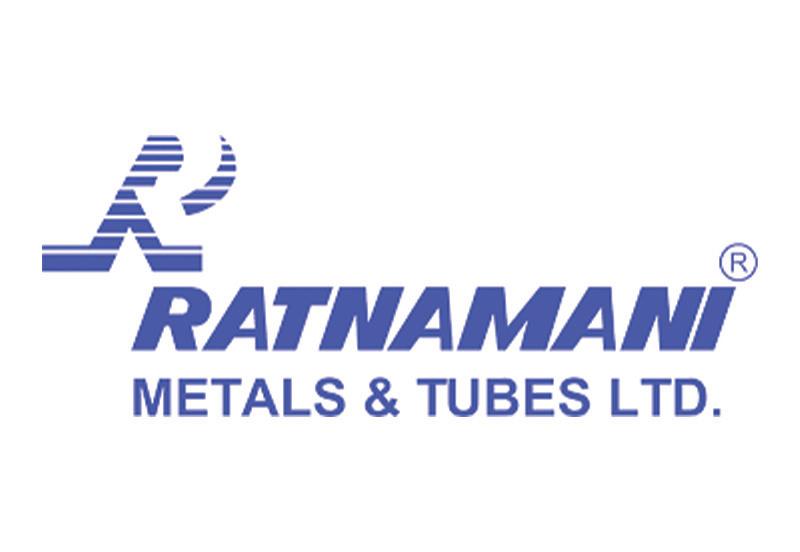
Notably, Ratnamani Metals & Tubes shall hold about 53 percent stake in Gujarat-based RTL. Being one of the leading manufacturers of high precision forged and turned bearing rings, gear blanks and other similar bearing components, RTL caters mostly to all the large bearing manufacturers in India and across the globe. Started in 1990, the Company has the capability of manufacturing rings in the range of 40 mm-400 mm with unit weight up to 25 kg.
In the words of Mr. Prakash M. Sanghvi, Chairman & Managing Director, Ratnamani Metals & Tubes Ltd., “Joining hands with RTL marks the beginning of a new chapter for Ratnamani.”
“The partnership with RTL will not only provide good growth & business opportunities in diverse sectors but
Ratnamani will hold 53 percent stake in Ravi Technoforge.
will further boost the consolidated position of Ratnamani in much more sustainable manner,” Mr. Sanghvi further added.
About the development, Mr. Amrutlal Bharadia, Managing Director, RTL, asserted that by joining hands along with equity, RMTL will also bring their expertise, experience and efficiency standards to RTL and it will help to scale us to new heights and fuel our growth plans. RTL with new growth capital & support from RMTL will work on augmenting capacities, re-organizing business operations more efficiently and enlarging product/process offerings to match customers’ expectations.
Rama Steel Tubes to Pursue Capacity Augmentation of Khopoli Facility
After the completion of the capacity expansion in Khopoli (Maharashtra) and the setting up of the plant in Nigeria, Rama Steel Tubes’ overall annual tube making capacity will be 300,000 MT.
Rama Steel Tubes Ltd. (RSTL), one of the domestically leading tubes and pipes manufacturers, has announced plans to undertake the capacity expansion of its Khopoli plant, which is located in the Raigad district (Maharashtra).

The capacity augmentation will add up another 30,000 MT to the manufacturing capacity of RSTL’s Khopoli plant. The expansion-related works will be completed by the end of the second quarter of FY22-23 while commercial production is slated to commence in the third quarter of the fiscal.
Additionally, Rama Steel Tubes’ step-down subsidiary Rama Steel Tubes Industries Ltd (RSTIL) has begun the
setting up of a new plant in Nigeria, South Africa, having an installed manufacturing capacity of 20,000 MT.
Following the capacity expansion and the Nigerian plant becoming operational; RSTL’s overall annual tube making capacity will be 300,000 MT.
RSTL has four state-of-the-art manufacturing units located in Sahibabad, Uttar Pradesh; Khopoli, Maharashtra; and Anantpur, Andhra Pradesh. Also, there is a subsidiary located in the UAE and a step-down subsidiary in Nigeria.
72 | NEWS TUBE & PIPE INDIA • DEC - JAN 2023 www.tubepipeindia.com
November 1, 2022
Image Source: Rama Steel
November 25, 2022
Hariom Pipe Completes Setup of Electric Melting Furnace
With the expansion, Hariom Pipe Industries will be able to expand the production of MS Billets from 95,832 MTPA to 104,232 MTPA.
Hariom Pipe Industries Ltd. (HPIL), a premium manufacturer of iron and steel products, has completed the setup of 15 tonnes electric melting furnace – as published in media reports. This will increase the company’s production of MS Billets from 95,832 MTPA to 104,232 MTPA, the company said.
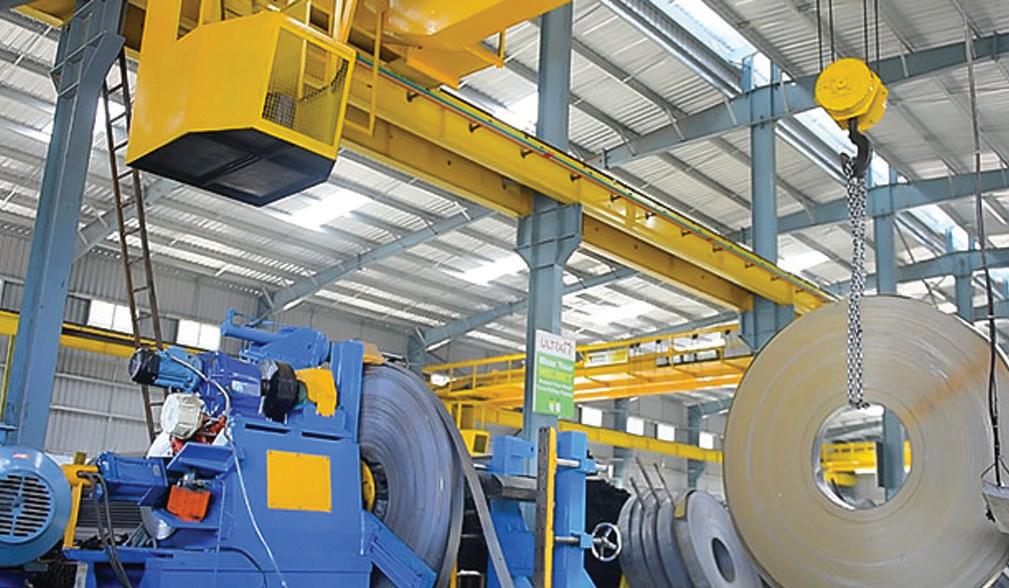
During the July-September quarter, i.e. Q2FY23, HPIL focussed to sell ERW Steel Pipes & Scaffoldings, and thereby, achieved highest ever quarterly sales volume of 15,675 tonnes of ERW Steel Pipes, comprising 77 per cent of the total sales revenue of INR 127 crore.
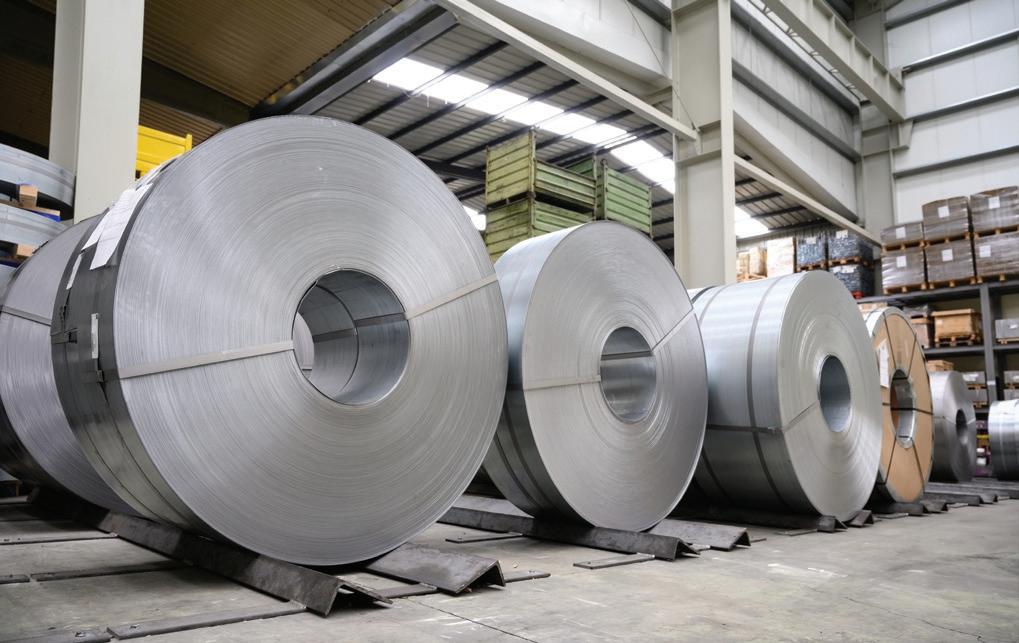
“During the beginning of the quarter, the company witnessed volatile and elevated prices of input materials like coal, energy, iron ore etc. Though all these have stabilized later in the quarter. That apart, we are also in
the process of evaluating the acquisition of an operating manufacturing unit located in South India,” the company added.
Hariom Pipe Industries is one of the most backward integrated steel pipe mill companies. The Telanganabased Company manufactures sponge iron, billets, HR strips, and pipes. With a diverse product portfolio, HPIL caters to a variety of industrial applications across multiple sectors.
JSW Steel Procures Land for Metal Recycling Plant in Maharashtra
JSW Steel has acquired the land at INR 23 crore, which is about 4 km away from its existing integrated steel plant in Dolvi village. The construction of the recycling plant will be completed in 12-18 months.
JSW Steel, the flagship company of JSW Group, is planning to invest INR 175 crore. The funds will be infused in a joint venture with New Zealand-based National Steel Holdings. This investment will be directed towards establishing a metal recycling plant at Pen in Raigad district, Maharashtra.
JSW Steel has acquired a land parcel of 30.5 acres at a cost of INR 23 crore – as published in news reports. The land is about 4 km away from its existing 10 Million Tonne Per Annum (MTPA) integrated steel plant in Dolvi village.
As reported, recycled steel will be utilised in the steel manufacturing plant. The construction of the recycling plant will be completed in 12-18 months. After the completion and commissioning, the joint venture
company will replicate it at the company’s other steel plants.
Further, JSW Steel’s recently declared investment proposal of more than INR 48,000 crore in the next three years is a part of its capital expenditure proposal in a bid to expand its capacity. Of this, an investment of nearly INR 20,000 crore is earmarked for the ongoing FY22-23, as informed by the company’s CMD Mr. Sajjan Jindal.
In these three decades, JSW Steel has become India’s leading integrated steel company with a capacity of 28.5 MTPA in India and the USA.
NEWS | 73 www.tubepipeindia.com TUBE & PIPE INDIA • DEC - JAN 2023
Image Source: Hariom Pipes
December 3, 2022
Steel Coils
December
20, 2022
Government to Seek Expression of Interest for Rashtriya Ispat Nigam’s Divestment
Regarding the divestment of Rashtriya Ispat Nigam and its subsidiary, the government seeks to achieve so by the end of January 2023. RINL is one of the top steel producers in the country.
The Government of India (GoI) will invite Expression of Interest (EoI) for the divestment of Rashtriya Ispat Nigam Ltd (RINL) and its subsidiary by the end of January 2023, as per a news report. RINL, also known as Vizag Steel, is a public enterprise and a steel producer based in Visakhapatnam (Vizag), Andhra Pradesh.
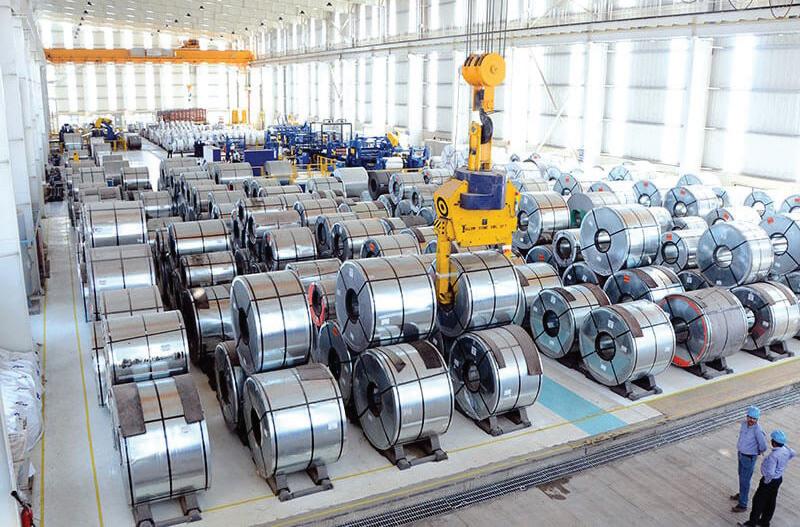
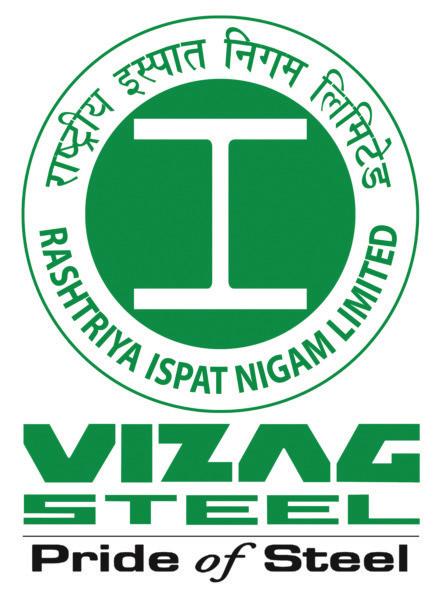
Tata Steel, JSW Steel, and Adani Group have expressed “strong interest” in the entity during pre-bid consultations held in early December, according to news reports.
Apparently, deciding about the transaction structure around 22,000 acres of land of RINL is a major point of attraction for the interested bidders for the said divestment.
Vizag Steel, the Andhra Pradesh-based steel producer, would finalize the valuation by December-end.
Rashtriya Ispat Nigam is likely to finalize its valuation by the December-end this year. Government’s shareholding in RINL has received a principal approval in January 2021 from the Cabinet Committee on Economic Affairs, sale of 100 percent strategic disinvestment.
RINL is among the leading top six steel producers with an annual supply of about 7.5 million tonnes of structural steel.
JSW Steel Modifies its FY23 CapEx Plan to INR 15,000 cr
Earlier, the CapEx plan of JSW Steel was INR 20k crore, which has now been modified to INR 15k crore.
December 1, 2022
JSW Steel Ltd., an Indian steel manufacturer and a flagship company of the JSW Group, has modified its CapEx plans for the current fiscal to INR 15,000 crore. Earlier, the initially planned investment was to the tune of INR 20,000 crore – as per a news report. The modified plan ensued as a result of the weakening global commodity cycle, impact on cash flows because of steep correction in steel prices at the international level and fears of a global economic slowdown.
According to Mr. Seshagiri Rao, Joint MD, and Group CFO, JSW Steel, the planned CapEx for FY23 was INR 20,000 crore. Of the earmarked INR 15,000 crore of investment, about INR 7,000 crore has already been spent in the first six months, and the remaining is scheduled for H2 of the fiscal.
In addition, the proposed capacity expansion plan –addition of 10 million tonne per annum (MTPA) over the
next three years – at an estimated outlay of INR 48,000 crore is underway. The Mumbai-based manufacturer will undertake and complete the said expansion according to the schedule.
Meanwhile, JSW’s Brownfield investment in a coke oven plant of 1.5 MTPA at the Vijayanagar plant was commissioned in Q2 but the project will be completed by FY24.
74 | NEWS TUBE & PIPE INDIA • DEC - JAN 2023 www.tubepipeindia.com
December 13, 2022
Image Source: JSW Steel
Vedanta Retreating from Steel Business, Plans To Sell Electrosteel
In 2018, Vedanta beat Tata Steel to take over Electrosteel at INR 5,320 crore.
According to the report, Vedanta has approached a number of steel majors in addition to some investors as well, in this regard. One of the reasons why Vedanta is planning to retreat from its steel business is because the firm reportedly wishes to deleverage its balance sheet, which had a debt of USD 11.7 billion at the end of March.
The report further adds that in the summer of 2018, Vedanta beat Tata Steel to take over ESL for a sum of INR 5,320 crore. Initially, Electrosteel was a subsidiary of
Electrosteel Castings, upon acquisition, Vedanta delisted the company.
At the time of the said acquisition, Vedanta also asserted that this acquisition is expected to help its iron ore business as the vertical integration of steel manufacturing capability has the potential for great efficiency.
Rama Steel Tubes Reports Revenue Growth of 79 Percent in Q2 FY23
Rama Steel Tubes has shared the total sales volume in Q2 FY23 was 48,774.67 MT while it was 26,668.58 MT in the corresponding period of the previous fiscal.
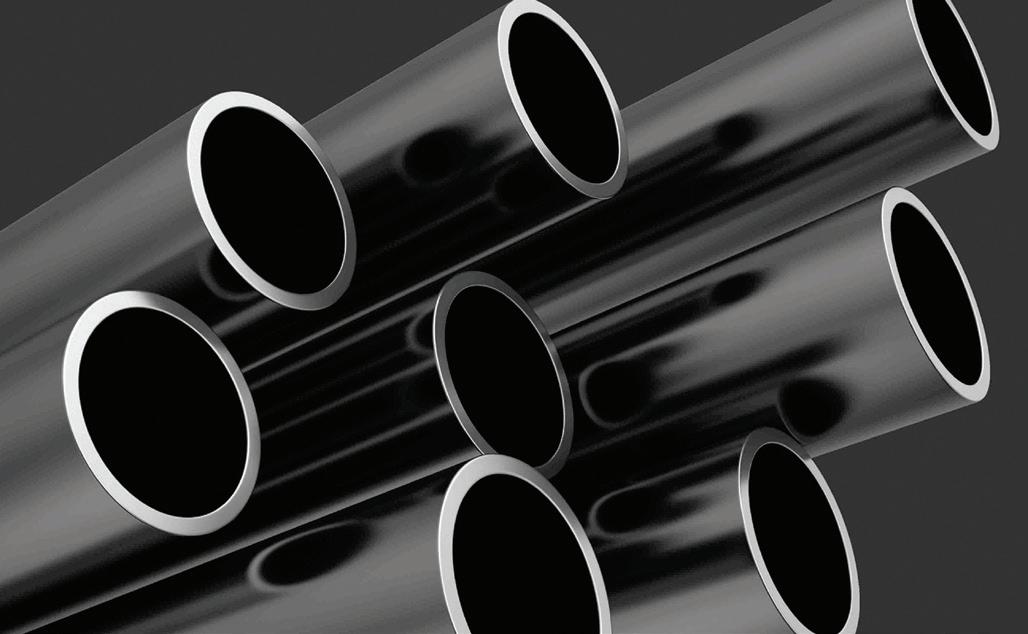
November 21, 2022
Rama Steel Tubes Ltd. (RSTL) has shared its financial performance overview of Q2 FY23, i.e. for the JulySeptember, 2022 quarter. In Q2FY23, the total revenue stood at INR 3500.79 mn for Q2 FY23 showing robust growth of 78.64 percent as against INR 1959.66 mn in Q2FY22. Meanwhile, the total sales volume was 48,774.67 MT for Q2 FY23 showing an impressive growth of 82.89 percent as compared to 26,668.58 MT in Q2FY22.

Additionally, the total revenue was INR 5937.01 mn for H1 FY23 showing robust growth of 75.37 percent as against INR 3385.44 mn in H1 FY22. The total sales volume of 78,608.63 MT for H1 FY23 showed an impressive growth of 68.33 percent as against 46,698.18 MT in H1FY22. RSTL has initiated a massive capacity expansion of additional 30,000 MT at the Khopoli Plant, Maharashtra. The expansion is expected to be completed by the end
of the 2nd quarter of FY23 and commercial production is expected to begin in 3rd quarter of FY23.
Further, Rama Steel Tubes Industries Ltd. (a step-down subsidiary of RSTL) has also commenced the setting up of a new facility in Nigeria, South Africa having an installed capacity of 20,000 MT. The total capital investment for this expansion will be INR 200 mn and will be funded through internal accruals. The new facility is expected to be fully functional in 3rd quarter of FY23.
NEWS | 75 www.tubepipeindia.com TUBE & PIPE INDIA • DEC - JAN 2023
Image Source: Rama Steel Tubes
Image Source: Vedanta
Vedanta Group has planned to exit the steel business. This move comes almost four years after the group decided to make big in the segment. As per a news report, Vedanta is planning to sell Electrosteel and focus just on its core businesses, which are mining and industrial.
December 2, 2022
Tata Steel Publishes Environmental Product Declaration for Tata Structura
Tata Structura is the first brand in structural steel hollow sections in India to publish EPD and it is the second EPD from Tata Steel.
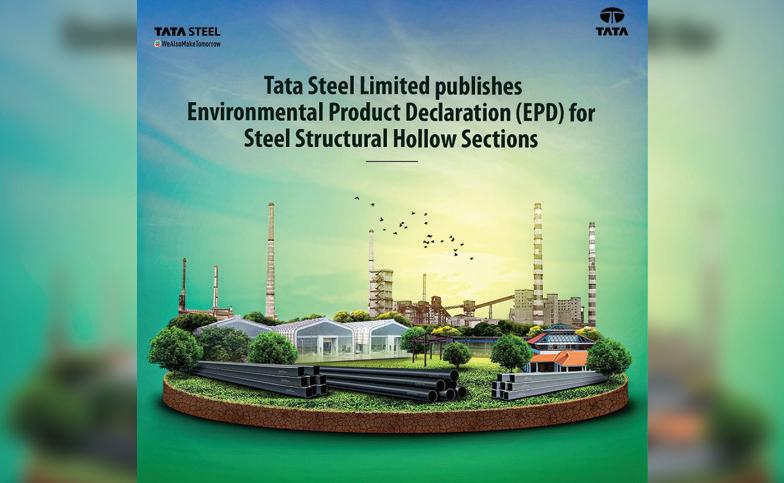
Tata Steel Ltd. has published an Environmental Product Declaration (EPD) for Steel Structural Hollow Sections sold under the brand name Tata Structura. This move is part of the firm’s commitment to be a benchmark in sustainability disclosures and to serve its customers with product-specific sustainability information.
EPDs are Type III eco-labels that transparently declare the product’s environmental impact over its life cycle across various indicators. It is a comprehensive, thirdparty reviewed report that acts as a verified document in communicating a product’s life cycle environmental impact for disclosure purposes. Being widely used in the green building and construction materials industry, the document accounts for scoring the required credit points in the green building assessment system. It can also be used in prioritising products based on green public procurement policies.
The Life Cycle Assessment (LCA) study carried out for developing the EPD for steel products is done as per ISO 14040 and ISO 14044 standards. LCA allows companies to evaluate their product’s environmental performance over its entire life cycle. It typically takes into account the full value chain, from material extraction to manufactured product, its usage stage, and end-of-life impacts. The EPD is published in the International EPD System.
Mr. Sanjiv Paul, Vice President (Safety, Health and Sustainability), Tata Steel, said, “EPDs are an important validation tool, both for manufacturers to provide transparent data about environmental sustainability of its products and for the more conscientious customers to make informed purchasing decisions.”
In the words of Mr. Sanjay S Sahni, Executive In Charge (Tubes Division), Tata Steel, “In Tata Steel Tubes Division, our endeavor has always been to achieve global benchmark for sustainability, for our products and
Tata Steel has received GreenPro certification for many of its products including Tata Structura, Tata Tiscon, and so on.
processes. EPD for Tata Structura will help our valued customers to choose right material for their projects and achieve global standards of sustainable construction. We are happy to share that now Tata Structura is the first Structural Steel Hollow Section brand in the country which has published EPD (Environmental Product Declaration) for supporting our stakeholders with product specific sustainability information.”
This is the second EPD from Tata Steel Ltd. after the publication of Steel Rebars EPD. Tata Steel will focus on securing eco-labels (GreenPro and EPD) for its key products and on maximising the coverage of its products across various sites under LCA to support the customers with product-related sustainability disclosures enabling designers and customers to understand better a product’s environmental impact.
Tata Steel has already received GreenPro certification for many of its products including Steel Structural Hollow Sections (Tata Structura), Tata Tiscon (Steel Rebars), Tata Pravesh, Tata Ezyfit, and Ground Granulated Blast Furnace Slag.
GreenPro-certified products are recognised in the Indian Green Building Council (IGBC) rating system as well as by various government institutions (Chennai Metro, Delhi Metro, etc.). In Europe, the Company has produced over 50 Environmental Product Declarations (EPDs) for its construction sector customers – a milestone in environmental impact transparency and reporting.
76 | NEWS TUBE & PIPE INDIA • DEC - JAN 2023 www.tubepipeindia.com
October 30, 2022 Never miss any news on the Tube & Pipe Industry. SUBSCRIBE TODAY www.tubepipeindia.com
Steel Pipe Makers: Huge Stock Gainers as Govt. Encourages Infra Projects
The steel pipe manufacturers are all set to be greatly benefitted from the CAPEX investments by the central and state governments in the sectors such as oil & gas, petrochemicals, and so on.
The steel pipe industry is amongst the top gainers in the stock market as there is huge demand generated by numerous sectors, including oil & gas, petrochemicals, chemicals, construction, infrastructure, and so on.
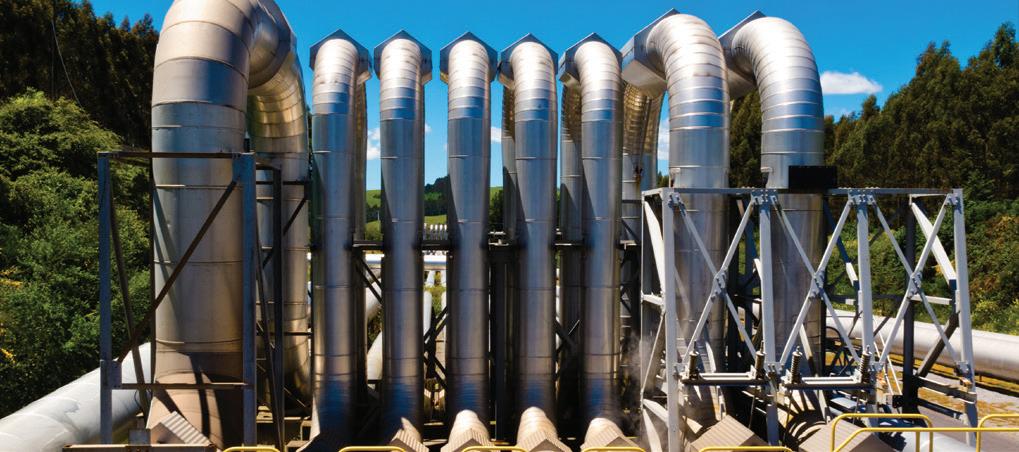
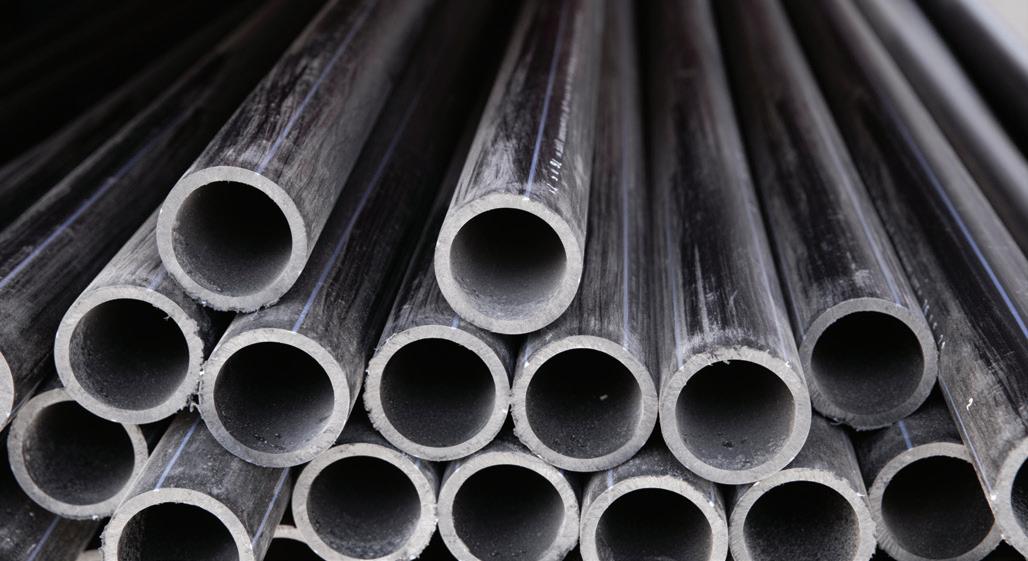
APL Apollo Tubes Ltd., Maharashtra Seamless Ltd. (MSL), and Venus Pipes & Tubes – the top players in the steel tube and pipe sector – are also among the top stock gainers – as published in media reports.
Notably, the stock demand is majorly driven by strong order books of the steel pipe makers. Since both the central and the state governments have been encouraging water infrastructure projects, the demand for steel pipes is likely to continue being buoyant. Moreover, as India is transitioning from being importdependent to being self-reliant with regard to oil production, investments in new oil exploration blocks are
expected. This will also be a strong demand driver in the steel pipe segment.
At MSL, the order book position has been breaching alltime highs for the past four quarters. The management team is foreseeing a good demand outlook in the export segment in FY23 as enquiries in this segment has crossed 15,000 MT per month.
APL Apollo registered the highest quarterly sales volume of 6.02 lakh tonnes in Q2FY23, i.e. surged by 41 percent on a yearly basis. The sales volume for the first half of FY23 was 10.25 lakh tonnes as compared to 8 lakh tonnes in the same period last year.
GAIL and GSPL Poised to Reap Benefit from New Gas Pipeline Tariff Rules
The new notification by Petroleum and Natural Gas Regulatory Board (PNGRB) regarding rules on natural gas pipeline tariff, which became effective from November 18, will bring several positive amendments for the natural gas transmission sector, as per media reports. The pipeline operators - GAIL Ltd. and Gujarat State Petronet Ltd. (GSPL) are poised to benefit from the amended regulations.
These regulations will be implemented both for gas pipeline tariffs as well as pipeline authorizations, according to the outlook expressed by analysts. These rules were initially proposed in August this year. As per the new tariff rules, there is a discontinuation of the proposal to share 50 percent of the proposed
Gas Pipelines
incremental tariff revenue. This will be a positive change for the pipeline operators – GAIL and GSPL as it will allow them to pursue Brownfield capacity expansions. Also, the gas transmission losses will now be considered while there was no such provision earlier. A gradual annual increase in tariff would be permissible.
The changed regulations augur well for pipeline tariffs and should incentivize CAPEX, analysts said. Broking house Emkay says that the pipeline entities are largely satisfied with the amendments, as it paves the way for future expansion.
DEMAND DRIVERS | 77 www.tubepipeindia.com TUBE & PIPE INDIA • DEC - JAN 2023
Representative Image: Steel Pipes
October 19, 2022
Due to the amendment in tariff regulations, GAIL and GSPL will be enabled to implement a gradual escalation in tariffs on an annual basis.
December 1, 2022
PM Dedicates ONGC U-field Onshore Facilities of Deep Water Block to Nation
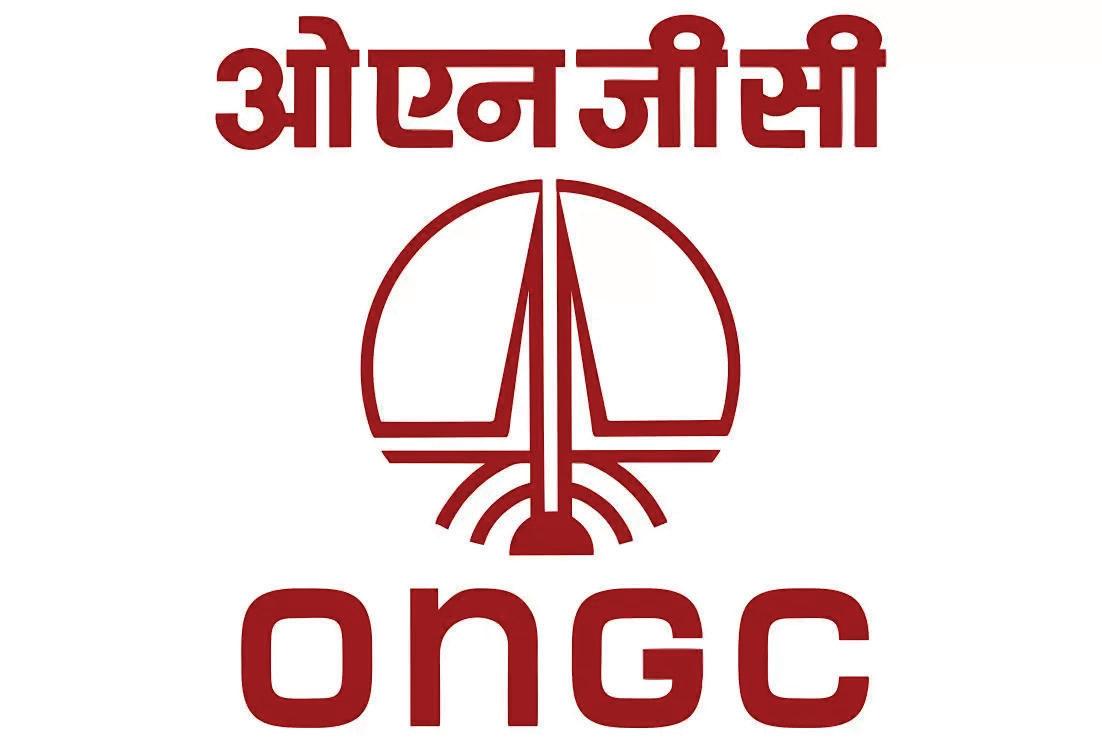
The U-Field is part of ONGC’s flagship deep-water KG-DWN-98/2 Cluster-II development project. U-Field is the deepest Gas discovery of the project, with a gas production potential of about 3 million Standard cubic metre of gas per day.
Prime Minister Narendra Modi has dedicated Oil and Natural Gas Corporation Ltd’s (ONGC) U-field Onshore facilities of KG-DWN-98/2 Deep Water Block, situated in Odalarevu, Dr. B R Ambedkar Konaseema district of Andhra Pradesh to the whole nation. Additionally, the dedication/inauguration/foundation-stone-laying of various other development projects worth over INR 10,700 crores in Visakhapatnam, Andhra Pradesh, were also dedicated to the country.
The event took place in the presence of the Hon’ble Governor of Andhra Pradesh Shri Biswa Bhusan Harichandan, Andhra Pradesh Chief Minister Y. S. Jagan Mohan Reddy, and Union Minister for Railways, Communication, Electronics, and Information Technology, Ashwini Vaishnaw. ONGC CMD Mr. Rajesh Kumar Srivastava and Director (Offshore) Mr. Pankaj Kumar were also present on the occasion.
The Prime Minister stated that these projects will take India’s development to the next level and are aligned
U-Field is the deepest gas discovery of the project.
with the government’s vision of inclusive growth. He also asserted that the PM GatiShakti National Master Plan has accelerated the pace of projects, with policies and decisions aimed at improving the quality of life for the countrymen.
The U-Field is part of ONGC’s flagship deep-water KGDWN-98/2 Cluster-II development project in the prolific Krishna Godavari Basin. U-Field is the deepest Gas discovery of the project, with a gas production potential of about 3 million standard cubic metres of gas per day. The first well of U field, i.e., U-3-B is one of the fastest deep-water well monetized globally in a record time of 11 months. The gas from these wells is evacuated through the subsea facilities connected to an Onshore Terminal at Odalarevu situated in Dr. B R Ambedkar Konaseema district of Andhra Pradesh.
Africa: Longest Oil Pipeline Being Constructed in Niger
Having a length of about 2,000 km – out of which 1,250 km comes in Niger itself –the oil pipeline will connect oil wells in the eastern region of Agadem.
The longest oil pipeline in Africa is being constructed at Gaya, which is located in southwest Niger, near the border with Benin, in West Africa.
Having a projected length of nearly 2,000 km (that is, 1,240 miles) – including 1,250 km in Niger itself – the pipeline will connect oil wells in the eastern region of Agadem.
Started in 2019, the oil pipeline project was projected to be completed in 2022, but the COVID-19 pandemic slowed it down, said Nafiou Issaka, deputy general
Oil Pipelines
manager of the West African Oil Pipeline Company (WAPCO).
More than 600 km of pipeline has already been laid, and Niger is on track to sell crude on the international market from next July, according to the ministry of petroleum and energy.
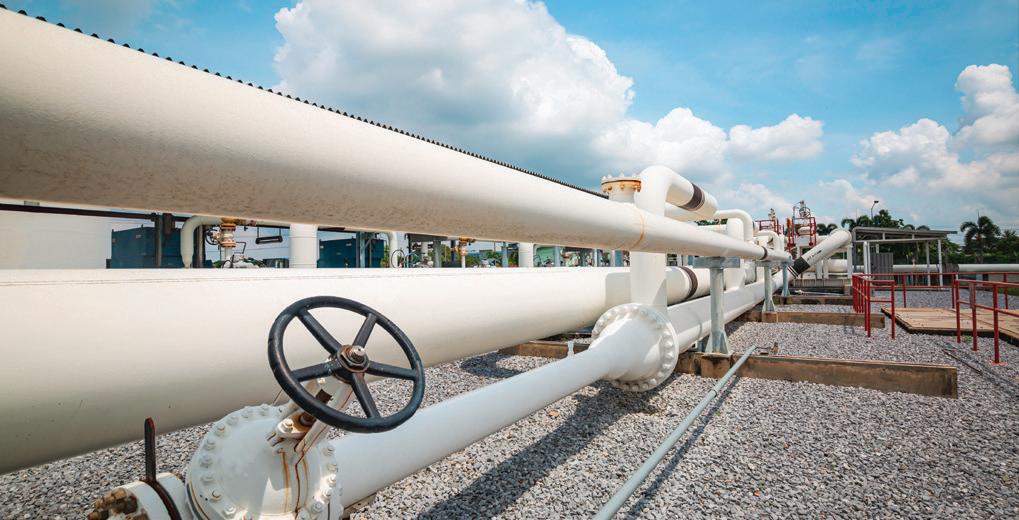
78 | DEMAND DRIVERS TUBE & PIPE INDIA • DEC - JAN 2023 www.tubepipeindia.com
November 14, 2022
November 2, 2022
TCR Engineering Services Bags Projects in Defence and Gas Pipeline
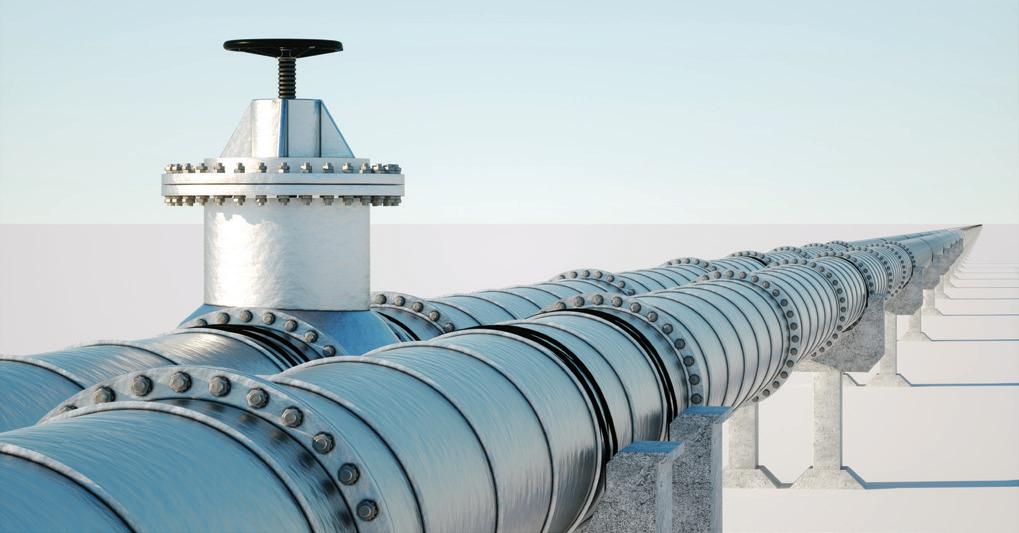
The defence orders include microstructure analysis for HAL, testing of forged and rolled complex concentrated alloys, high-strength naval grade steel, and their weld joints as per DRDO NMRL.
TCR Engineering Services has won multiple new projects in the defence and gas pipeline sector – as published in media reports. The defence orders are for Hindustan Aeronautics Ltd. and DRDO NMRL while the gas pipeline orders are for North East Gas Grid, as informed by Mr. Rohit Bafna, Global President, TCR Engineering.
Presently, TCR Engineering is already executing gas infrastructure pipeline projects across 84 sites in the country, he said, adding that they have won several new projects in defence and gas pipeline space.
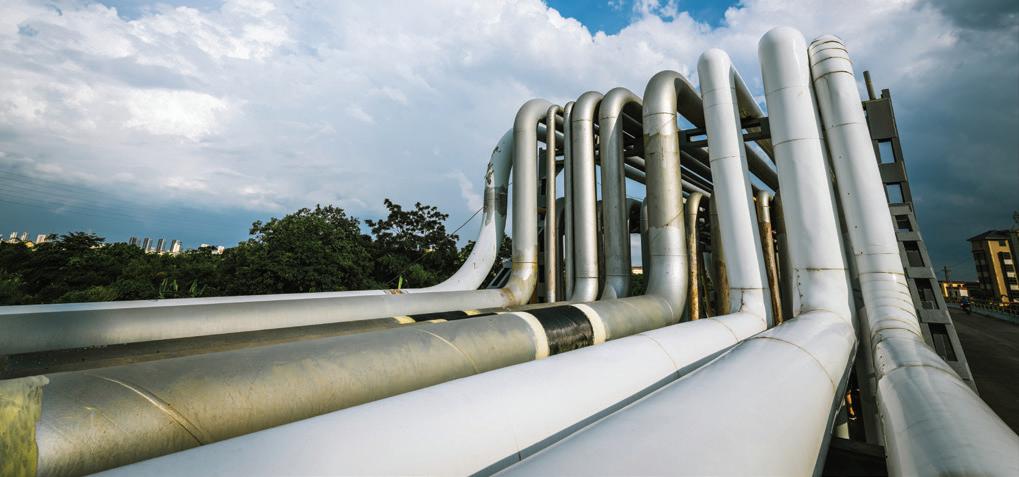
“The defence orders include microstructure analysis of SB 115 aircraft structure for HAL (Hindustan Aeronautics Limited), testing of forged and rolled complex concentrated alloys, high strength naval grade steel, and their weld joints as per DRDO Naval Materials Research Lab (NMRL)..." Mr. Bafna told PTI.
Gas Pipelines
TCR has also received orders for Non-Destructive Testing (NDT) including radiography inspection of weld joints in the North-East gas grid. The 1,656-km North-East Natural Gas Pipeline Grid will link Guwahati in Assam to major cities in the region such as Itanagar, Dimapur, Kohima, Imphal, Aizawl, Agartala, Shillong, Silchar, Gangtok, and Numaligarh.
Additionally, the engineering services provider has been currently involved in welding inspection activity on the city gas distribution network in Bijnor and Nainital districts. TCR is also working on a project at the Purba Bharati Gas (PBGPL) distribution in the Kamrup district of Assam.
Maharashtra-based TCR Engineering is engaged in the quality assurance of materials and testing industrial assets used in various projects related to sectors.
China’s Longest Coal Bed Methane Pipeline Commences Trial Operation
The gas pipeline will strengthen the gas supply capacity of the Shanxi and Shaanxi provinces. The pipeline will have a designed gas transmission capacity of 5 billion cubic meters per annum.
The Shenmu-Anping pipeline, China’s longest coal bed methane pipeline, has begun its trial operation, as informed by China National Offshore Oil Corporation (CNOOC Group). The CNOOC Group is China’s largest offshore driller.
The gas pipeline will strengthen the gas supply capacity of the Shanxi and Shaanxi provinces. It will also further ensure the natural gas supply in the Beijing-Tianjin-Hebei region, the CNOOC Group said.
The pipeline starts from Shenmu, Yulin city of Shanxi province and ends at Anping county, Hengshui city of Hebei province. The total length of the pipeline is
approximately 623 km, with a designed gas transmission capacity of 5 billion cubic meters per annum, it said. CNOOC informed that the gas pipeline will effectively release the production capacity of upstream projects, help to maximize the resource value of the two unconventional natural gas production bases in the Qinshui Basin and the eastern edge of the Erdos Basin and strongly support the natural gas supply in North China.
DEMAND DRIVERS | 79 www.tubepipeindia.com TUBE & PIPE INDIA • DEC - JAN 2023
November 20, 2022
Image Source: Freepik
December 5, 2022

80 | TECH UPDATE BENTELER Steel/Tube Brings Tubes of Free-Cutting www.tubepipeindia.com STAY AHEAD OF OTHERS BY STAYING UPDATED
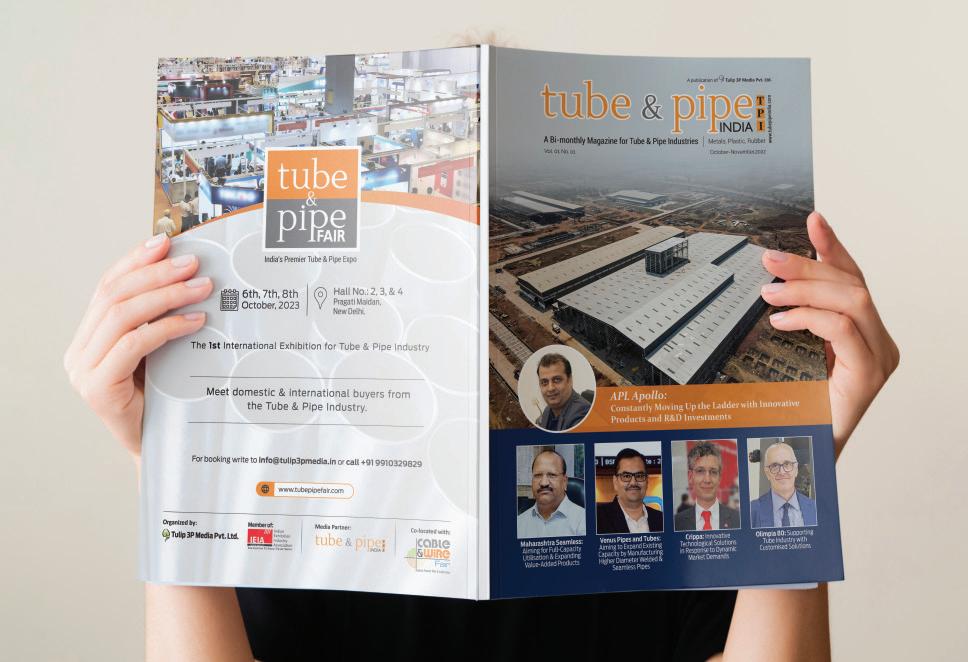
* Due to COVID-19 event status could change. Please check with the organizers before visiting.
SteelFab
9-12 January 2023 Sharjah, UAE www.steelfabme.com
Made in Steel
9-11 May 2023 Milan, Italy www.madeinsteel.it
Lamiera 10-13 May 2023 Milan, Italy www.lamiera.net
FABTECH Mexico 16-18 May 2023 Mexico City, Mexico www.mexico.fabtechexpo.com
Tube & Steel İstanbul 2023 24-27 May 2023 Samsun, Turkey www.tubeandsteelistanbulfair.com
Tube & Pipe Fair 6-8 October 2023 Pragati Maidan, New Delhi www.tubepipefair.com
Korea Metal Week 18-20 October 2023 KINTEX, South Korea www.korea-metal.com
Tube Dusseldorf 2024
15-19 April 2024 Dusseldorf, Germany www.tube-tradefair.com
EuroBLECH 2024 22-25 October 2024 Hanover, Germany www.euroblech.com
Vol.: 01 / No.: 02
December-January, 2023
Editor & Publisher Priyank Jain – pj@tulip3pmedia.in
Deputy Editor
Geetika Jain – gjain@tulip3pmedia.in
Associate Editor Anurima Mondal – desk@tulip3pmedia.in
Sub Editor Soumya Ojha – desk3@tulip3pmedia.in
Graphic Designer
Ravi Thakur – ravithakur@tulip3pmedia.in
Manik Seth – design@tulip3pmedia.in
Advertising & Marketing
Tube & Pipe:
Gaurav Chawla – mktg4@tulip3pmedia.in
Group: Puneet Dua
Akansha Tiwari
Support Team Kushagra Mehrotra Sandeep Kumar Rahul Kumar admin@tulip3pmedia.in
Editorial & Publisher's Office : Tube & Pipe India, Tulip 3P Media Pvt. Ltd. L-15/6, DLF-2, Gurugram,
Priya Thapar Haryana-122002
Correspondence Address: Tulip 3P Media Pvt. Ltd. 501-502, ABW Tower, MG Road, IFFCO Chowk, Gurugram, Haryana-122002, INDIA Tel.: +91-99999 35011 / +91-9910329829, E-mail : info@tulip3pmedia.in
Owned, Published & Printed By : Priyank Jain, L-15/6, DLF-2, Gurugram, Haryana-122002
Printed at: Royal Offset, 489, Patparganj Industrial Area, Delhi-110092
All disputes regarding this magazine will be settled in Delhi (India)JurisdictionOnly.
The views expressed in the columns of the magazine are not necessarily those of the editor or the publisher & they accept noresponsibilityforthem.
CAUTION: No part of this magazine including advertisements designs, prepared by us or through us should becopied, reproducedortransmitted byanyonewithoutprior writtenpermissionof thepublisher.
Group Editor & Chairman Parveen Kumar Jain – pkj@tulip3pmedia.in www.tubepipeindia.com tubepipeindia.com/emagazine
Event Calendar
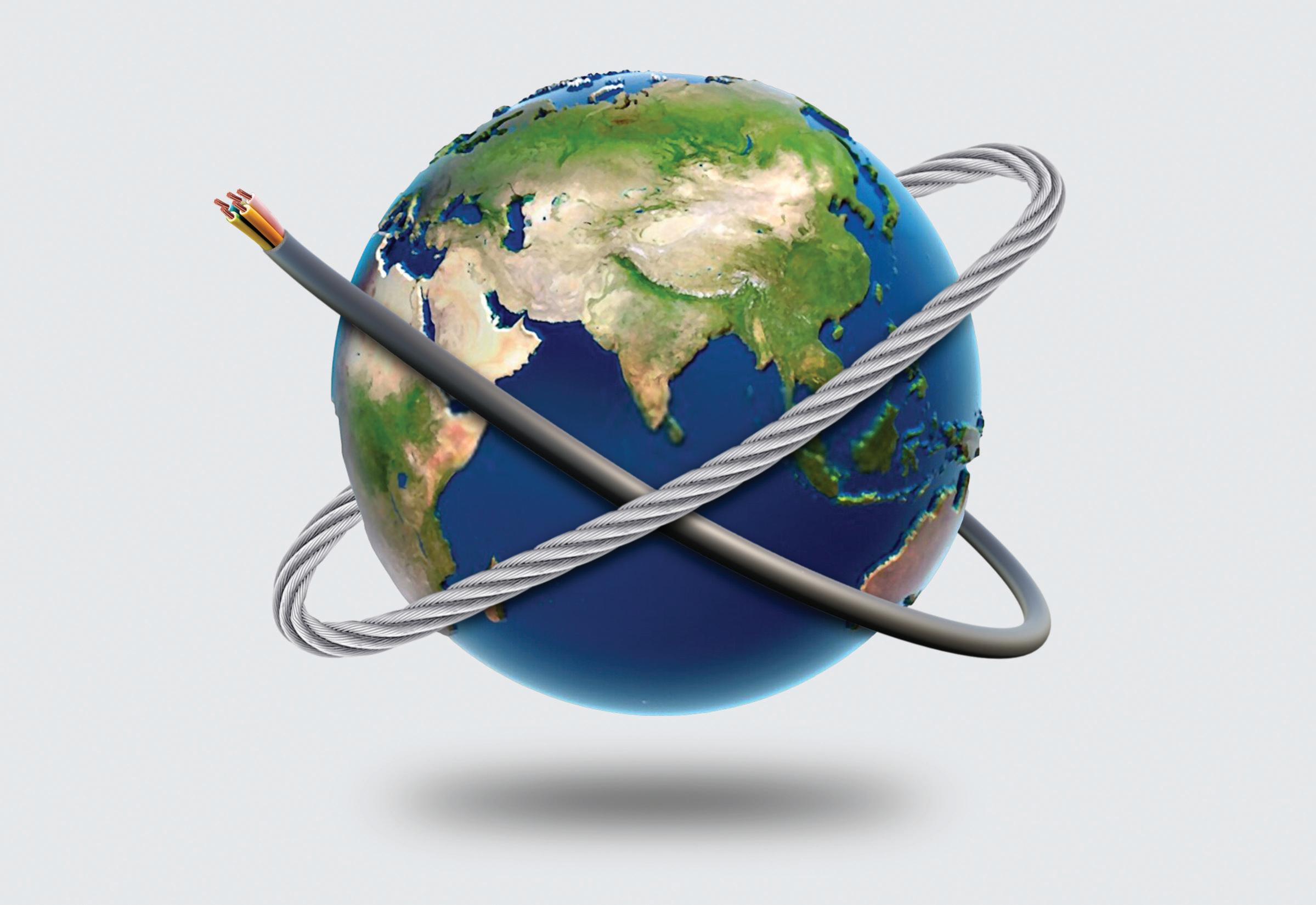
2023 6th, 7th, 8th October, 2023 Hall: 2, 3, & 4 Pragati Maidan, New Delhi. For booking write to info@wirecable.in or call +91 99999 350 11/22/44 www.cablewirefair.com The 5th International Exhibition & Conference for Wire & Cable Industry Organized by: Member of: India’s Premier Tube & Pipe Expo FAIR Media Partner:Co-located Show
